






Hosted by Puglia Sounds, a programme by Puglia Culture in Bari, Italy
25 - 28 September 2025
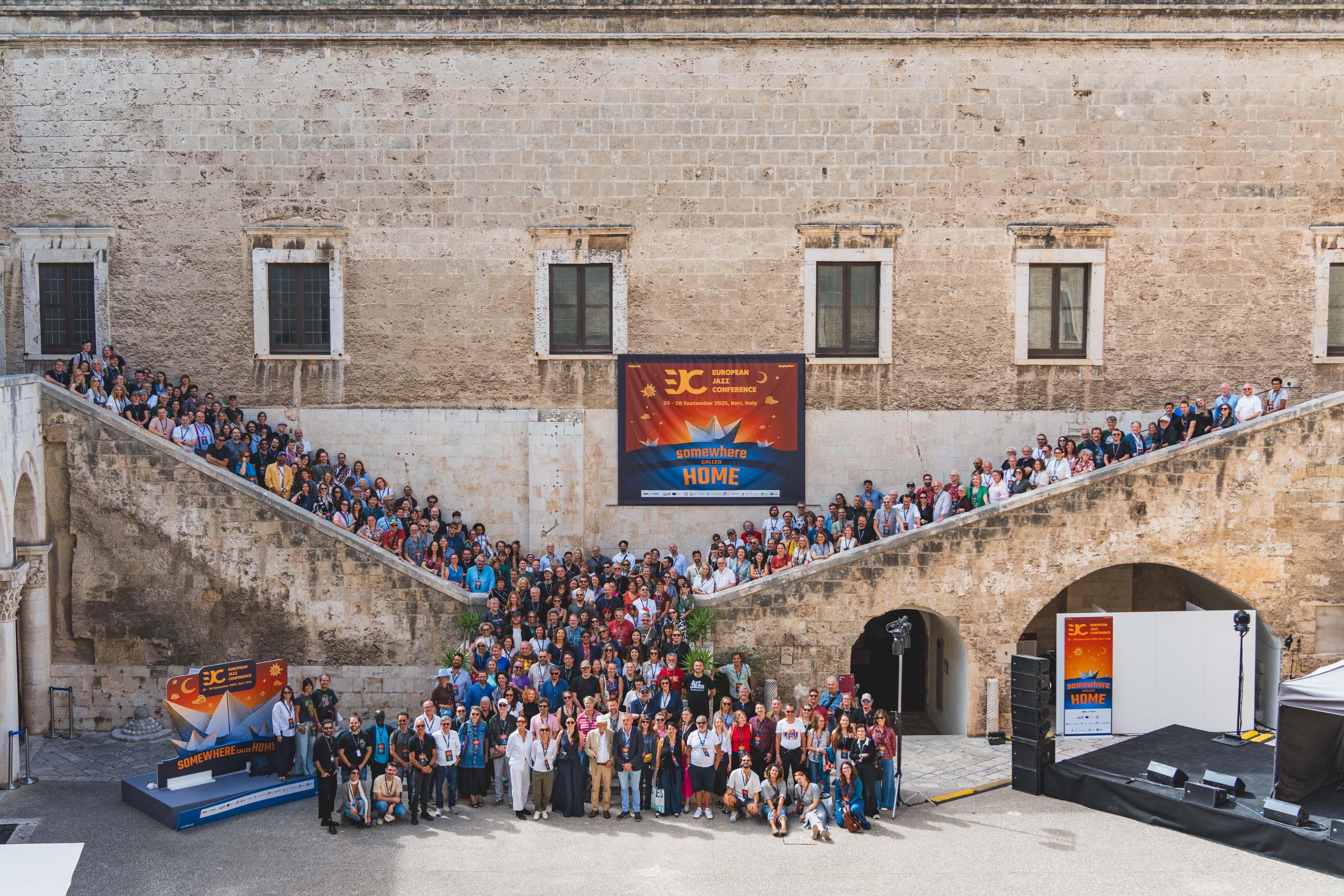
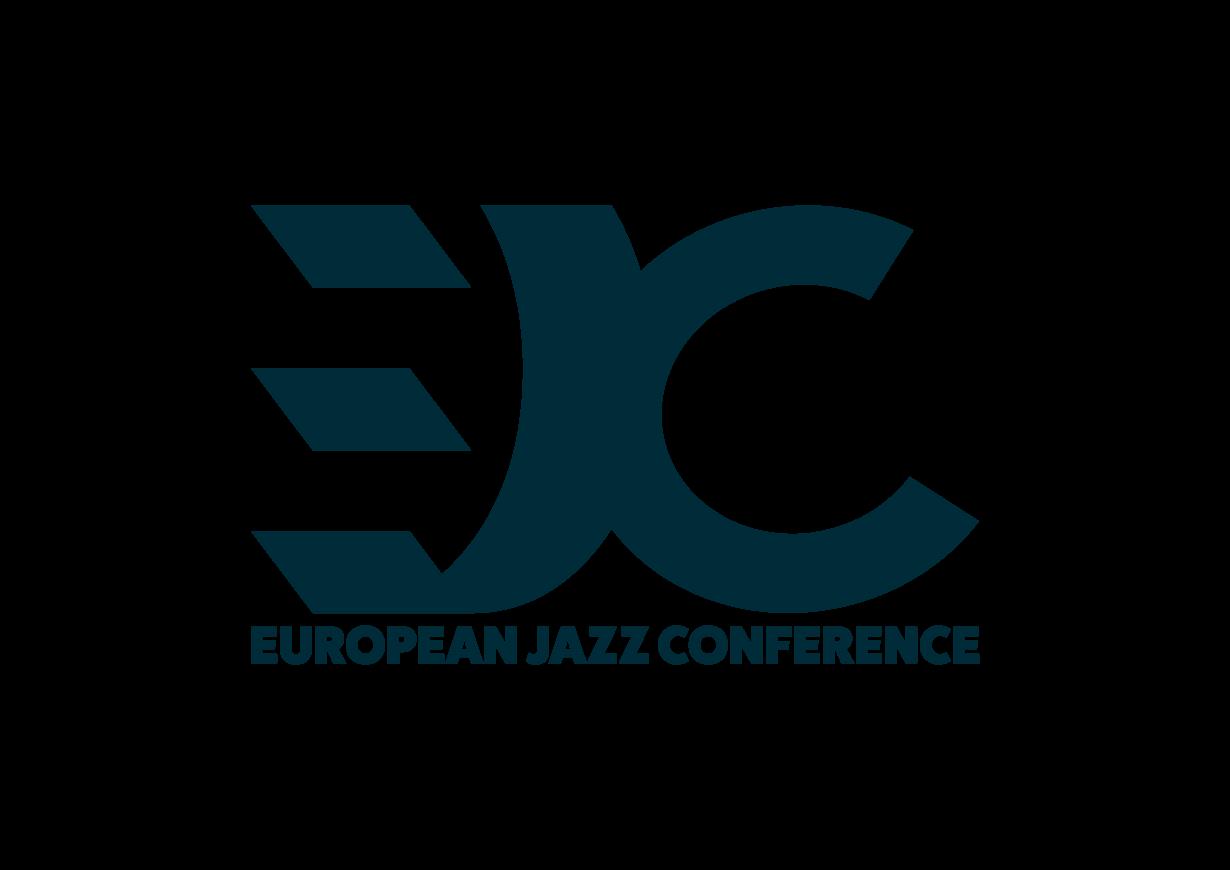
The historic city of Bari on the Adriatic Coast in southern Italy played host to the European Jazz Conference (EJC) 2025. The 11th edition of Europe Jazz Network (EJN)’s annual conference saw 400 attendees from 40 countries make the pilgrimage to the capital of Puglia.
For four days, festival directors, club and venue owners, representatives from national jazz organisations, booking agents, musicians and journalists broke bread together and discussed issues pertinent to the promotion of jazz, creative and improvised music.
This year’s conference was co-organised by EJN member Puglia Sounds, a project aimed specifically at supporting musicians and related professionals from the Puglia region. As Maddalena Ciocca (IT) related at the EJC 2024 in Ghent, Belgium, when officially announcing Bari as the host city of the EJC 2025, Puglia is the first Italian region to recognise music as an important economic sector—one that stimulates tourism and creates jobs.
The umbrella theme of the EJC 2025 was “Somewhere Called Home,” an acknowledgment of the basic human need for identity, belonging and stability. Within this thematic structure the conference highlighted the positive contribution of migrants, a particularly salient recognition given the global movements of people due to wars, political and religious persecution, climate change and economic hardship. The central theme was reflected in the keynote speech, the plenary debate and in some of the panel discussions.
Time and time again, over the sunny weekend in Bari, the EJC demonstrated that jazz and creative music are a unifying force, bringing together people from different countries, cultures and languages and creating a lot more harmony than disharmony.
Bari was a tremendous host. Established in 450 AD, this port city’s rich history is written large in its architecture, its monuments and piazzas.
Several iconic locations staged the concerts of the EJC’s showcase and fringe programmes; the Medieval church Auditorium Diocesano Vallisa in the heart of the old quarter; the Art Nouveau theatre Kursaal Santalucia, a cobblestone’s throw from the sea front; and the mid-19th century Piccinni Theatre—excellent venues of pronounced character.
This was the second EJC in Italy in seven years, following the 2019 EJC in Novara. For some, it also marked a return to Bari, thirteen years after the EJN’s General Assembly there in 2012. Indeed, the 2025 European Jazz Conference has been a very successful event, that will stay for a long time in the memory of all its participants.
EJN’s General Manager Giambattista Tofoni (IT) officially opened the EJC 2025 by welcoming the attendees to Bari and to the Teatro Piccinni. He acknowledged the role played by Puglia Culture (IT) and the professionalism of its team. Giambattista invited to the stage the Europe Jazz Network President, Karolina Juzwa (PL), the President of Puglia Culture, Paolo Ponzio, and the Director of the Department of Culture and Tourism of the Puglia Region, Aldo Patruno, representing the President of the Puglia Region, Michele Emilliano.
Aldo welcomed the conference delegates to Puglia and underlined the importance of music and culture in cementing international relations. He recognised the good work of Puglia Culture in promoting the region’s music and all the professionals working in this field.
Puglia, Aldo said, is a welcoming region with a history of receiving and accommodating migrants, “especially those in need.” This is in keeping with the conference title “Somewhere Called Home.” He related how he had read the transcript of keynote speaker Nabil Bey Salameh, whom he thanked, adding that he fully endorsed his every word. He spared a special thought for the international flotilla bound for Gaza that was attempting “to reach out to those who need everything.”
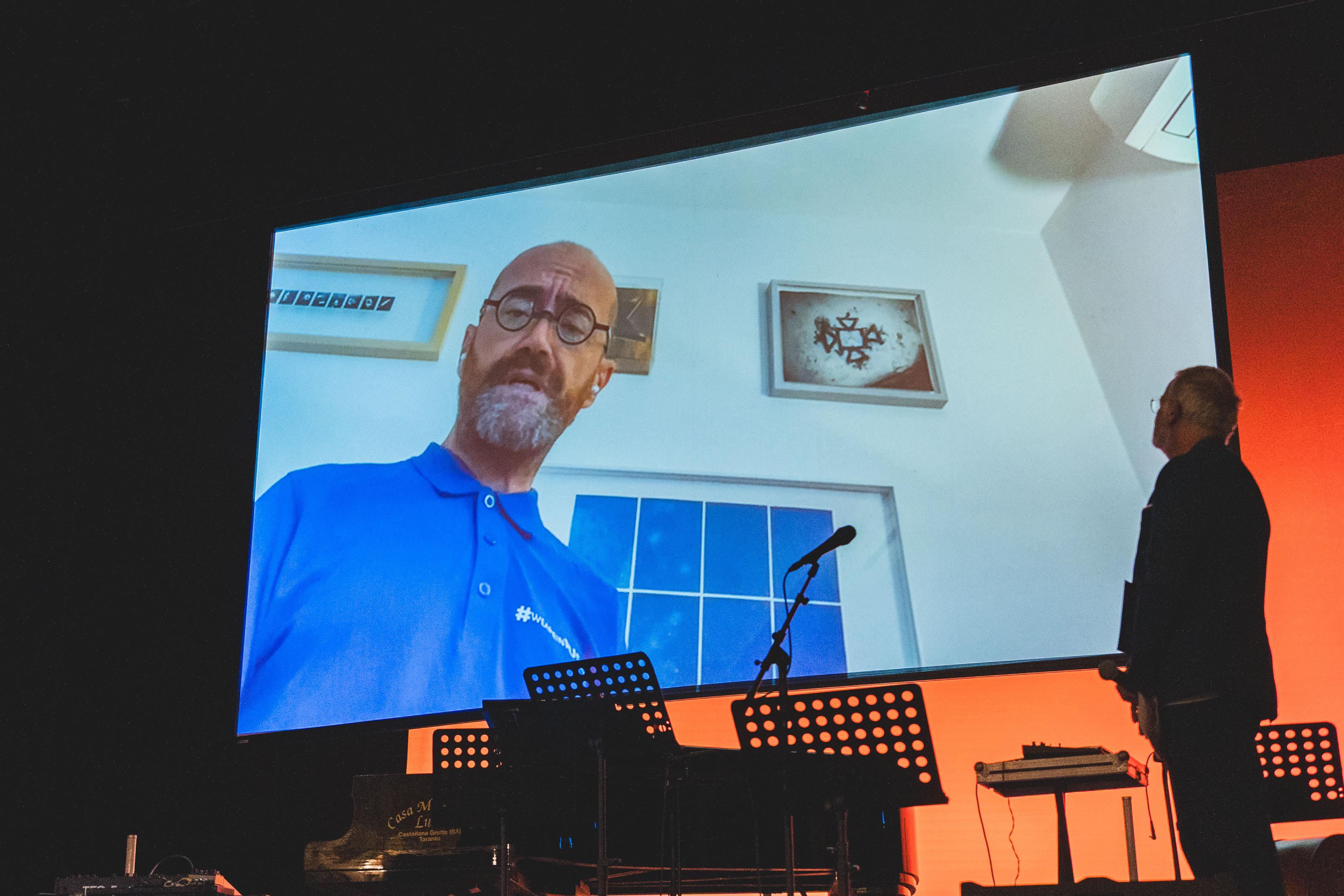
Aldo highlighted that the aims of the EJC fit perfectly into the framework of actions outlined by “Check-in Culture 2030”, the new strategy of the Puglia Region for the advancement of cultural and heritage activities. This initiative, worth in the region of 400 million Euros for the five-year period 2025-2030, aims to strengthen Puglia’s cultural ecosystem and to project it internationally— placing human beings first and centre.
Aldo thanked the EJN for choosing Bari to host its 2025 conference. He wished everyone good work and invited them to enjoy the great natural and cultural treasures that Bari and Puglia have to offer. In closing he said: “And remember, be happy! We are in Puglia!”
The mic then passed to Paolo Ponzio who related Bari’s historical position as a crossroads, an international hub for different languages, cultures and music. He described the city as “a natural laboratory for cross-fertilisation and innovation”. Paolo thanked the entire Puglia Culture staff for their indispensable role in bringing the EJC to fruition. In recent years, he added, Puglia Culture has redefined the role of culture as “a driver of regional development and of social cohesion.”
Through the Puglia Sounds project, Puglia Culture has supported the growth of the regional music scene by supporting local talent, investing in the means of music production, and by furthering
international collaboration. The bid by Bari to host the EJC, Paolo said, was the result of a longterm strategy that recognises culture as a catalyst for “openness, dialogue and innovation.”
Puglia Sounds has been a proud member of the EJN since 2012, Paolo noted, adding that the conference would provide a prestigious platform to showcase music from the region.
Beyond the music on show, Paolo highlighted the importance of the conference’s engagement with contemporary challenges, its aim to recognise the positive contributions of migrants to our societies and the universal need for a sense of belonging. Paolo underlined that Bari’s long history of welcoming migrants—and its artistic vitality— perfectly embodies this vision.
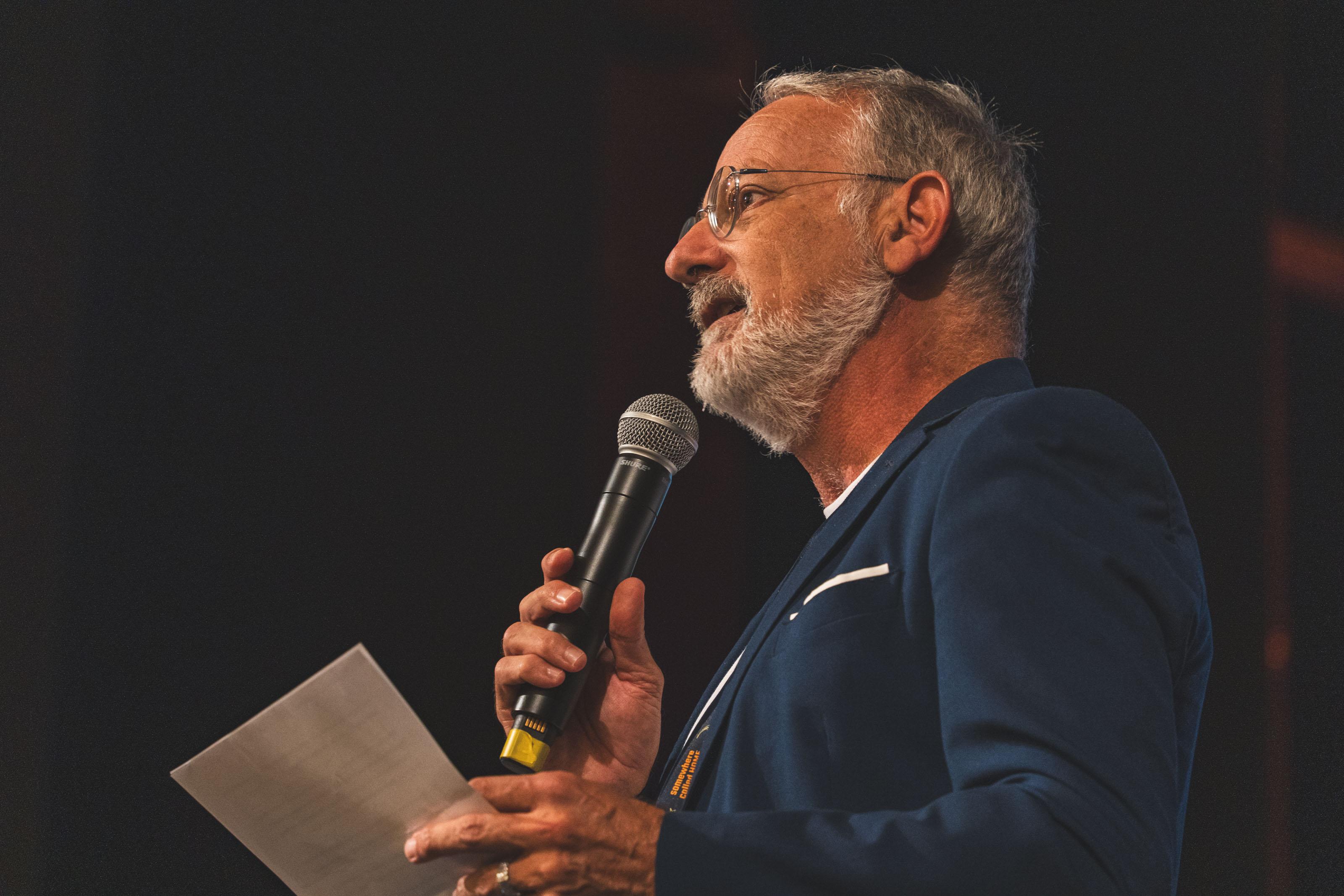
The choice of Bari, and the involvement of Puglia Cultural was not just a celebration of the local scene, Paolo said, but also a model of cultural governance that enhances the network of communities and collaboration between organisations internationally.
In a time of change and political polarisation, the EJC is a laboratory of ideas and practices where music becomes a tool for dialogue, citizenship and a shared future.
Donning his philosopher’s hat, Paolo noted how jazz has long stimulated philosophical reflection on ideas of freedom, identity, community and creativity. He cited the thoughts of philosopher Gilles Deleuze in his work Mille Plateaux, where he described jazz as a boundary breaker born of a diaspora, a music that constantly reinvents itself “in a perpetual movement between home and elsewhere.”
Theodor Adorno, by contrast, acknowledged jazz’s limitations, seeing it as a music that denounces alienation but fails to truly overcome it. Jazz’s freedoms, Adorn said, are stifled by repetitive patterns in improvisation and the standardisation imposed by commercial concerns. Jazz also represents “the crisis of modernity” in its desire for emancipation but in its failure to deliver it.
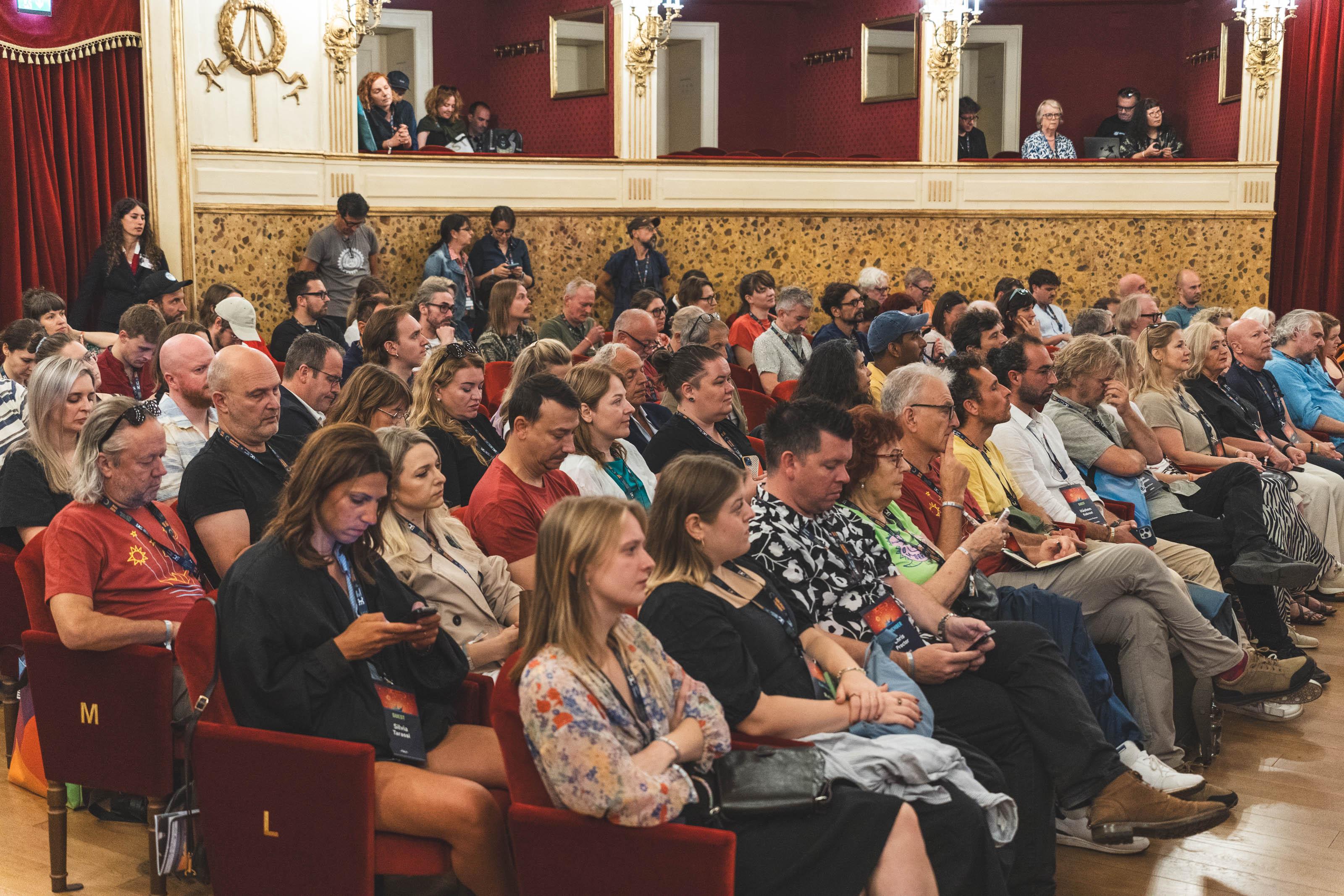
Paolo proposed putting these two philosophical viewpoints in a dialogue with one another, to think of jazz not as a haven, but as a place of tension between the ideas of belonging and otherness, between desire and denial, between dreams and reality.
The conference theme, he reminded attendees, is an opportunity to discuss these ideas. Home is never just a geographical location but a mental, emotional and rational space. Home is a point of arrival and of departure, a space to be invented and shared. Home is a symbol of an open, inclusive community that embraces differences and channels it into positive outcomes. “The true home is one that opens itself to others without fear of losing itself.”
With international crises, mass migration and new forms of nomadism, jazz, with its ability to improvise, adapt and reinvent itself becomes a metaphor for the idea of identity in motion.
In conclusion, Paolo noted that home is built through dialogue and collaboration. The EJC is a home, “a laboratory where differences become a resource and music becomes a universal language of belonging.”
Giambattista then introduced EJN President Karolina Juzwa, who expressed her joy in welcoming all the conference attendees. She spoke of this opportunity to reflect on the ability of music to bring people closer together, to connect communities and strengthen our democracies.
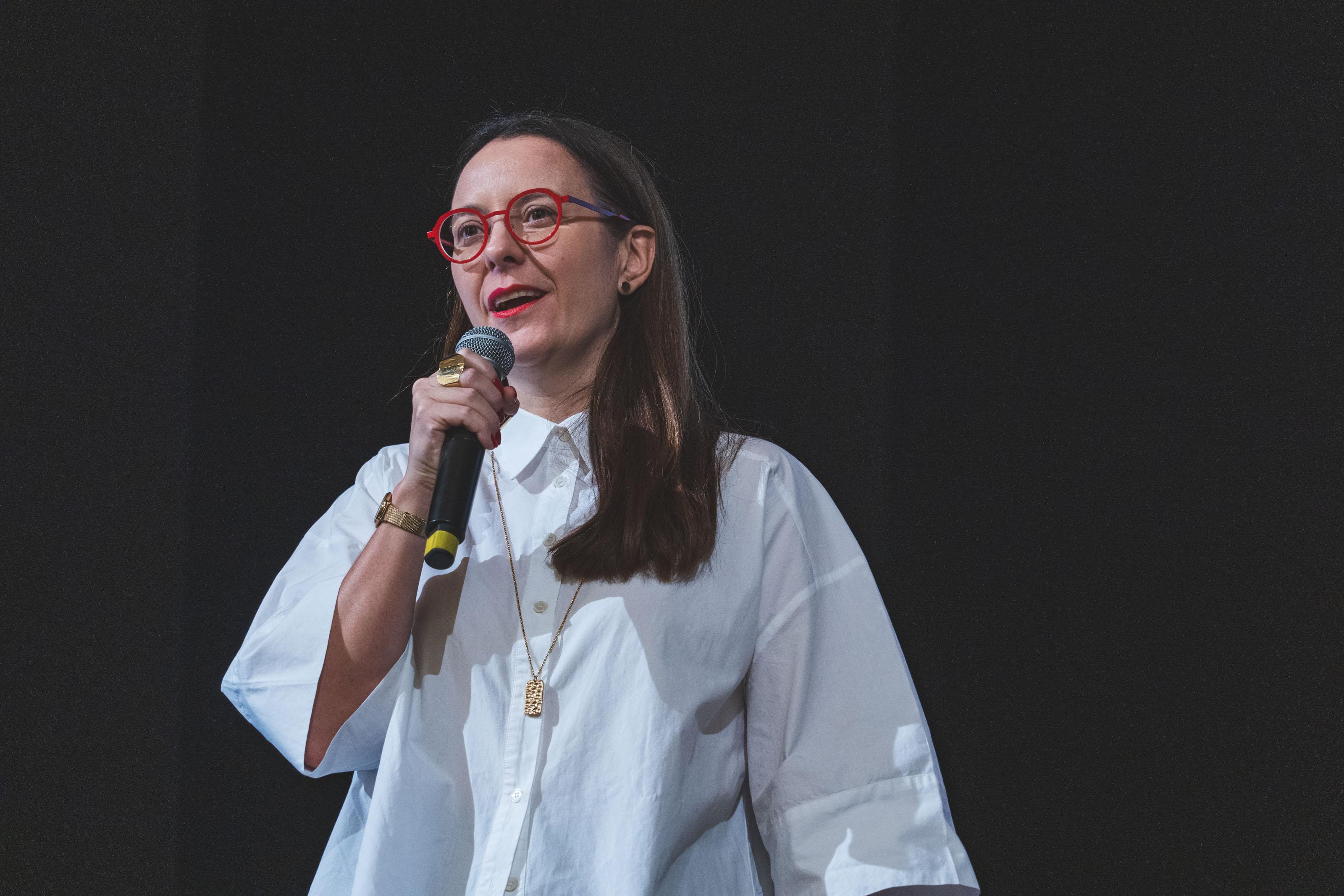
Karolina expressed her deep thanks to Puglia Sounds for “organising impeccably” the conference, thus enabling attendees to focus solely on their work. She thanked the conference for engaging with the subject of migration, reminding all that “diversity is at the heart of our European community.” She wished everyone an enjoyable and constructive conference.
Giambattista then invited Maddalena Ciocca (IT, Puglia Sounds), the conference MC, to the stage to strike the ritual gong, thereby sounding a symbolic note of communication, harmony and resonance. Maddalena greeted the hall and then gave a brief outline of the day’s activities. She then introduced Caterina Petronella (IT), the external trust person for the duration of the conference. Caterina invited everyone to read the code of conduct and to make a note of her contact details. She wished everyone a great conference in a relaxed and respectful atmosphere.
The mic then passed to broadcaster/journalist Anna Umbima (UK), who introduced the keynote
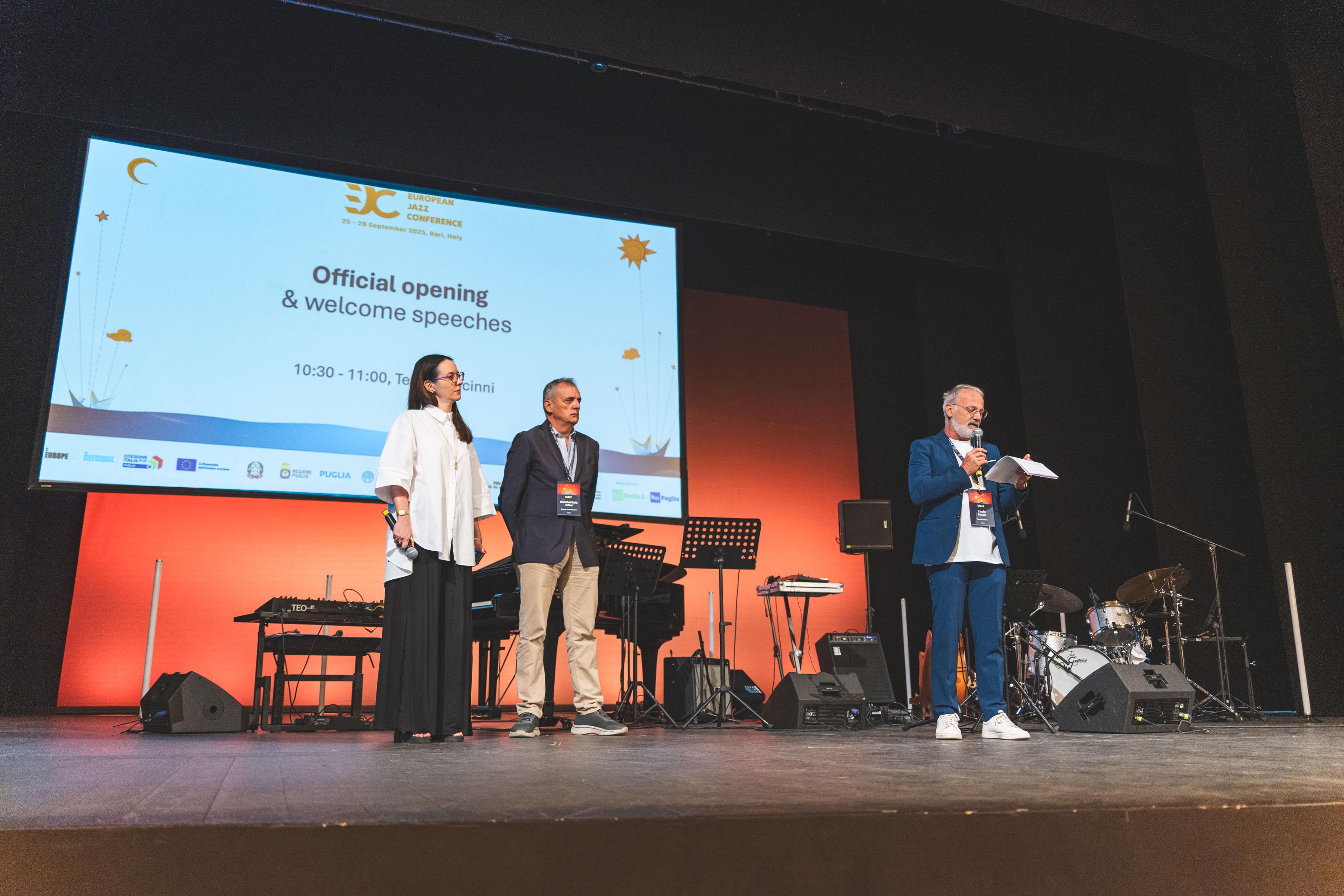
Lebanese-born, Palestinian singer-songwriter, ethnomusicologist, writer and journalist, Nabil Bey Salameh wears many hats. He is also the founder and artistic director of the FalastinFest, a cultural celebration of Palestinian memory and resistance held in Puglia.
Nabil’s roots are Palestinian, but his experience is also rooted in exile. His family was exiled from Jaffa in 1948 during the Nakba (“catastrophe”) that saw around 700,00 Palestinians uprooted from their ancestral land. Many sought refuge in neighbouring countries—denied the right to return.
This keynote speech was more of a performance piece, a monologue of poetic strain. Delivered in Italian, a simultaneous translation in English was projected onto a large screen.
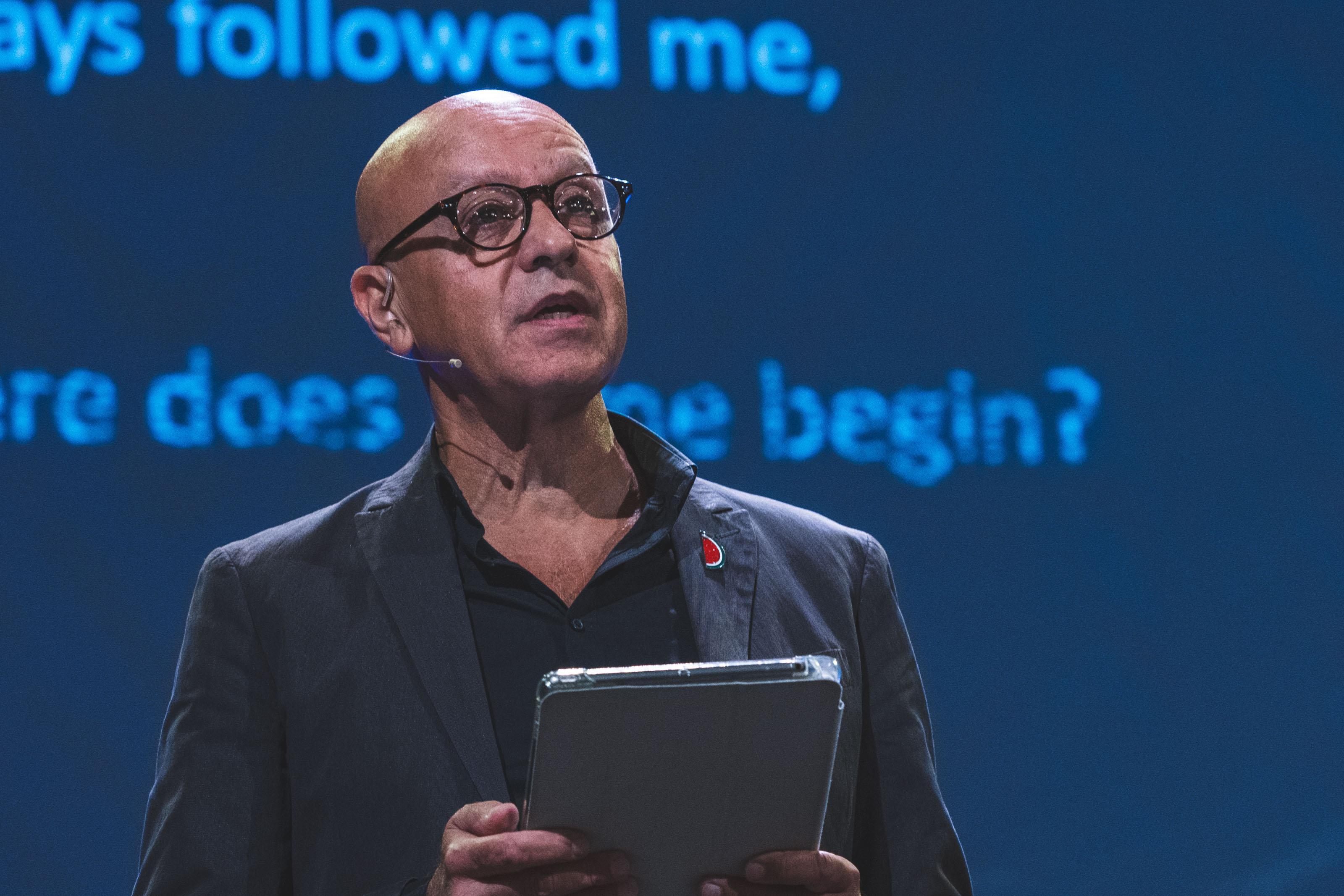
“Where does exile end and home begin?” Nabil pondered. He explained that he is from a land that does not exist on world maps. That home, he expanded, has suffered years of settler colonialism, with resultant “destruction, apartheid, genocide and complicit silences.”
He spoke of the welcome his family received when arriving as refugees in Lebanon many years before.
He called Bari one of his homes, not specifically a home defined by bricks and mortar, but a home defined by its welcome. He has grown to understand that “home” can also be a movement, “a constant navigation between what we have lost and what we can still build together.”
Jazz, Nabil inferred, is a sonic passport that does not recognise borders. As the music has travelled around the world it has transformed and been transformed. Citing the examples of activist-musicians Max Roach, Nina Simone, Charlie Haden’s Liberation Music Orchestra and John Coltrane, Nabil reminded us that music can be an affirmation of identity, a political cry, a lament, an act of solidarity, a collective prayer.
Jazz is a form of historicising, telling of “displacement, sleepless nights, silenced voices.” Jazz can be a bridge too, between those with and those without a voice. “I am a bridge,” Nabil said, “neither on one side or the other.”
What is it to be a migrant? It is not simply moving from one place to another, but the daily effort to understand new environments, to find meaning and familiarity. Migration is not a problem but a collective opportunity, Nabil suggested.
As well as their traumas, migrants also carry with them languages, knowledge and music. They offer new experiences, not a threat. Nabil made the case for art as “the antidote to every sterile nationalism.”
Alluding to the purpose of the conference, Nabil said that the gathering is not here simply to celebrate a type of music, but to affirm a vision of a better world. It is a world where culture is not mere entertainment but a cure, where jazz is “an ethical gesture.”
Nabil’s words were a plea to all the artists, organisers and listeners alike that silence is not an option in the face of separation walls, genocide, wars and injustice. He spoke of Gaza and the daily nightmare of a war that began in 2023, bringing death, hunger and systematic destruction. Nabil called it by its name—genocide. He reminded us that remaining silent means being complicit in the genocide.
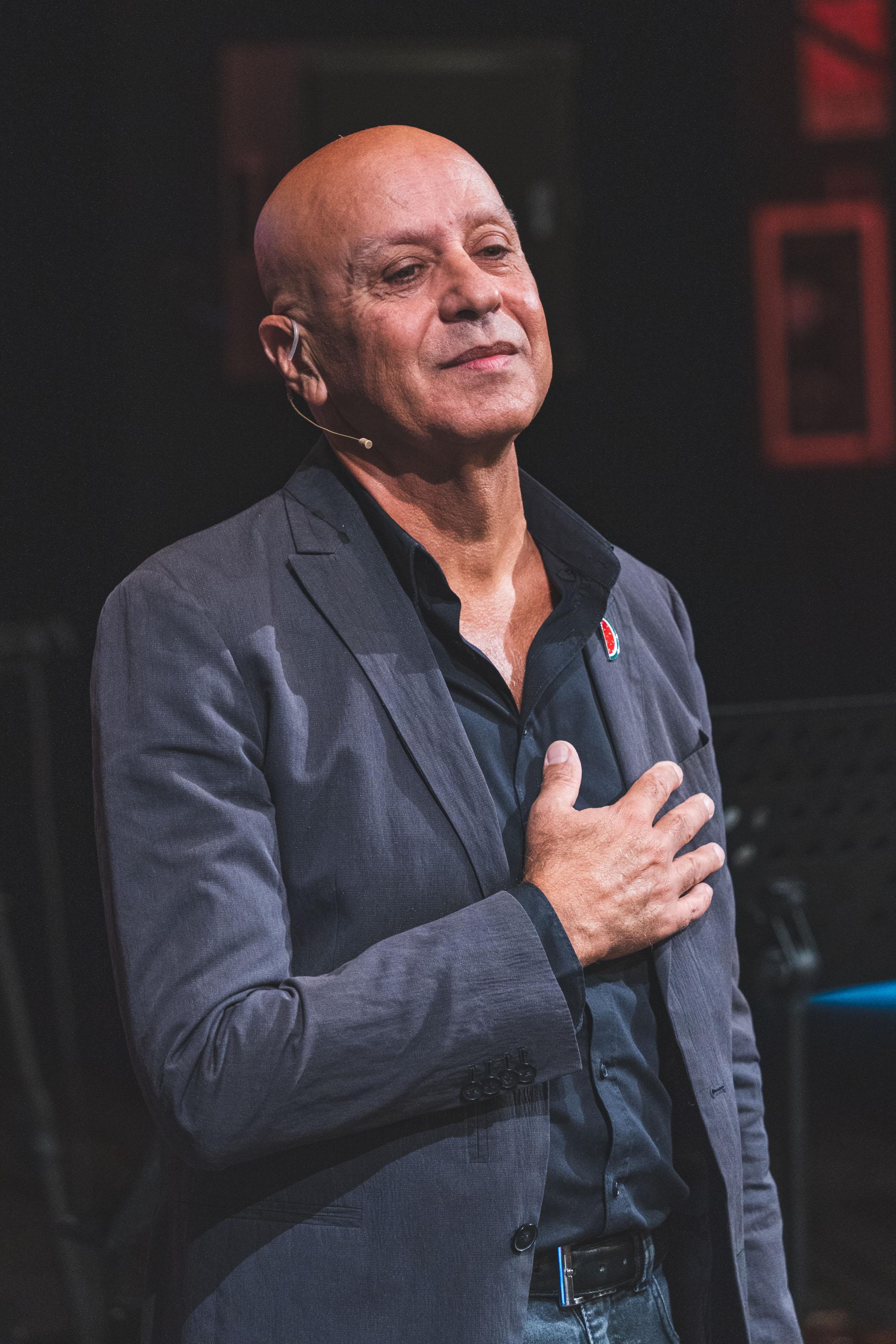
Music cannot stop wars, Nabil acknowledged, but it can stop time. Music can invite reflection, understanding, empathy and awareness. Music creates community, invites the recognition of others. Music’s beauty is its humanity, and “true humanity leads to justice and without justice there is no peace.”
The meaning of meeting in Bari, Nabil underlined, is to use music to “awaken consciousness, to make us more alert, more human and therefore more free.”
In conclusion, Nabil spoke of a Palestine that resists and a Puglia that welcomes, of the language of memory and that of invention, of music as a haven. A true home, Nabil depicted, is perhaps one that we build together note by note, without walls or borders, “but with deep roots and open arms.” Nabil thanked those who listen and those who make meeting possible and left everyone with two final words: “Free Palestine.”
Nabils’ powerful words were greeted with a prolonged standing ovation, cheers and whistles of approval.

‘Sounds of Home - Can music help overcome fear & division in our societies?”
This panel debate, moderated by writer and broadcaster Anna Umbima, discussed the potential and limitations of music to make more inclusive societies and to overcome prejudices towards migrants. The panelists were saxophonist and broadcaster Soweto Kinch (UK), theatre maker, visual artist and artistic leader Titia Bouwmeester (NL) and bassist and artistic producer Pino Pecorelli (IT).
To begin, Anna briefly described the main activities of the three panelists. Tina cofounded Orchestre Partout in 2010, a platform for amateur musicians with refugee backgrounds. Soweto has been a central figure in UK jazz for over 20 years. He is the creator of The Flyover Show, which transforms neglected spaces into platforms for dialogue, performance and reimagined Black British identity. Pino’s work encompasses theatre, film and interdisciplinary arts.
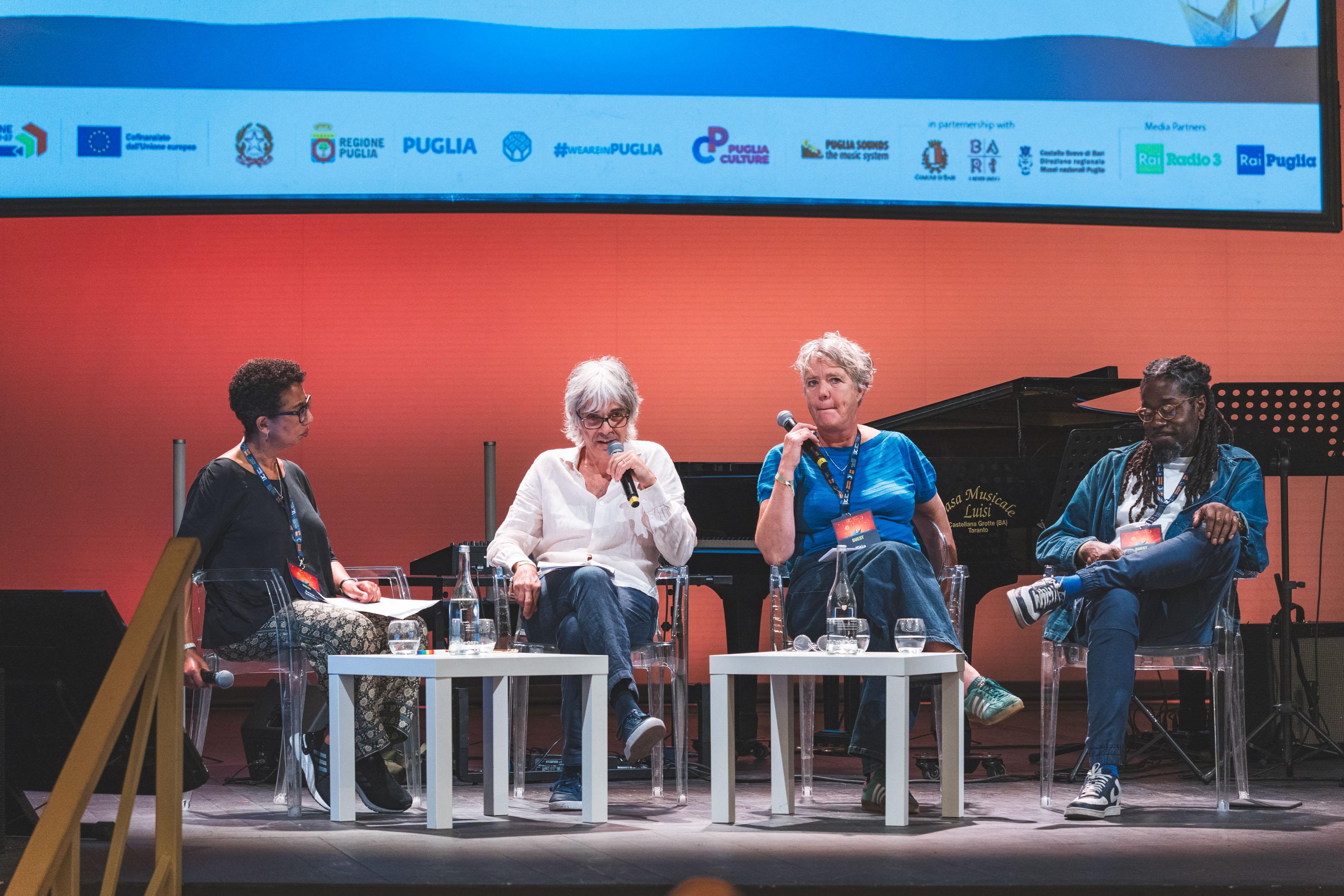
Anna asked the panelists to talk more about their work and how it relates to the theme of the conference. Pino began by describing his good fortune to have played with musicians from all over the world for 25 years. He highlighted some of his principal projects including the worldknown Orchestra di Piazza Vittorio in Rome, and Piccola Orchestra di Torpignattara, a multi-ethnic music project aimed at teenage children of immigrants.
In all these years playing with scores of different musicians, Paolo said he aspired to be not just a better musician but a better man. He came to realise in his collaborations the need to know the human behind the instrument and the culture from which they come.

Tita explained that Orchestre Partout is a community working with immigrants new to The Netherlands. “They are sometimes called refugees or asylum seekers, but we prefer to call them musicians.” She described Orchestre Partout’s grassroots social program which works in eight asylum centres with people from conflict areas of the world such as Palestine, Syria, Kurdistan Iran. Singing and rehearsing their own songs can make them feel at home, even if only for a moment. “Making music together creates a sense of belonging.”
Orchestre Partout’s talent and professional programme, in collaboration with the Conservatory of Amsterdam and Bimhuis, works with musicians from the asylum centres who already had a professional career in their countries. Together with local jazz musicians they create new repertoire together.
Soweto began with an anecdote about an encounter with folk musicians at a monastery in Armenia that illustrated the power of music to transcend cultural and linguistic differences. “We had a profound sense of human connection,” he explained. “That experience has never left me.”
He explained how his university education in history relates to his understanding of jazz as a music of diaspora, a music that polarised precisely because it brought people together who were not supposed to be together. “It is important to understand the deep history, the deep lore of jazz if we want to understand how its power can be unlocked in the present.”
As a promoter trying to create jazz performance spaces in Birmingham, Soweto said he learned a lot about the assumptions one makes about who the music applies to and who will like it. These assumptions, he declared, are frequently upended along class, race and gender lines by simply turning up and playing the music.
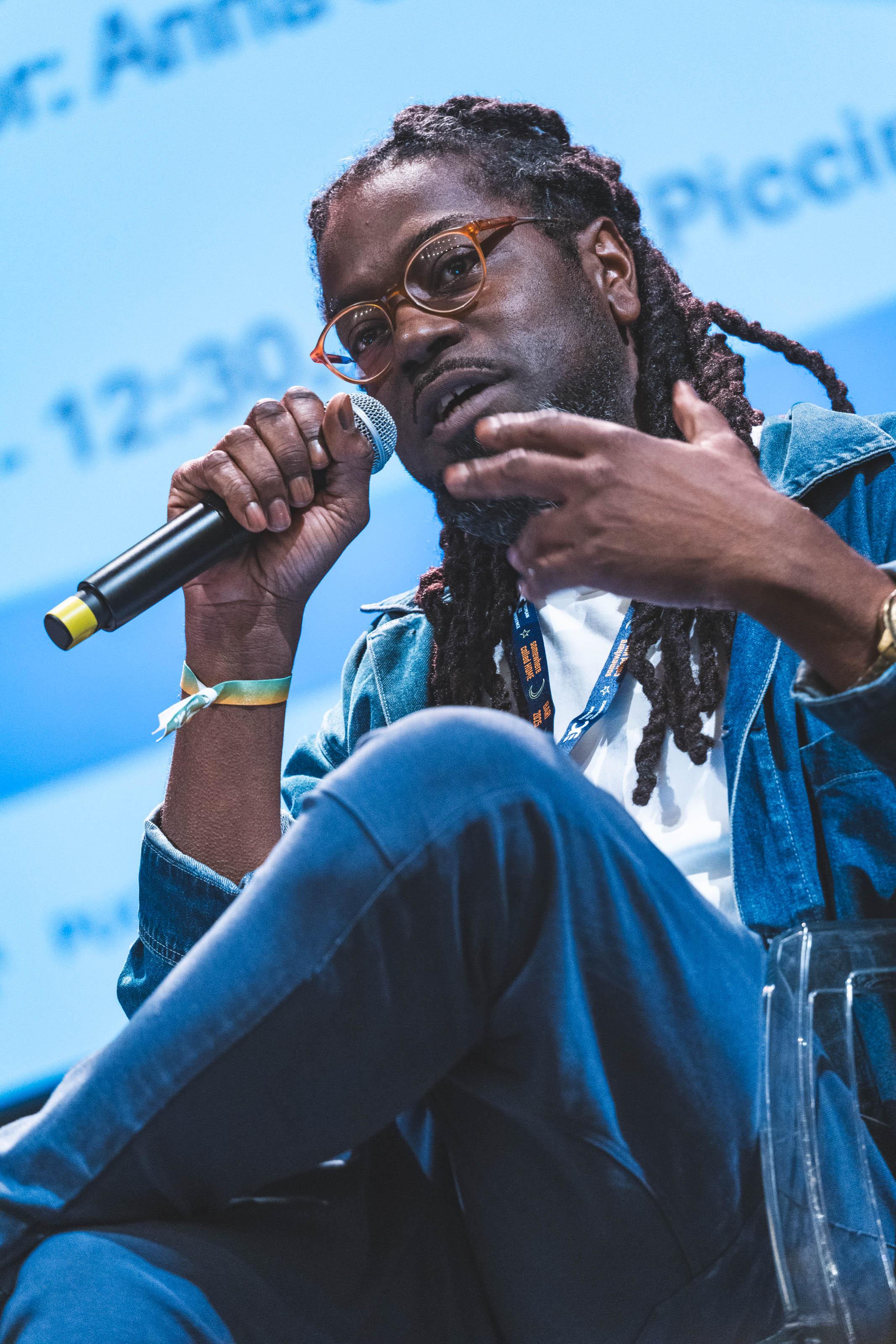
Anna then asked if it is enough to just play, and whether music can help overcome fear and divisions. All three panelists gave examples of how creating music together can foster unity, inclusion and acceptance, but as Titia pointed out it is first necessary to create a welcome playground—not just for white, privileged people. Greater openness and equality is needed, she said, and for this we must actively invite people.
A thread that arose from the discussion was the important role that theatre and music can play in the positive framing of immigrants. In mainstream media, especially on television, immigrants are unfailingly portrayed as people on boats, as people in lines, or as people housed in asylum hotels. In other words they are framed and perceived as victims or as a threat to society.
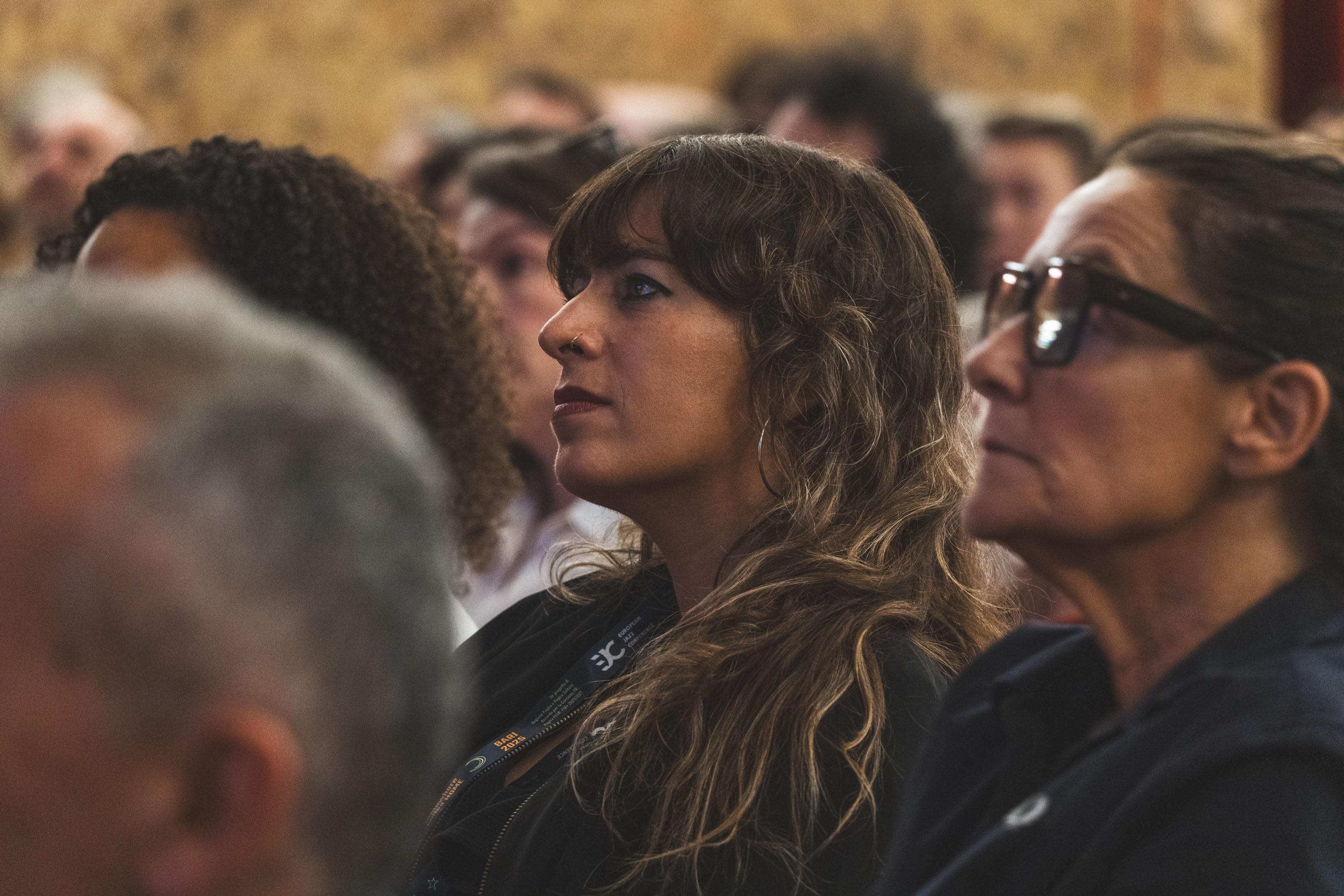
To counter these solely negative portrayals, Titia said, it is important to invite immigrants into our playgrounds and onto our stages so that they can share their stories, and so that people can identify with them. This is the way to break the existing frame that is “so consciously built by others.”
Soweto concurred with Titia’s comments, adding that by constantly referring to “refugees” and “asylum seekers” we are guilty of dehumanising them. “They are people. They have names” he said. He also spoke of the benefits of moving beyond well-meaning philanthropic work by also encouraging meetings in less formal performances spaces, such as jams. The jazz jam session, he said, is where some of the most profound musical and personal connections are fostered.
Anna recalled how Europe has overcome bitter divisions in the past, She asked what lessons can be learned from history. Soweto responded by saying we have forgotten the contribution of migrant communities to the development of jazz. He highlighted the Roma, beginning with Django Rheinhardt and onto Roma jazz practitioners today. He spoke of the contribution of European Jews to jazz, citing, for example, Benny Goodman’s enormous impact.
It is important, Soweto added, to overcome the collective amnesia that neglects migrants’ significant contributions to jazz. “It is a powerful narrative that we must reclaim.”
Part of the challenge to address, Pino said, is that many young people do not use music to relate to other people. They engage with music on their phone or on their computer. He related how some years ago it was common to see African musicians arriving in Italy with traditional instruments, whereas today they arrive with a computer, an Ableton and a little synthesiser. Whilst acknowledging that music naturally evolves, these changes suggests that music today is less a communal experience, and that it is not so important anymore to play together in order to make music.
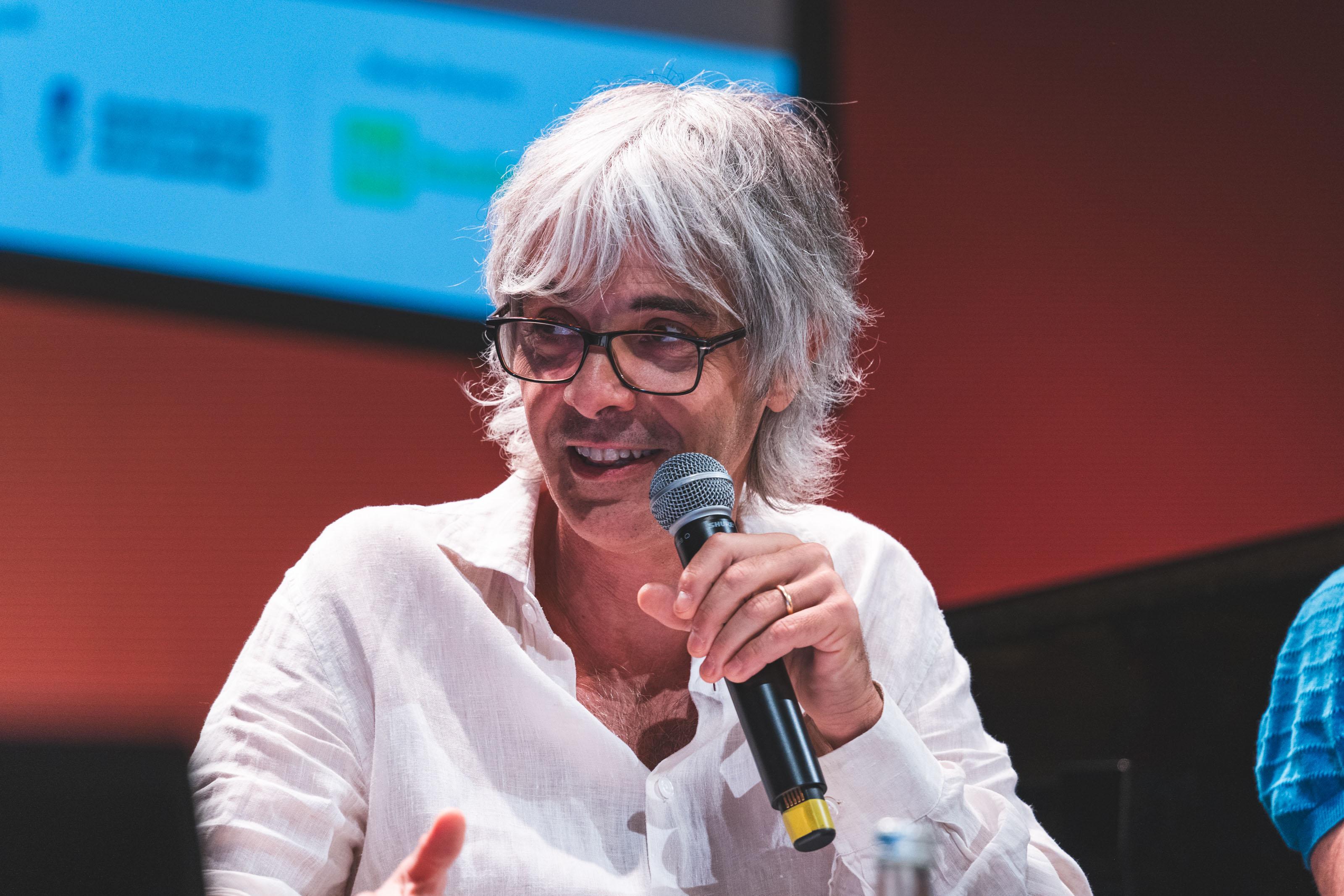
Following up, Anna asked how we can bring young people together to experience music communally. To some extent the answers retraced ideas already expressed, though Soweto made the point that we must not make the mistake of dehumanising people on right-wing marches. It is important, he said, to understand the motives for their anger and alienation—the lack of opportunities, the economic hardships they face. “I think we have a role to play in that regard… jazz has a history of bringing people together.”
For Titia, giving people ownership of the projects they are part of is essential. For Pino, treating people as people, and not patronising them, is essential. Soweto added that welcoming different people into the music, as well as diversifying audiences, is important for the renewal of music.
To the question on the current political climate surrounding funding for diversification projects in the arts, the three panelists painted a fairly bleak picture. “It is the difference between having principles and having interests,” Soweto said.
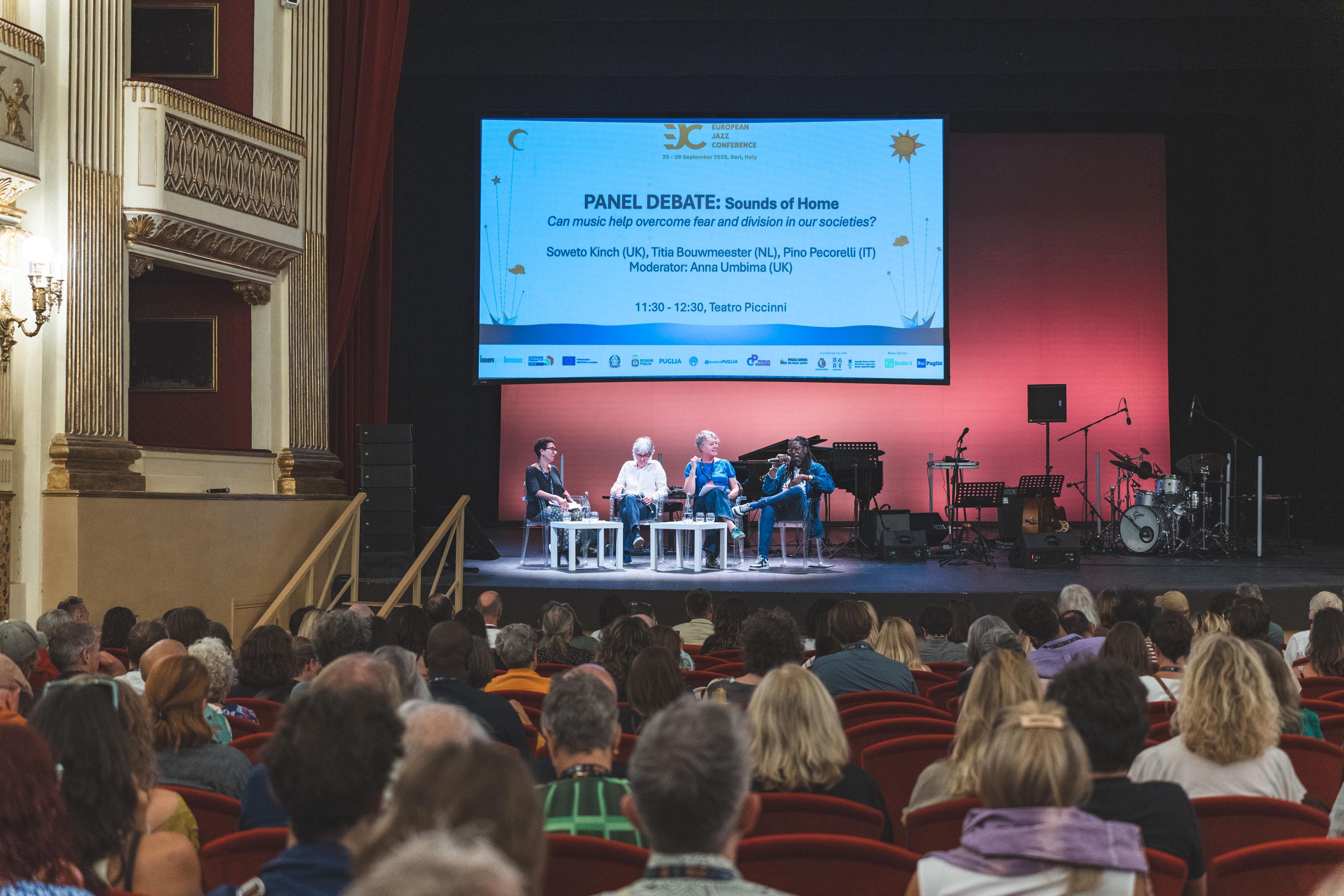
To Anna’s fi nal question about how the panelists feel regarding the passive consumption of jazz as background music, Soweto said: “We shouldn’t lend our voices and go to places where we are just decoration. The music that my ancestors, the elders laid down is far too important for that.”
Soweto urged people not to shy away from confrontation, but instead, to “lean into it” when necessary. Jazz is not a culture to be consumed, he stressed, but a culture to be actively engaged in.
In the Q&A that followed, an audience member asked how organisations can connect with young people and introduce them to jazz. Pino said that more places to play are essential, not only to attract audiences but to better enable jazz musicians to make a viable living.
Promoter Nod Knowles (UK), former EJN President, asked the panel for their thoughts on whether it would be right to ban Russian and Israeli jazz groups given the wars in Ukraine and the Palestinian Territories.
Titia said that lot of the musicians Orchestre Partout works with come from the Middle east and they don’t want to work with Israelis unless they clearly state that they are against the war. However, she said that she was not a fan of excluding musicians, because while on stage making music they are creating a reality not directly connected to the world around us. “We have to avoid politics on stage,” she said.
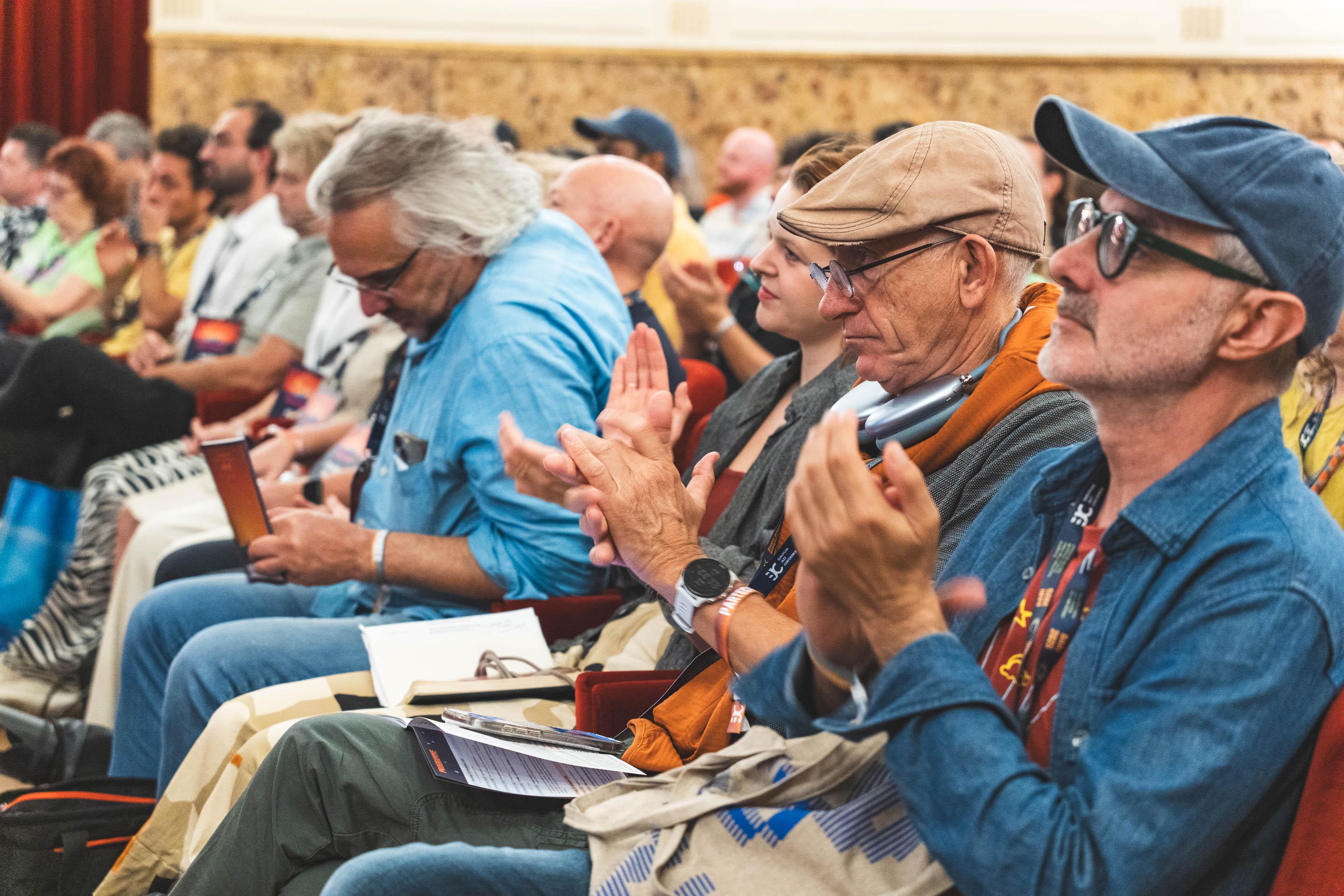
“Can you avoid politics in music?” replied Soweto. “As a promoter I have no interest in excluding people, but I also have no interest in milquetoast, pretentious waffly jazz, because that is just background music. It doesn’t mean anything. It is even more offensive to be promoting that stuff while there is a genocide and a war happening as well.” Soweto added that programming easy-listening, meaningless jazz in the present terrible circumstances is a political decision.
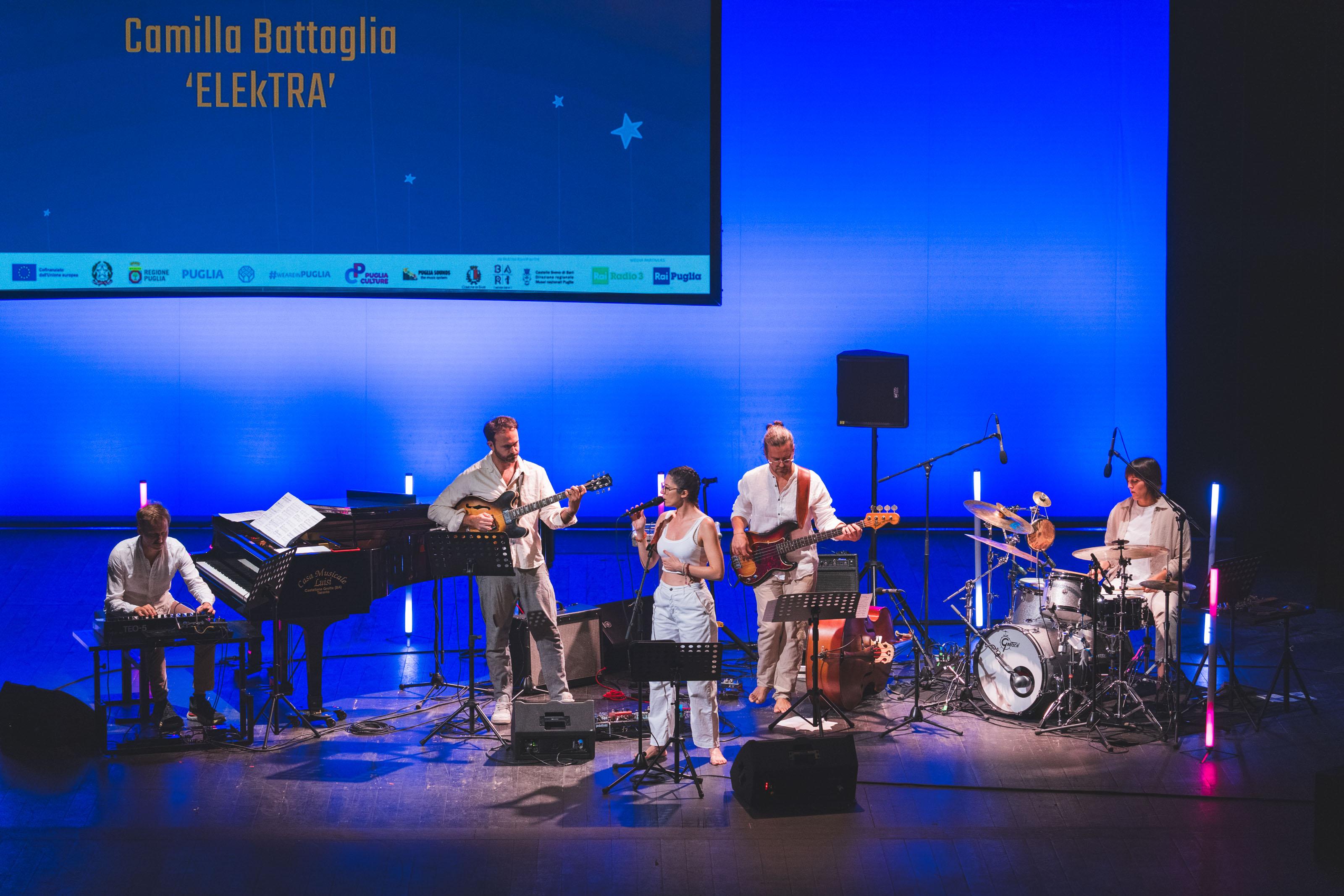
#1 - Embracing cultural entrepreneurship to future-proof our organisations
A teacher and her former pupil steered this session on ways for festivals, promotion companies and projects to become more financially resilient. Speaker Gökçe Dervişoğlu Okandan—who holds a PHD on the relationship between art and management—used to be the professor of moderator Murat Serzgi (TR/DE)—co-founder of Bozcaada Jazz Festival. In a varied career Murat has co-founded record labels, booking agencies, festivals and an AI-technology startup. “Many of them failed, some of them did well.”
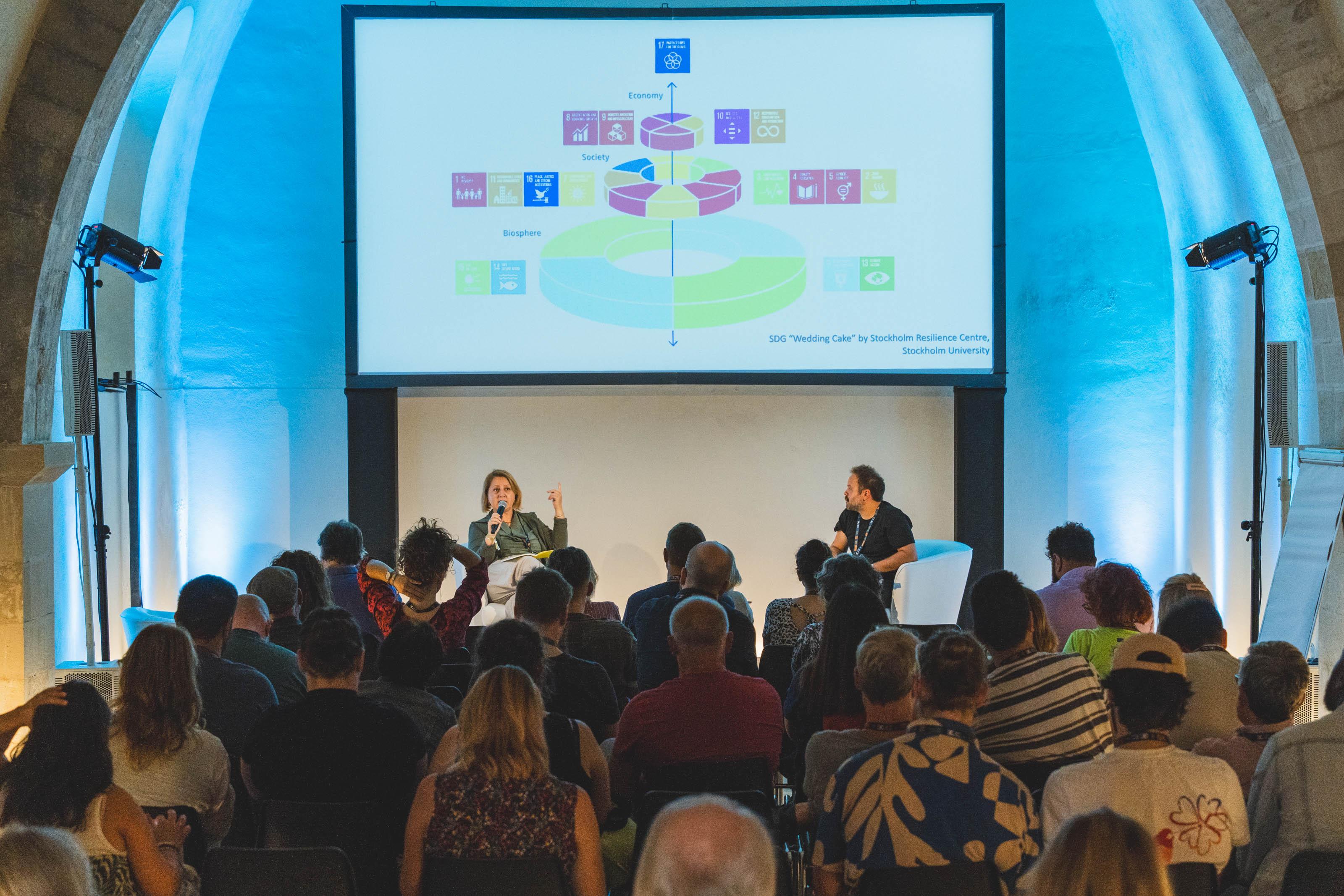
Gökçe described her move from a strategic management background into art-andculture-related academia as challenging. She leaned on the studies of critical management scholars in Scandinavia for inspiration. In the late ‘90s neo-liberal governments in Europe and large corporations alike invested in the arts. There was also solidarity between cultural organisations and NGOs in the field, which created strong infrastructure. She acknowledged, however, that each country has its own story, its own political and economic tides. She mentioned the UK’s traditional arms-length policy towards the arts, and Germany’s strong federal government.
The financial crisis of 2008 forced widespread budget cuts and a shift towards cultural entrepreneurial training. A program in The Netherlands to provide such training for “alternative solutions in fundraising,” and the British Councils’ entrepreneurial “tool kits” provided some guidance and linked entrepreneurship to the wider political discussion of sustainability.
Gökçe brought up a slide of the Stockholm Resilience Centre’s ‘Wedding Cake’—a hierarchical tier depicting the relationship between the biosphere, society and the economy in regard to Sustainable Goals Development. She placed collaborative networks of cultural organisations like the EJN within this framework, underlining how they are claiming a stake with their advocacy.
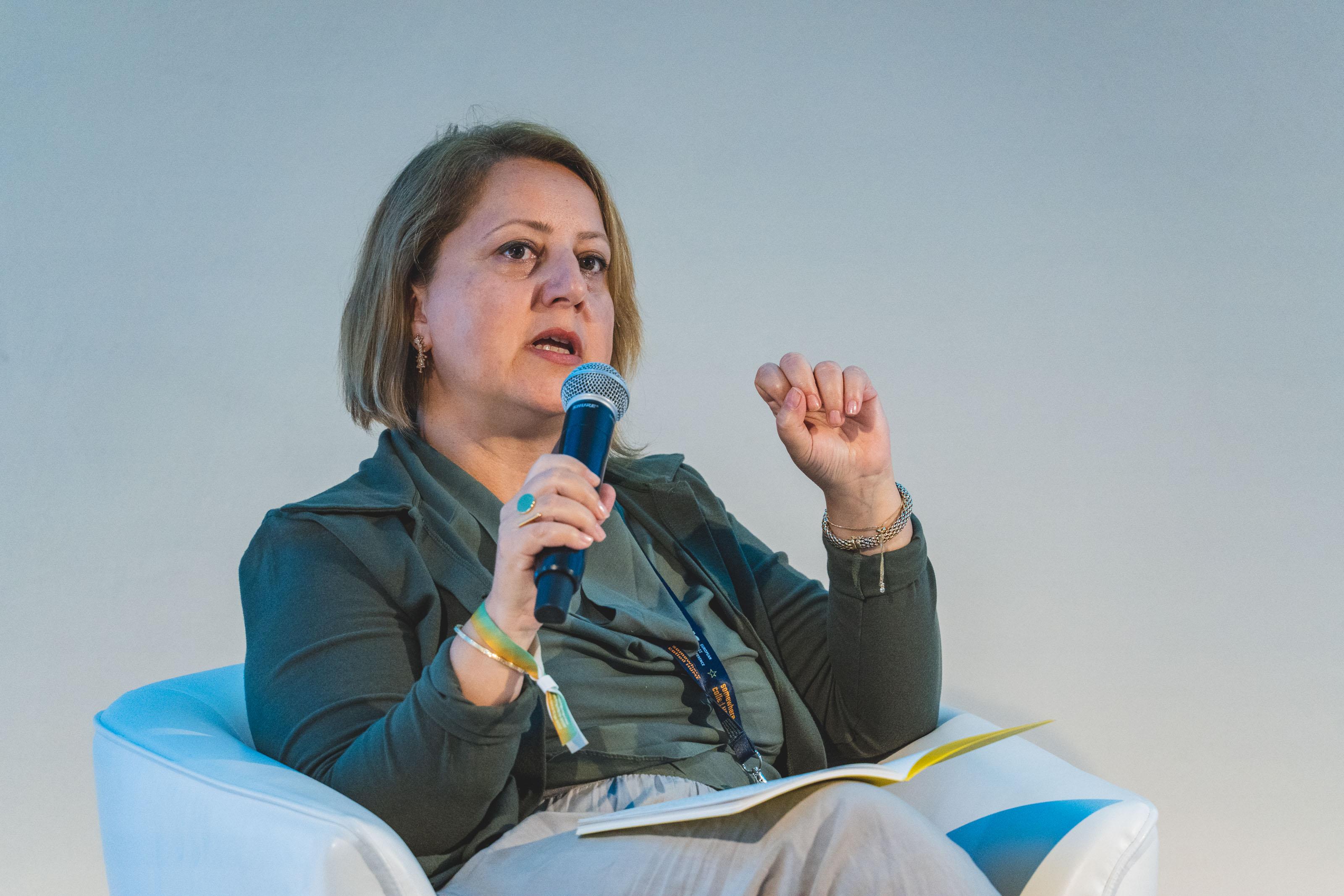
She cited Ed Freeman, a pioneer in strategic management, who developed the stakeholder theory in 1986. Freeman, Gökçe said, is also a jazz musician, well used to improvising and thinking on his feet.
With regard to advocating the economic value of a festival to the host town, city or region, Gökçe said that we should also highlight the “spillover.” This term could apply to the additional benefits that come with artists inspiring young people in myriad ways, or in terms of promoting the
multiple benefits of cultural diversity. A slide on the 2005 UN Convention of Cultural Diversity addressed themes of knowledge-creation, inclusion, participation and related sustainable development points. In addition, the UN CCD also identified employment issues in the cultural sector.
Why is it useful to understand such a macro framework as the aforementioned ‘wedding cake? Gökçe explained that we are citizens, stakeholders, entrepreneurs and advocates. When writing a proposal for economic aid, it carries greater weight to situate our proposal within the wider socioeconomic context.
Murat recognised that some people are uncomfortable with the image that surrounds an entrepreneur—a gogetting, money-seeking individual—but urged attendees to try and focus on thinking about the term differently. What is the entrepreneurial mindset? Murat defined it as recognising opportunities that arise from challenges or problems and taking calculated risks.
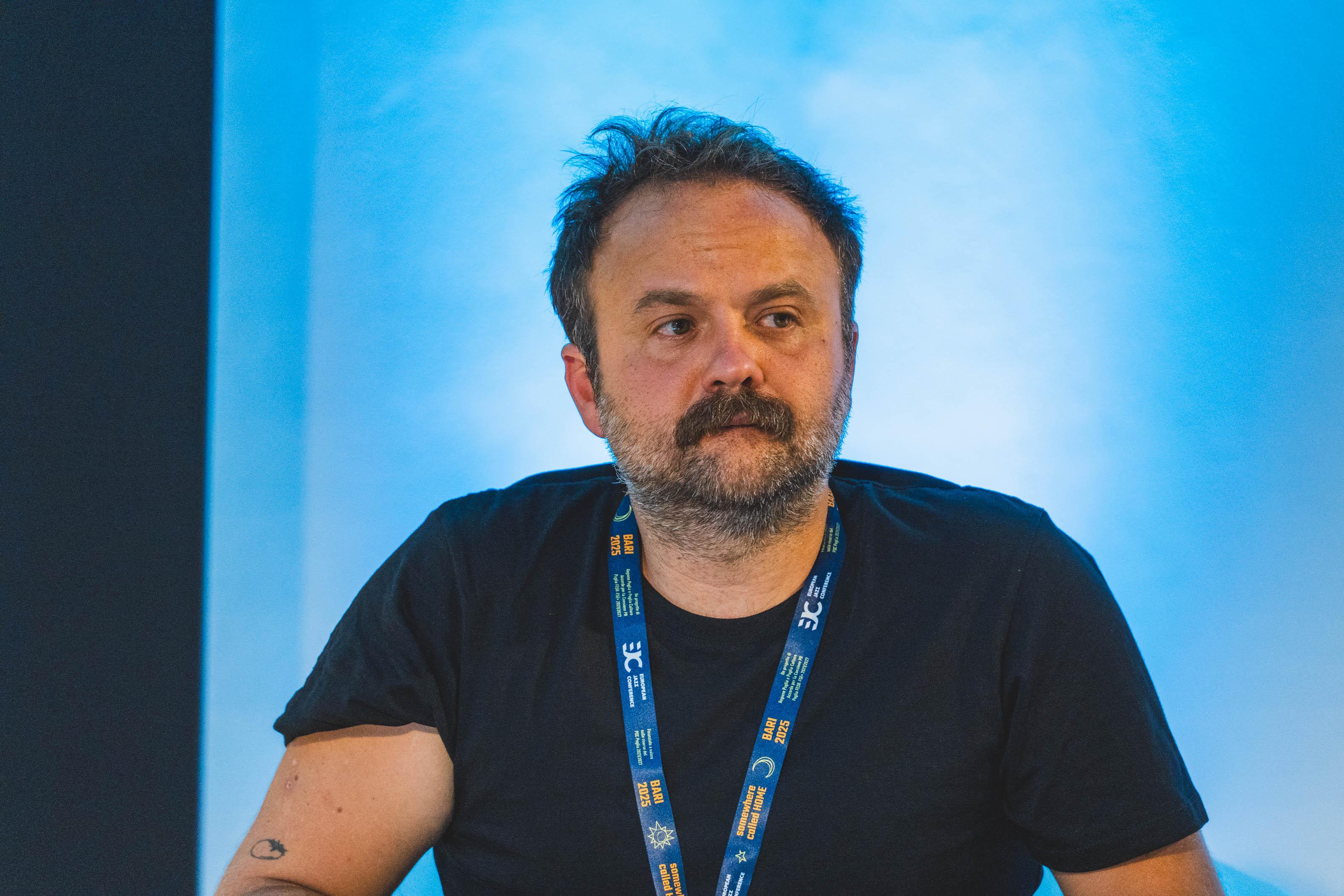
The world we live in is one of uncertainty, ambiguity, complexity and volatility, Murat said. It is not the same world we lived in 20 years ago, but it is giving us entrepreneurial opportunities, particularly in the creative fields, to deal with these challenges. Citing the example of Bozcaada Jazz Festival, initiatives taken included:
• Inviting external speakers to advise on different financial models
• Discussing business concepts with other festival owners
• Collaboration with local businesses on the island
• Growing audience through alternative workshops/talks/activities
• Entrepreneurial talks within the festival team led to its own wine brand
The aim in highlighting the impact of culture, in both social and economic terms—and bringing the two worlds closer together—will hopefully attract further investment, Murat said.
The room was divided into groups to discuss entrepreneurship. Points that were briefly summarised at the end of the wide-ranging group discussions included:
• The meaning of cultural value
• Looking at other areas of music (punk, rock) for inspiration
• Marketing jazz
• Funding stability
• Team members dedicated to researching entrepreneurship
Gökçe recapped the main aims of the session, principally actively looking for opportunities in challenging contexts while calculating the risks. She closed with this statement: “Resilience can only be built through solidarity.”
#2 - Sharing the message: communicating social and environmental values in live music
How can festivals, venues and organisations communicate their commitment to sustainability— and their broader social values—to audiences? This was the main topic of the session led by Armelle Llop (FR) and moderated by Mathilde Sallez (FR). Armelle and Mathilde are collaborators of Better Live, at Le Périscope in Lyon. A collaborative project involving 11 European partners in the jazz/improvised music sectors, its three-year cycle (2022-2026) will examine the production of more sustainable live music events.
Mathilde began by speaking about Le Périscope, a small venue in Lyon city centre that programs around 150 concerts per year. Besides jazz/improvised music Le Périscope also stages contemporary and traditional music. She spoke about Better Live’s aim to reduce the carbon footprint of touring musicians.
Armelle explained how Better Live has organised 57 tours around Europe, with the last tour of the project scheduled for December 2025. A major aim to be implemented at the end of the project is to conduct a communication campaign to make the findings visible. Further aims are to develop data-analysing tools, to provide training for professionals in the live music sector and to experiment with low-carbon-footprint concerts and touring.
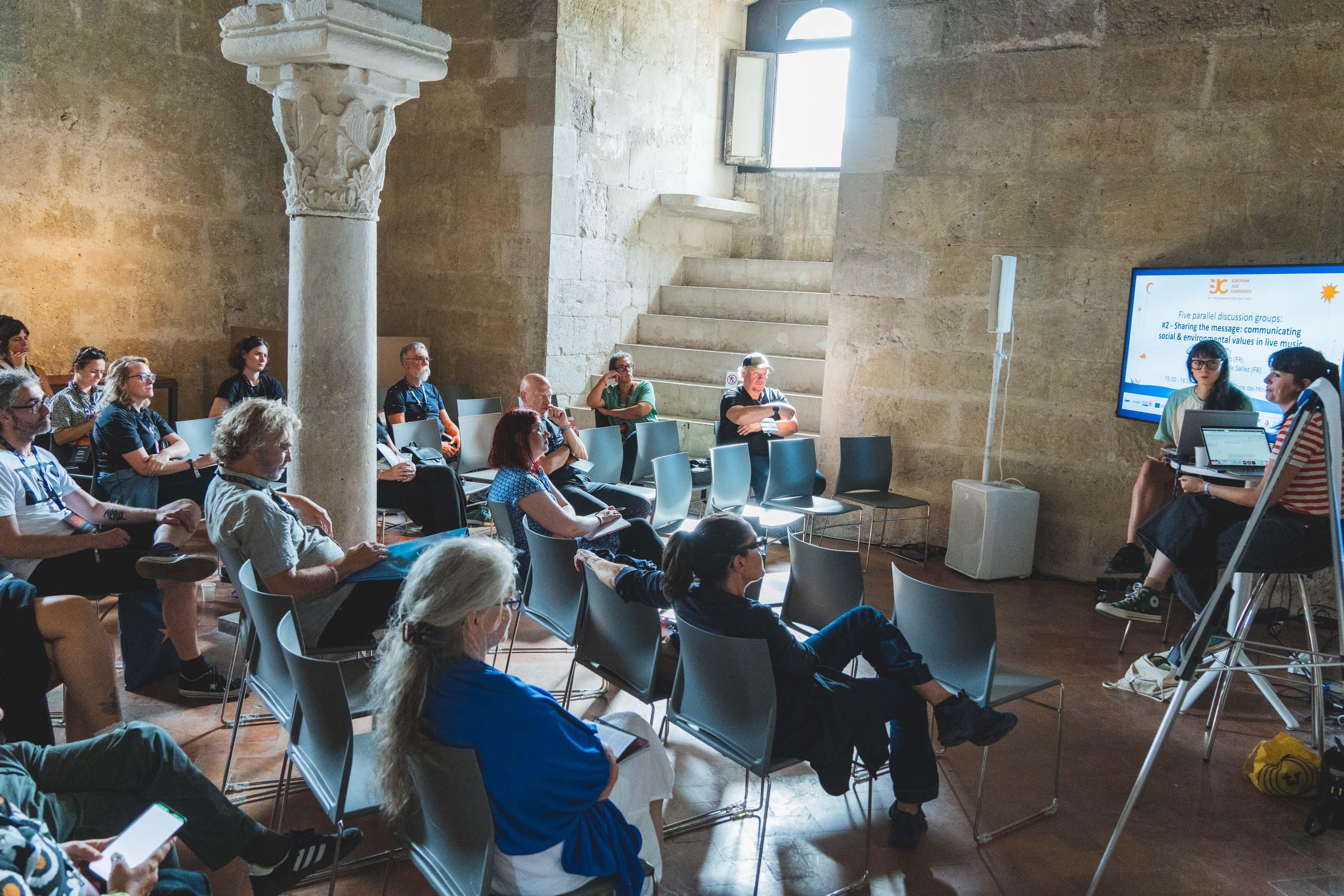
One way to reduce the carbon footprint of touring bands, Mathilde explained, is to multiply the number of concerts in a small territory. Research will measure the social, economic and political impact. Researchbased data is essential for legitimacy in communicating findings and take a position on sustainability. Not only does it provide credibility but it allows the project to illustrate the range of its activities. But it is only at the end of the project, with all the data gathered and analysed, and the information made readable and accessible, that it will be shared.
One of the challenges for the team stems from the fact that they are not ecologists but cultural communicators. Ecological data is complex, Armelle said. “We allowed ourselves time to get into the topic as a team internally… it is a responsibility to talk correctly on this subject.”
The team adopted a number of principles, which included not sounding moralistic or judgemental in its texts or videos. Mathilde said that although they were a French venue catering to a predominantly French audience, living French reality and politics, they were aware that they were communicating to a European audience and partners. “We had to have a campaign with a European vision, one that would work from Poland to Greece, from Slovenia to Ireland.” Therefore, she said, the advocacy had to be in a clear and simple language to reach the largest possible audience.
As the cost-of-living crisis is felt right across Europe, and with much political turmoil as well, the team decided to link the ecological message with an economic one. People relate more quickly to arguments that affect their pocket. It was decided to work with a communications agency specialising in ecology, and strong on storytelling.
Following on from her reference to the current economic and political crisis Armelle added that when she joined the venue it was strong on editorialising its monthly newsletter. Besides music news there was commentary on important issues in society and in the world at large. This was part of the identity of the venue and people reacted positively to this socio-political engagement. “Our audience is always very, very receptive,” Armelle noted. “We feel that we can have an impact. We know that we cannot change the world, but we believe we have a role to play as a venue. For our audience we are like a lighthouse in the night. For our venue it means something and for our audience it really means something too.”
The discussion opened to the room where questions on political editorialising reflected wider concerns about protocol, potential censorship and responding to public criticism posted on social media. Jakob Fraisse (DE) from jazzahead! related how the German Minister of Culture has banned inclusive language in departmental communiques. “It is a concern how this will develop in the future,” Jakob said.
Kostia Pace (BE) from the Jazz Station in Brussels, a jazz club, said that their social media posts might reach just 100 people and there is the feeling that with so many people posting so much information these messages can be forgotten as quickly as they are posted. More effective, he feels, is to speak to audiences before a concert, not about the music but what is happening in Belgium or in the world. “Maybe these kinds of speeches have more impact on the people than social media. If they are here they are allies in the cause.”
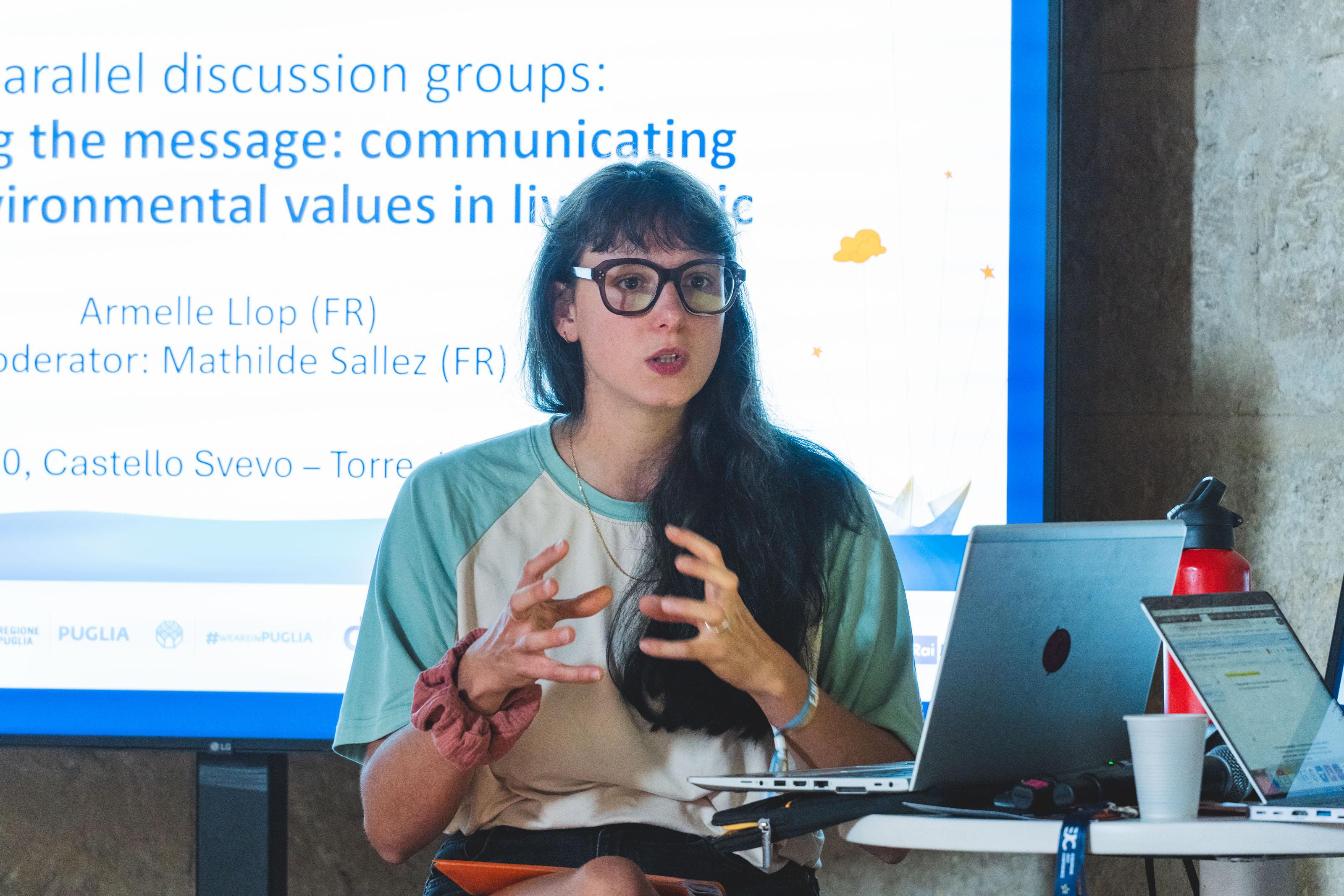
Armelle agreed that sharing human values with audiences is very important, especially in small venues. “People are coming to find something more than music; they are coming also to find connection, to have a discussion with someone…”
It is important to keep in mind, Mathilde said, that people following your social media posts or newsletter communiques are already converted. It is a more difficult task to reach people outside your immediate circle.
Another attendee said that a dilemma can arise when you love an artist’s music but not their politics. Where are the red lines in communicating your politics to an audience? It is worth remembering, Kostia said, that for 99% of small and medium venues the people who regularly attend shows do so because of the venue, not especially for the artist. “If they come to the Jazz Station it is because they are connected to the values that we defend. Then it is because we are politically active in building a community.”
Not everyone might agree with some of your ideas or values, Kostia acknowledged, but that is where the conversation begins.
In these highly politically charged times it was no surprise that a session on how curators, programmers and artistic directors navigate complex social and politic landscapes should attract such a large audience. The moderator was Marzio Scholten (NL), artistic and managing director of RAUW, a festival that also runs events throughout the year and is involved in talent development. Joining Marzio were panelists Xavier Lemettre (FR), artistic director of the festival Banlieues Bleues and La Dynamo, Shane Burmania (NL), a programmer for Bimhuis in Amsterdam, and Patricia Pascal (UK), who works in talent development as a creative producer for Tomorrow’s Warriors in London.
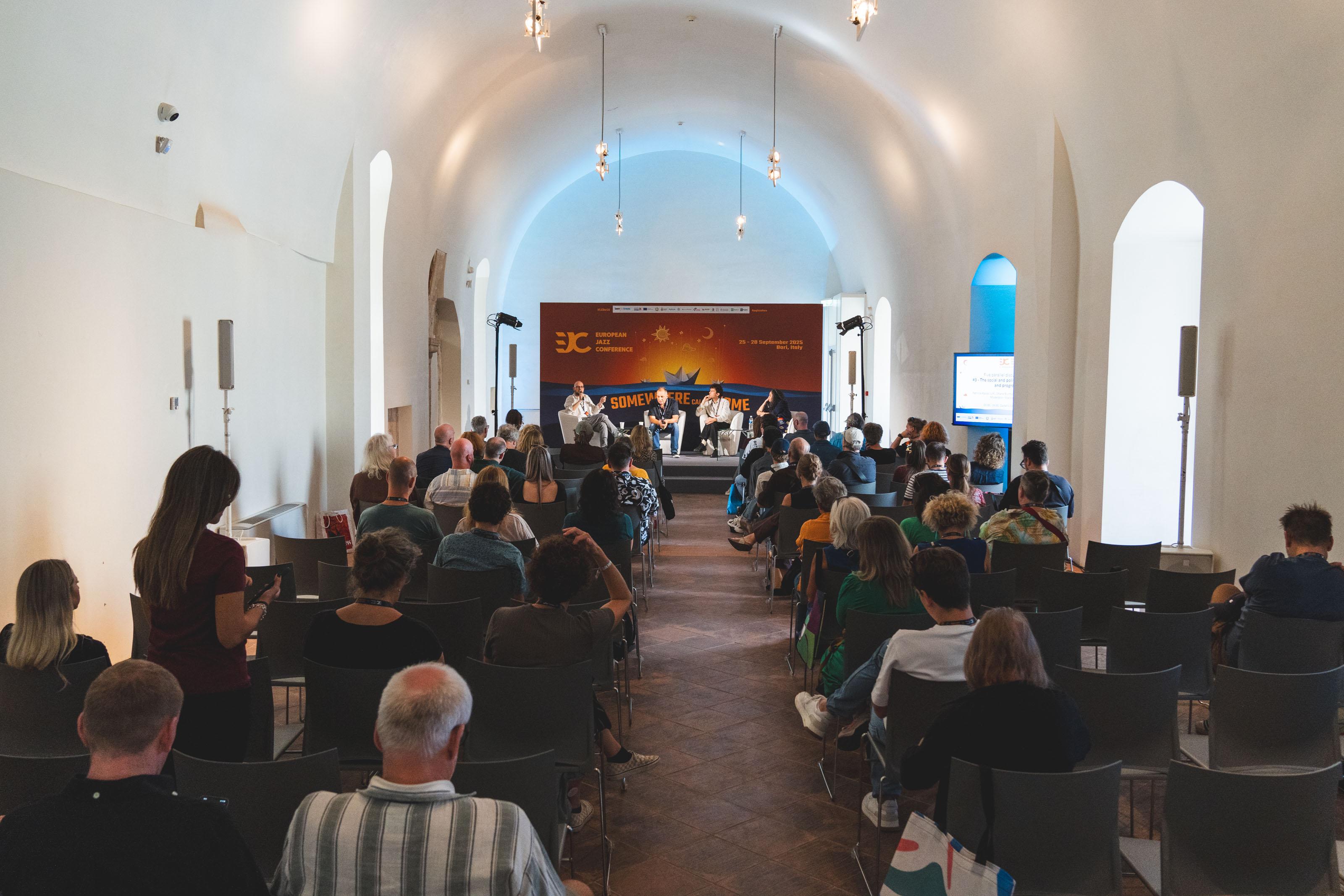
After brief introductions from the panelists, Marzio asked the panel in what ways they think their programming should reflect the times we live in. Shane replied first: “We are a reflection of the times, and I think we should be, in the bands, programmes and shows we present to the audience… but the reason I wake up in the morning is to present something of contemporary culture. With contemporary culture there is always a social and political aspect to it. With some artists it is more outspoken…”
To Marzio’s question if there is a thread to Bimhuis’ programming that reflects the times or if it comes down to personal opinion, Shane replied: “I think every choice we make is already made in a socio-political context…even by not making a choice you are making a choice, you just don’t see it maybe.” This comment about choice always being political echoed Soweto Kinch’s comment during the panel discussion that morning.
Turning to Patricia, Marzio asked if it is possible to simply make music without political engagement, adding, “What should we expect from artists?” Patricia spoke about Tomorrow Warrior’s educational philosophy, musical and social, about helping young musicians “find their tribe” but as a manager it is not her role to influence what they might talk about. Some artists are very comfortable voicing their ideas, whereas others voice their ideas through sound.
It is not the place of managers/mentors to dictate how artists express themselves, Patricia said, but added that Tomorrow’s Warriors will support artists if they are vocal about what is going on in the world. It is the organisation’s goal to promote social justice via greater inclusivity in gender equality, greater minority representation and access to students from lowincome backgrounds. “We have a social responsibility,” she said, underlining that Tomorrow’s Warriors is the only music educational programme in the UK that is completely free to the students.
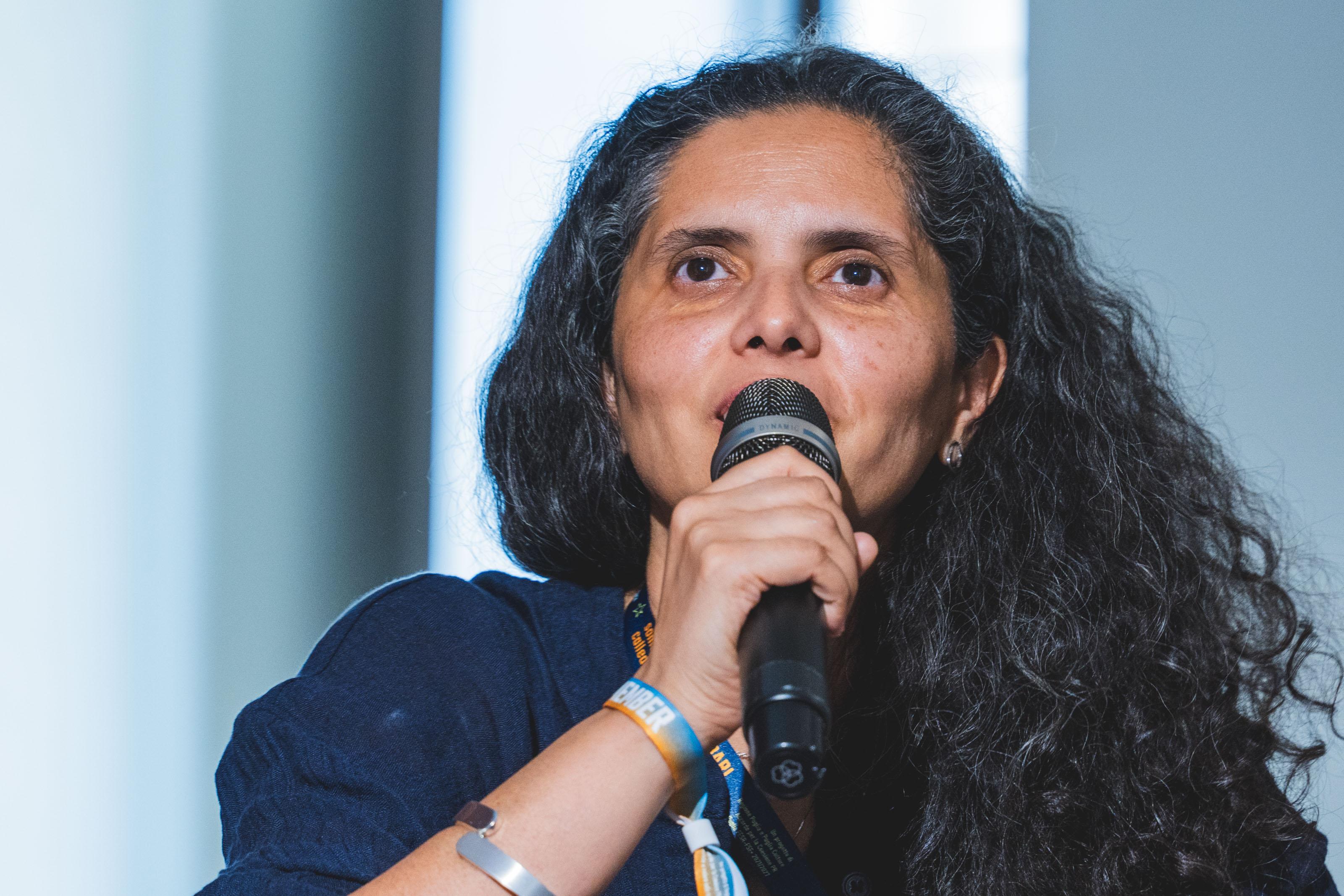
Xavier spoke of the social and musical cohesion that Banlieues Bleues has promoted for forty years, without any problems in neighbourhoods where life is difficult for young people. With regard to promoters’ place in the political sphere, Xavier replied that many organisations in France rely on public funding and by extension, politicians. Financial cuts create pressure, protesting against cuts creates pressure ,“and if you protest too much you get more cuts.”
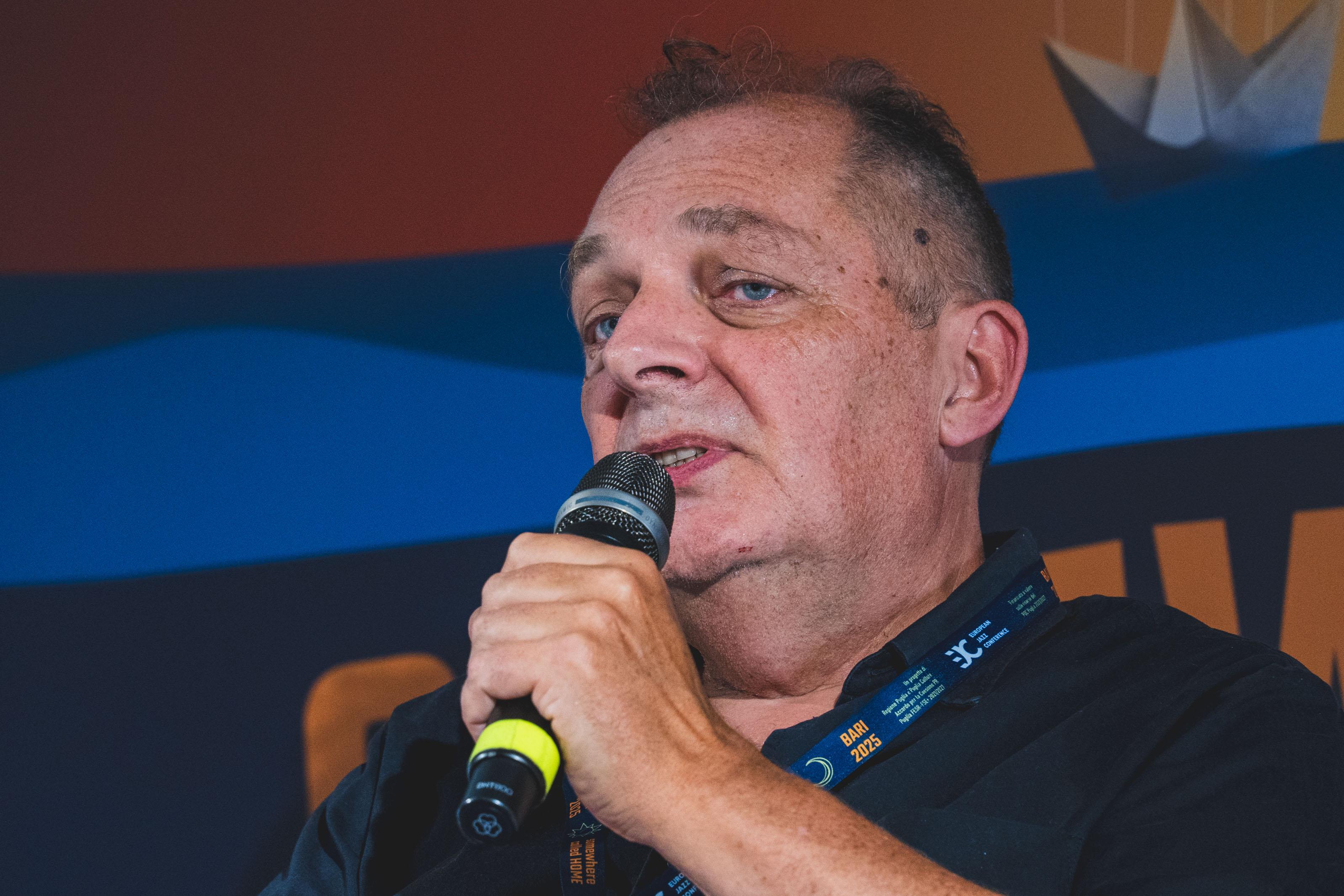
Musicians too are under pressure from all sides, Xavier commented; Pressure to speak out on a range of socio-political subjects, pressure from censors, or pressure to self-censor, pressure from social-media backlash, threats of funding cuts if they are too vocal. Xavier referred to a recent survey that showed that 85% of the world’s biggest festivals, music labels and agencies are owned by five billionaires, including AEG and Live Nation, which are to the right politically. “We live in a time that it is less and less free.” Even the often-cited notion that art and politics should be separate is, Xavier noted, “very political, because it is just another way to make you silent.”
The conversation touched on the conservative tendencies of certain schools of jazz style, of jazz’s still majority male and majority white visage, on the rise of right-wing politics everywhere and the need for jazz gatekeepers (mostly left-wing) not to preach only to the converted. If sometimes the scenarios depicted seemed dystopian, Xavier also invited us to imagine a utopian future where all music, like health services, is publicly funded because it is viewed as a basic need, “which is what we believe in.” Unfortunately, he added, politicians use music as a marketing tool, so the situation becomes very complex.
Patricia made the point that while Tomorrow’s Warriors receive British Arts Council (public) funding they also generate income through the 100 or so paid gigs they promote every year. Perhaps this is the key, for as Xavier added, the way to wrest back political control is to rebuild the chain from musicians to the audience through the presenters, the press and the media—a chain which has “gone somewhere.”
Picking up the thread, Shane recounted how a case where Tin Men and the Telephone—a politically focused multi-media piano trio that uses interactive app technology with their audiences—was asked by a promoter if they were planning to show images of the war in Ukraine and Palestine. When they replied yes, the promoter said he had hoped to keep the festival “cozy” and “fun” for everyone, or in other words, without any overt political messaging. Shane expressed his disappointment that a festival programmer would ask artists to artistically censor themselves in this way.
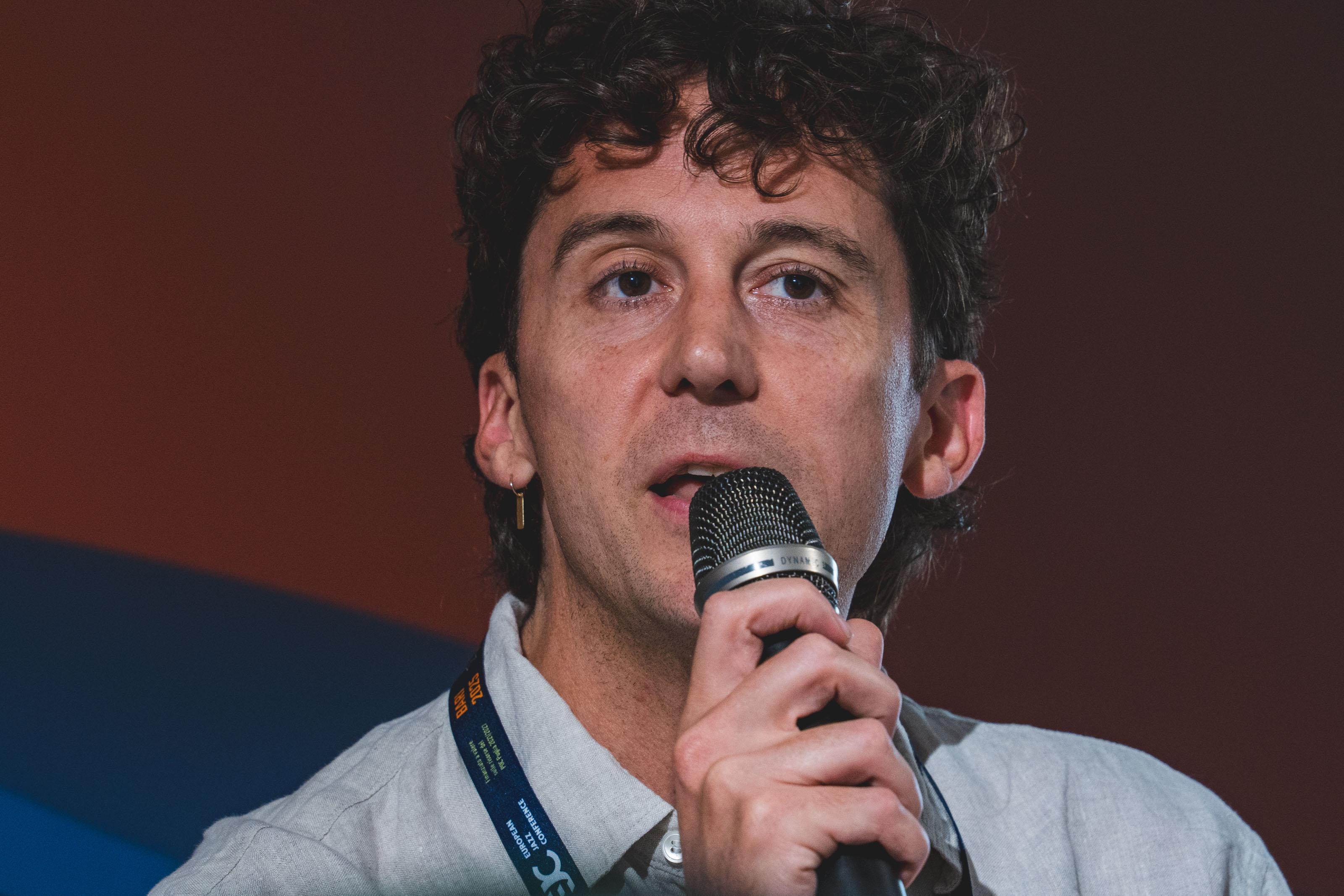
As Patrica stressed, promoters/curators present at this conference have the power to create communities, to create inclusion, to connect with audiences and to raise the next generation of musicians to have a greater sense of social responsibility. “It’s understanding that we have power, and then taking action with clear intention,” Patricia said. “I feel that is really important to say.”
In the Q&A that followed, somebody asked how often programmers stage an artist because of their politics. The answer from Patricia was “not so much.” Xavier replied that “it is not a criteria” but added that he has booked plenty of artists who he knows are confrontational and politicised, citing the examples of Angel Bat Dawid or Amirtha Kidambi, the latter who started a podcast about music and revolution. “As a programmer it can be a problem to present them, but they themselves take this risk… it is part of the music.”
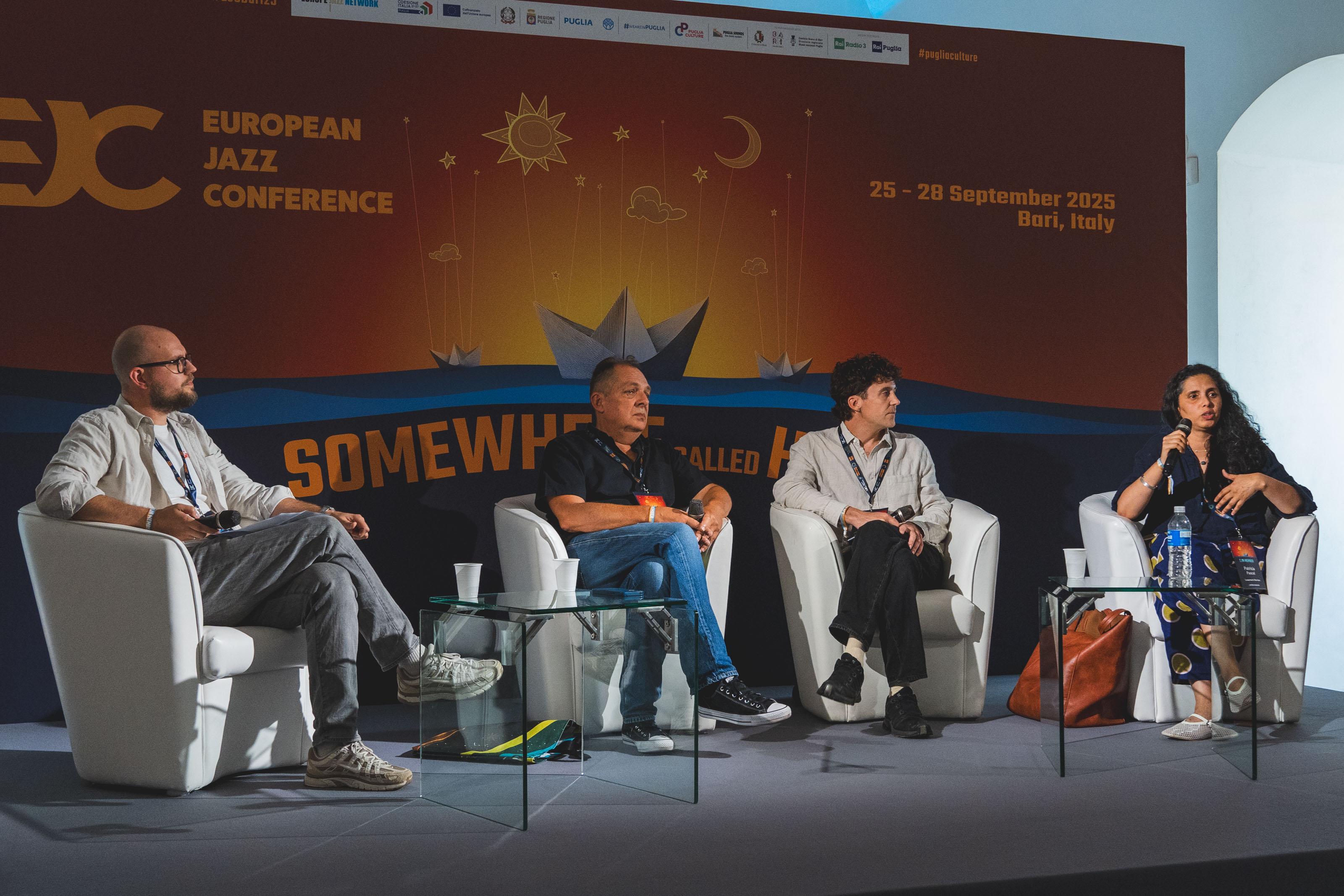
Xavier also said that jazz without words can be political, citing John Coltrane’s “Alabama,” and spoke of the fearless activism of Max Roach and Abbey Lincoln. The US Jazz Ambassador’s programme of the 1960s and 1970s used jazz as soft power. Protest and activism has always been part of jazz, Xavier said, adding the caveat that jazz musicians today take bigger risks. “Sometimes we use music to give joy, sometimes we use it as a weapon.”
In the open-mic section one programmer said that there was too much pressure on curators from all quarters to conform, to declare certain politics or to programme in a certain way. She expressed her desire for curators “to find our own language,” whether that be conservative or not, without fear of censure and criticism. “I don’t want to do what everybody expects me to do.” She called for more open-mindedness and less judgment. Marzio agreed that everybody should have their own line.
Roel Vanhoeck (BE) of arts venue Bozar, Brussels asked the panel if they make a distinction between the social and the political role. Xavier answered that it is not a question of left or right politics, but that the political role is the capacity for action on social change. Patricia cautioned that sometimes a curator’s projects—she gave the example of promoting social responsibility— can be interpreted by some as being political in aim.
Filippo Deorsola (BE) of recording studio/label Loumi Records suggested that when a public space is “negated politically” it is always in an attempt to “neuter or sterilise voices that could invest that space.” They recalled the grassroots anti-nuclear movement of the 1980s, integrated with feminist activism, as an example of politics operating radically outside the official channels. It reminds us, Filippo said, that we should be wary of defining where politics should be because then by extension we define where it should not be—a simplistic binary notion that they described as problematic.
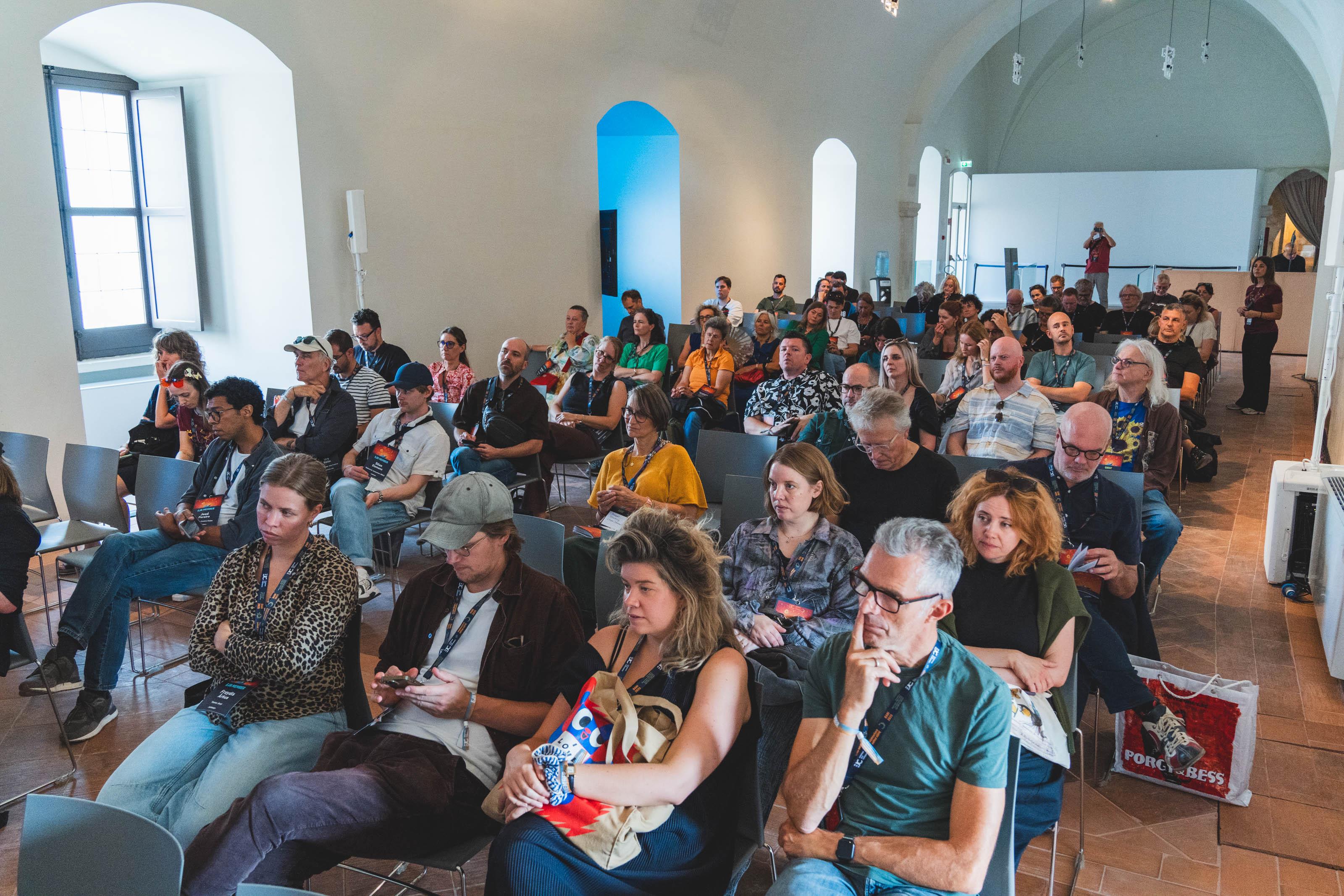
Dorotėja Būdaitė (LT) of the Lithuanian Jazz Federation cited the case of Russia and asked if it was possible for an organisation like the EJN to have a unified voice with what its members see as a red line in terms of programming. The question, like many at this conference, proved hard to answer clearly.
To the question posed by this author as to whether there should be a boycott of Israeli and Russian artists, the panel seemed to be in agreement that exclusion generally is not a good policy. With respect to Israeli and Russian artists specifically there are many grey areas. Xavier noted that cultural sanctions against South Africa during Apartheid had worked, “because it woke up South African artists, including White South African artists.” He then highlighted the pitfalls involved in boycotts by saying that Israeli film makers face a boycott by many industry figures in America, yet many Israeli film makers do not support Netanyahu’s policies. This issue demonstrated that the question of boycotting is too personal a question for each curator—and too complex— to talk about seeking a unified position.
Tackling the subject of stress and burnout in the music industry reflects just how common the problem is. The session was led by Rosana Corbacho (SP), a psychologist for musicians and people in the music industry. Rosana has worked for different record labels and in tour managing. It was when she saw friends and colleagues struggling, only to be told by doctors to ‘change jobs’ that she decided to take up psychology in order to provide help. Moderating was Alex Carr (UK), Programmer for the Cheltenham Jazz Festival, Contemporary Music Programmer/Producer for the South Bank Centre and freelance radio broadcaster.
By way of introduction, Alex said that people of all ages and in every sector of the music industry suffer from stress and burnout. She doubtless spoke for many in the industry when she said: “I feel like there is no 9am start time, no 5.30pm finish time in the music industry. It feels sometimes like it’s this 24/7, seven-days-a-week, a 12 months a year festival or show, or whatever…” She added that today we know more about mental health, about work-life balance, and she underlined the need to build safe structure into our lives.
Rosana pointed out that ‘mental health’ usually has negative associations, when in fact it refers to a general state of wellbeing. It is the connection between the head, the body and our personal relationships. The question to ask ourselves, Rosana said, is not, ‘Am I stressed or not?’ It should be, ‘How much tension can my body and my mind endure so that I am still active, and emotionally balanced?’
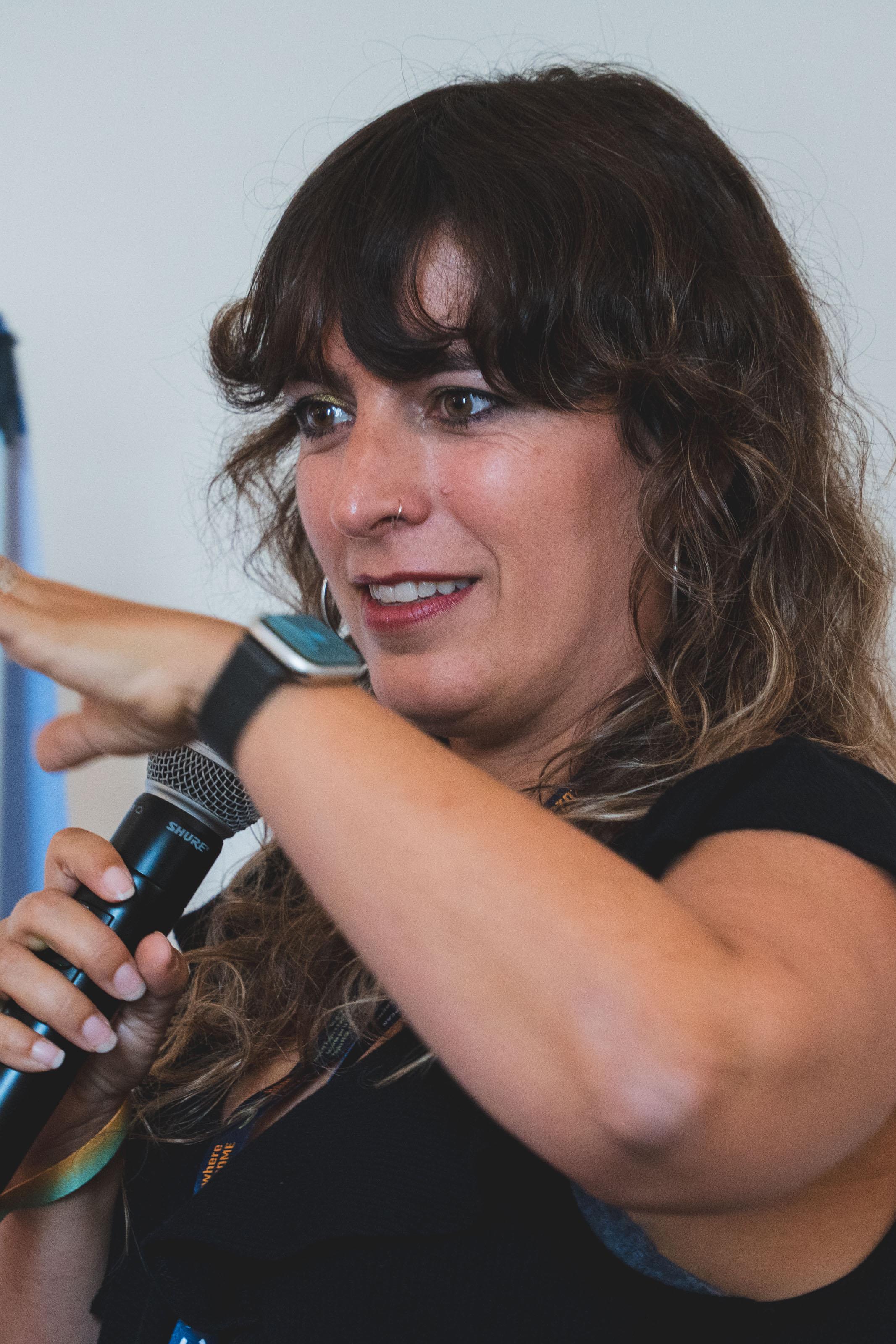
Opening the subject to the floor, Rosana invited people to share any experiences of stress or burn out. One person responded that to work in music you need to be passionate: “You need to be in this industry with all your heart, which means you cannot shut it off when you go home. Stress and burnout are not necessarily the long hours, but the lack of validation from above. You need to be valued.”
Two people spoke about having ADHD and ASD and how these condition can affect them. Rosana was quick to point out that the music industry is very neurodiverse and that she does not consider ADHD or ASD, for example, as disorders. Instead, they are different ways of perceiving the world and moving in it. If it is quite difficult for some people to express boundaries, for somebody whose boundaries are a way of working then for it to be called ‘a disorder’ might cause them to internalise and think ‘I need to push harder’—this can create extra stress, Rosana said.
One attendee said that it is not uncommon for music industry people to be dealing with a dozen projects at the same time. Inevitably, some will ‘fall from the table,’ he said. “I have learned not to try to catch them.” He asked Rosana how a therapist can teach someone to let things fall from the table, adding that nobody cares if you are “part of the circus” or not. “When you leave it is a very short period you are remembered. You are forgotten quicker than you think. It takes strength to accept a reality that is hard to accept for a lot of people,” he concluded. Rosana replied that it can also be stressful to watch someone struggling.
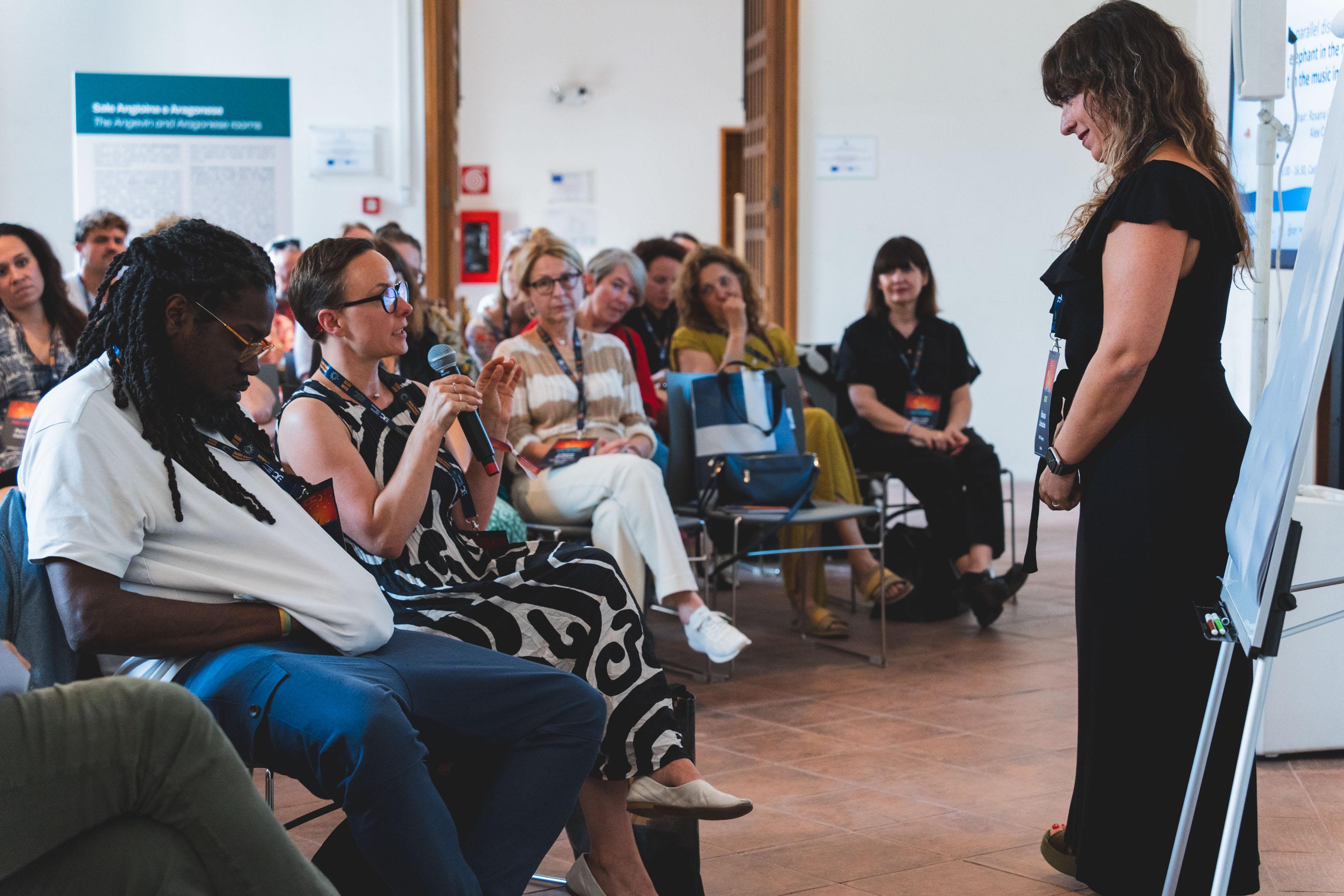
With the question open to the floor, Rosana asked attendees for their thoughts on the signs of stress in someone. The list included:
• anger
• manic activity “like a hamster in a wheel”
• forgetfulness
• making mistakes
• lack of concentration
• failing immune system, but still at work
• compulsive actions (biting nails, scratching)
• alcohol and substance abuse
To the question on the causes of stress and burnout, attendees spoke of the fear of failure and an inability to articulate it. The feeling of being on a conveyor belt with no career progression can be very demoralising for less senior staff in an organisation; they can feel tethered to more senior’s people’s vision without input of their own.
But as someone else related, the music industry is not a stress inducer in isolation from the rest of one’s life. Motherhood, running a house, moving house, being a parent or a caregiver—all can be sources of stress, and the effect is cumulative.
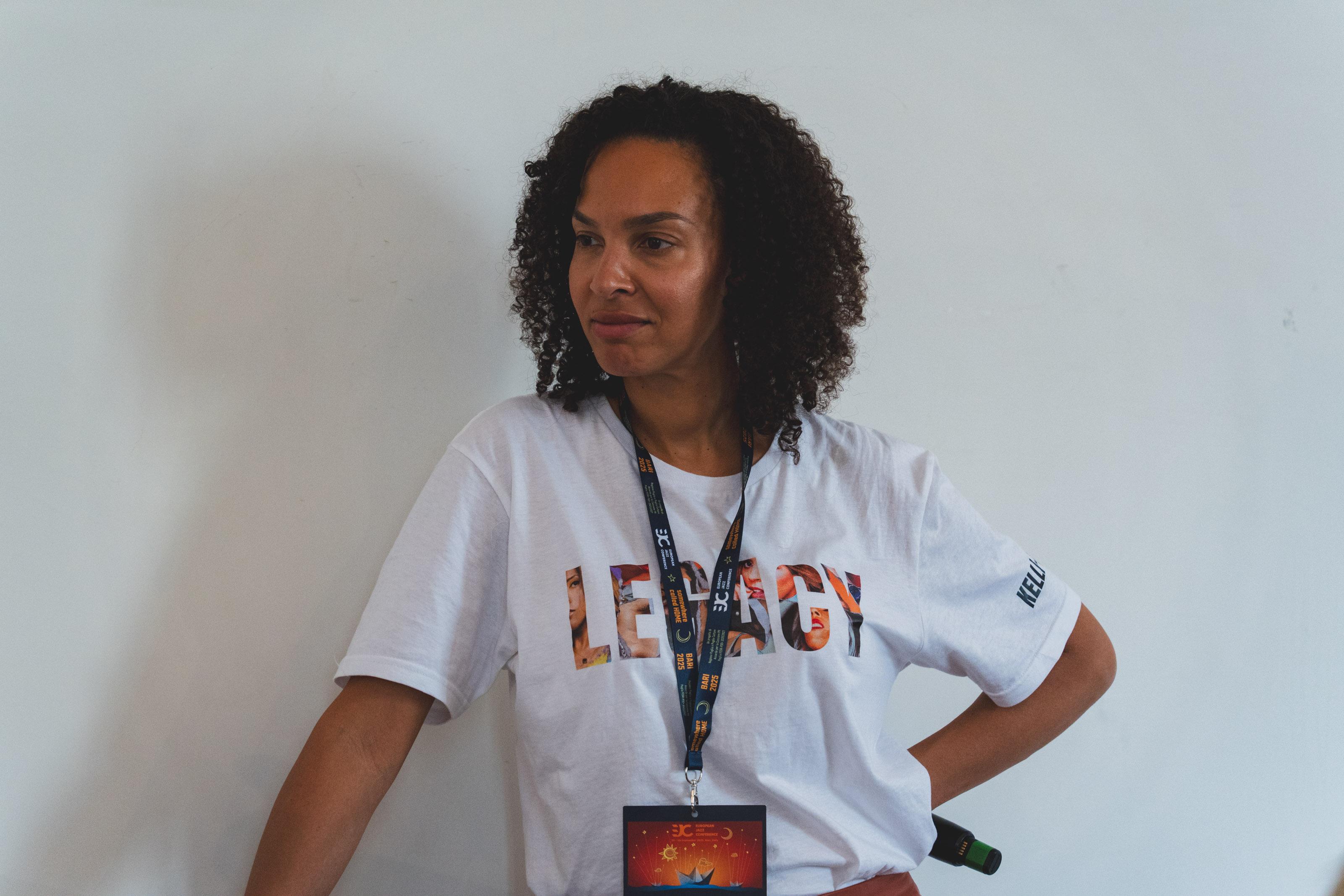
As for recognising one’s own signs of stress, attendees spoke of having headaches or stomach upset, or waking at 3.30am faced with what seem like enormous, insurmountable problems. Others mentioned stopping habitual exercise routines such as running because “I haven’t got time anymore,” or not being in the mood to socialise with friends. One person described the stress that goes hand in hand with social media obligations: “Social media is like trying to mind a toddler I didn’t ask for.”
Dividing the room into two groups. Rosana invited one to make a list of positive and negative coping mechanisms of individuals. She invited the second group to make similar lists but for group or teams.
Healthy coping mechanisms for individuals included drinking tea, having a bath, walking in nature, doing breathing exercises, sharing problems, playing with a pet. Negative coping mechanisms
included overindulgence in sport or political podcasts; binging TV shows; excessive social media use; eating trashy food; alcohol; unhealthy reframing of narratives; people pleasing.
The second group compiled the following coping mechanisms for groups/teams of people: socialising, laughing, check-ins on the group, dancing, stretching, encouraging each other, distributing tasks, make it ok to say no, celebrate success, go to the pub.
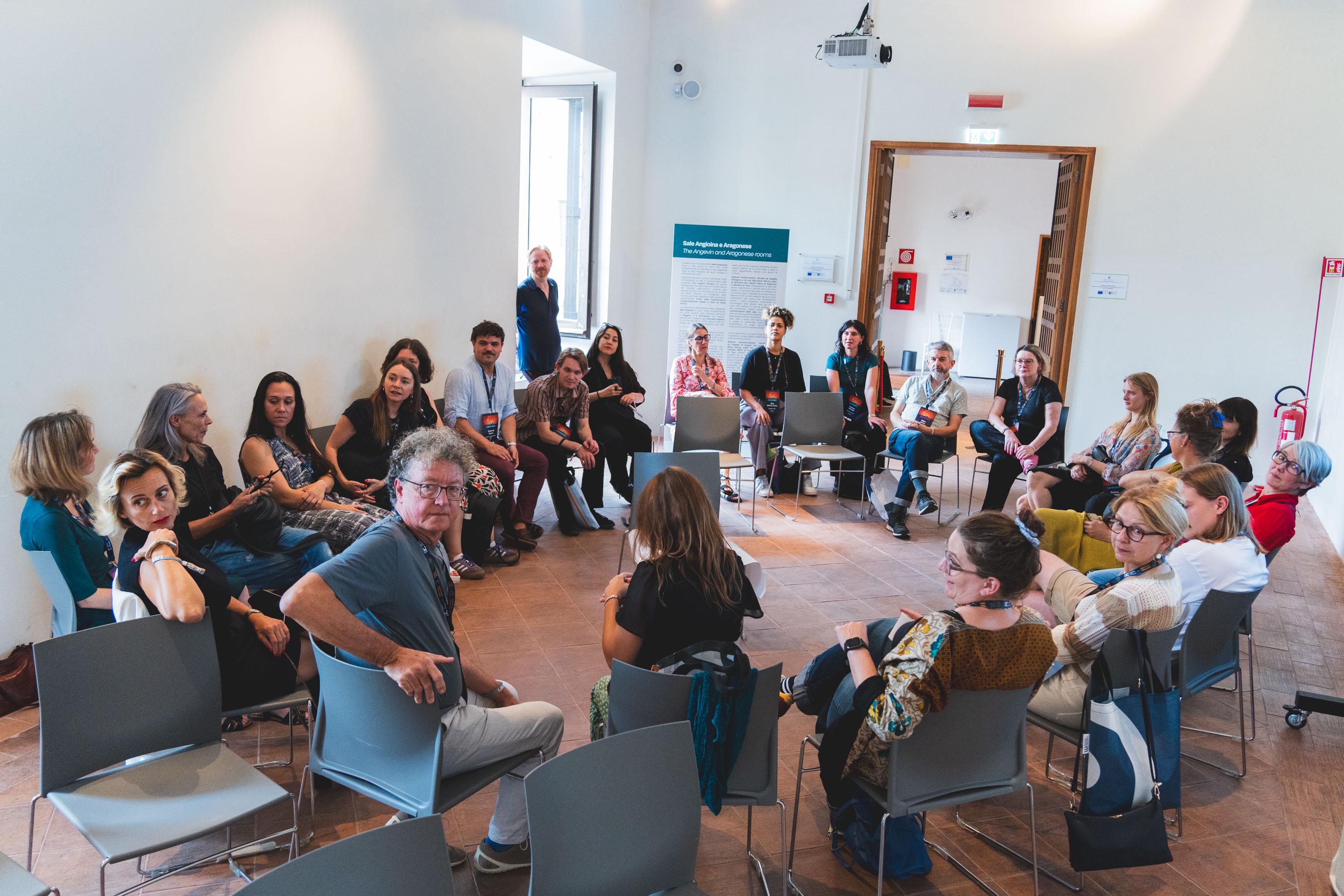
Unhealthy group coping mechanisms included arguing, not having enough breaks, saying yes all the time, making never-ending lists, giving negative feedback.
Rosana added that one of the most common negative coping mechanisms for stress is for people to actually work even more. She said that having structure in roles, and spending time with loved ones were two important coping mechanisms.
Phones were set to one side for a few minutes as Rosana then conducted a sensory awareness exercise where participants had to listen to external and internal sounds with their eyes closed. Awareness of body posture, heartbeat, tensions and pain followed. This stopping to be in the here-and-now brought an end to the session.
Earlier, Rosana had shared the good news that as of that very same day, a Master’s in Psychology and the Music Industry had been unveiled in Madrid’s Public University—the first of its kind.
#5 - Unseen faces/unheard voices: how to ensure migrant communities have a meaningful place in our programmes and organisations
Looking at practical ways in which EJN members have built inclusive programmes, this session asked how the music sector can include migrant communities in a meaningful way—not just on our stages, but in our audiences, teams and decision-making. The session was jointly led by Hashem Kabreeti (SY/NL) and Titia Bouwmeester (NL). Both work with Orchestre Partout, a musical community that promotes inclusion and multi-cultural dialogue. Titia is also the founder of 5eKwartier, which focus on issues such as food sustainability through immersive theatre.
Hashem began the session with a couple of warm-up exercises, including guided group improvisation using hands and body and sound—a technique he uses in workshops to promote connection, personal expression and creative collaboration.
He then spoke of the labels that others have assigned him. Born in Syria, his passion for music, theatre and human rights lent him the labels of ‘student’, ‘artist’ and ‘activist’. With the war he left Syria and found himself in Dubai, where he was given the number ‘16,432’. “I lost my name I was a number.” Later, in Lebanon, Hashem worked with kids from conflict countries in the region where he gave workshops. There he was labelled ‘Syrian’. Feeling he could not plant roots in Lebanon he
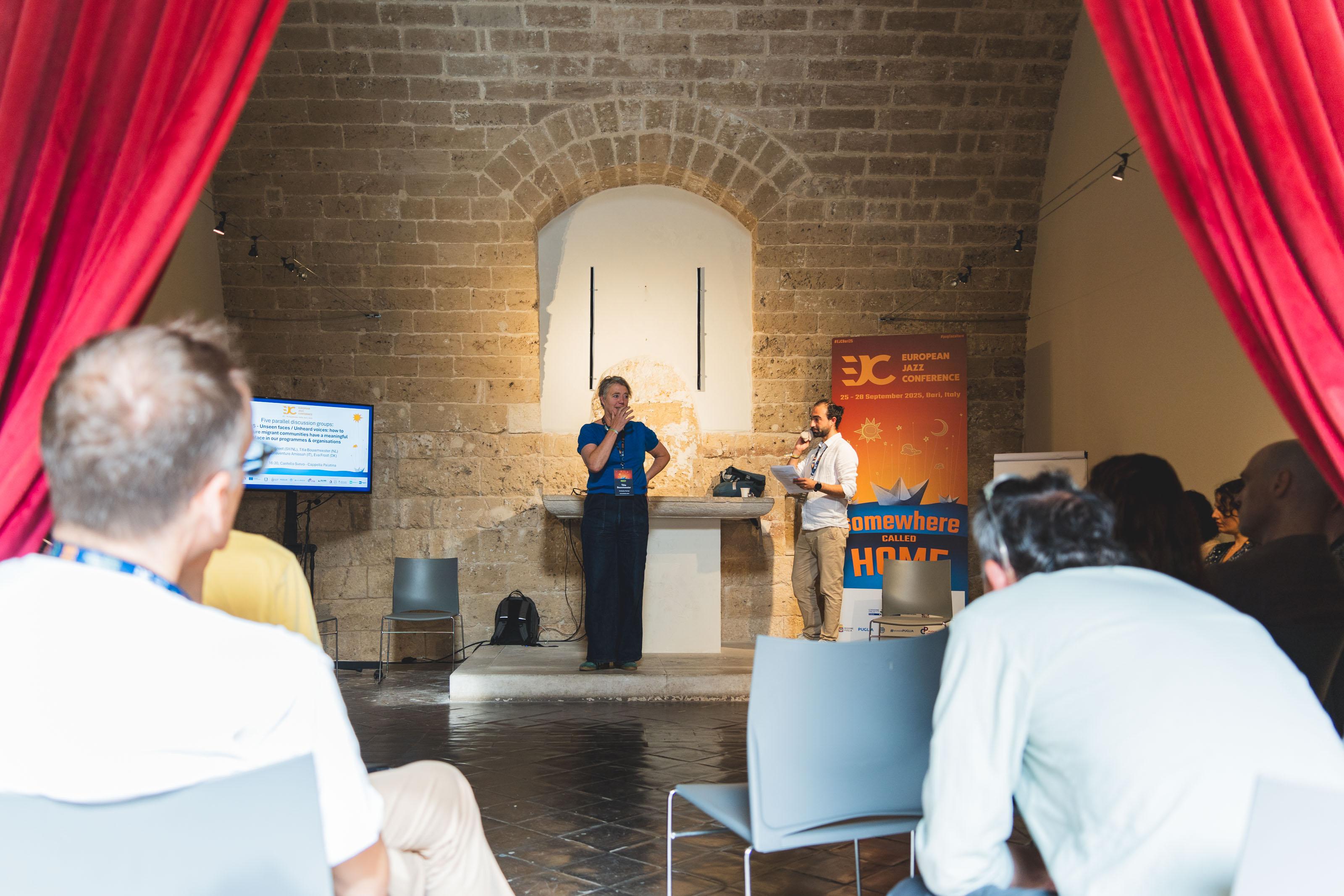
moved to the Netherlands where he asked for asylum. The new labels affixed to him were ‘asylum seeker’, ‘Muslim’ (which he is not), ‘refugee’ and ‘migrant’. After six years living in the Netherlands he still hears these labels.
By and by he found his way to the Orchestre Partout. “The only question they asked was ‘would you like to join us?’” Gradually, he became more integrated in Orchestre Partout’s projects. In 2021 Orchestre Partout started a group with the best musicians, mixing them with professional musicians and providing a platform. Hashem was manager of programme. This was in collaboration with Conservatory of Amsterdam and Bimhuis and took place three times a year. Eight musicians from the Conservatory and eight from Orchestre Partout rehearse for a day and then give a show in Bimhuis. Another project is the ÁMÀL Ensemble (amal means hope in Arabic) which unites musicians from Syria, Siberia, Mexico and France. It is supported for two years. The last label that Hashem was given was at the EJC in Bari—that of ‘guest’.
Hashem said that it is always a concern to find the right words when working with people who have come to The Netherlands for a variety of reasons. The musicians, whether from the Partout Orchestre or the Conservatory are treated equally, including pay, for example. “We try to create ownership and belonging.” Though Orchestre Partout works with both large and small groups, in smaller groups it is easier for people to have a voice, Hashem said. Meetings are held twice a year where, in a sociable environment, people talk about their experiences and their plans.
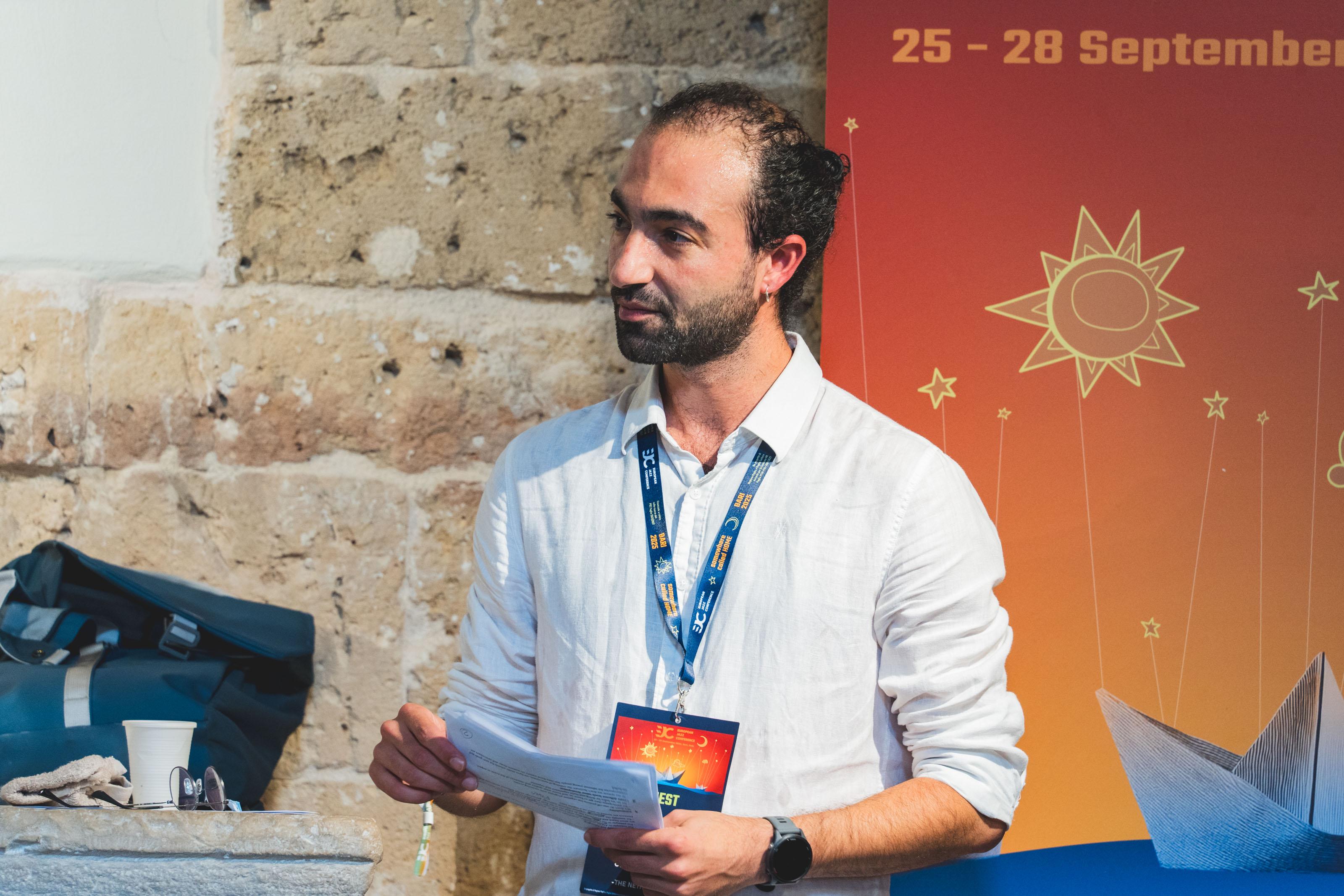
One-off projects are avoided as when they finish it can have a negative effect. Therefore, sustainable projects have more positive impact. Different levels of musicians are organised into appropriate groups, but even if a person has never played an instrument in their life there is space and inclusion for them as well. From jam to labs to the band, the process is ongoing. “People are not just invited to perform. They are part of the programme and part of the organisation.”
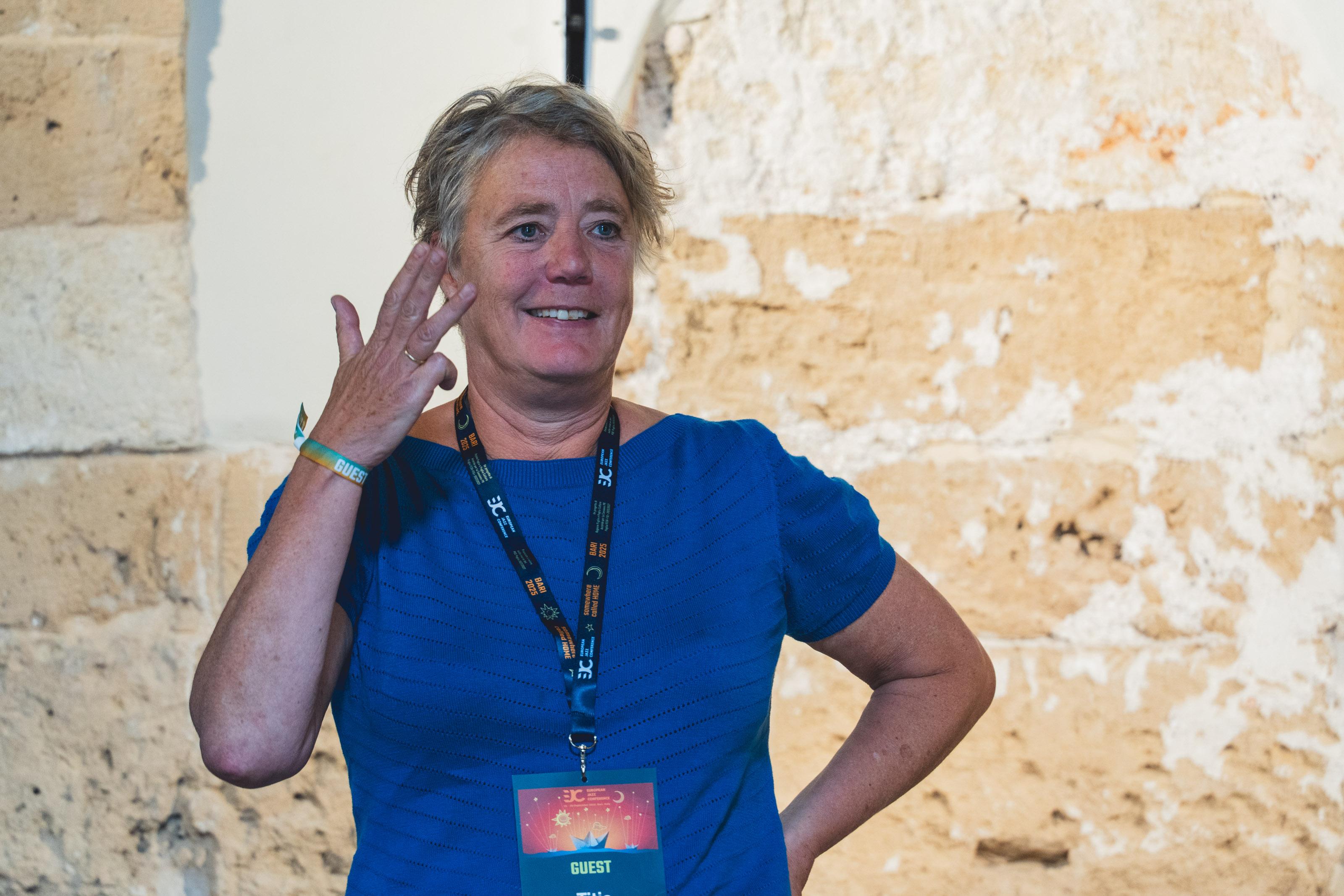
Hashem invited attendees to consider the degree to which their organisations include migrants. A number of examples of migrant inclusion arose: Stefano Zenni (IT) spoke of EJN’s involvement with the Torino Jazz Festival that brings music to African migrants of the Senegalese community, thanks to a relationship between the association of Senegalese immigrants and a club. Stefano admitted that it is a learning curve and that the aim is to include such migrants in a more active way. At the same time, the festival brings the music to a network of venues for people with difficult lives, including the homeless and those in prisons.
Miloud Guiderk (NO) shared the story of Cosmopolite Scene, an Oslo music venue. Since 1992 the club has actively sought to make its space a multicultural one. From the beginning, Cosmopolite Scene has been a meeting place for people of minority backgrounds. Part of the reason for this, Miloud explained, lies in the inclusive programming.
Apart from Norwegian artists, and a strong connection with jazz, Cosmopolite Scene brings artists of different genres from all over the world—Nusrat Fateh Ali Khan, Orchestre National de Barbès, Astor Piazzola, Alireza Ghorbani, Gilsons, Ali Farka Touré, Cheikha Rimitti, Mulatu Astatke, for example, have all played at the venue. Such a cosmopolitan programme reflects Oslo’s multicultural identity—with migrants making up nearly a quarter of the city’s population—and encourages multi-cultural audiences.
Francesca Cerretani (IT) then introduced Koblan Amissah (IT), Artistic Director of the Festa dei Popoli in Bari, an intercultural festival held each May that celebrates cultural diversity. Koblan a migrant from Ivory Coast works tirelessly to promote cultural interchange, African culture and solidarity. Koblan is also founder of the Abusuan Intercultural Centre in Bari. Speaking in Italian, with translation to English by Francesca, Koblan said that migrants are often framed as being a problem for society. In 2003 he and some collaborators decided this narrative needed to be tackled.
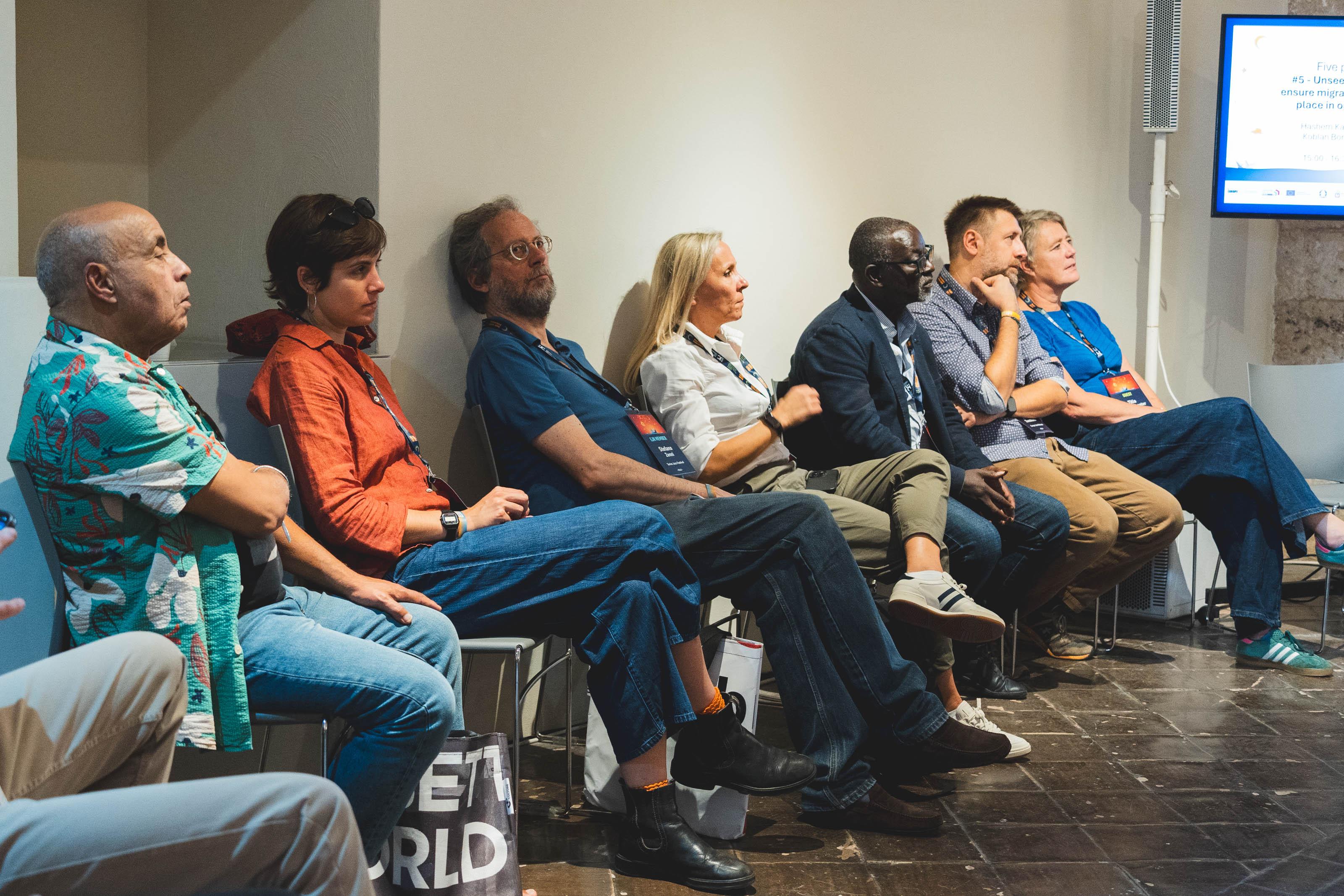
They began to think of ways to promote, in a positive way, migrant communities in Bari and beyond. They wanted people to meet without thinking about their origins. The aim was not to do something “for” people but to do something “with” people. They wanted to avoid a straightforward music festival where artists come, play and leave, preferring instead a participatory initiative of the people themselves. Each community—numbering over forty associations— can propose its own idea for inclusion. The final programme is decided democratically by vote.
The Festa dei Popoli is a three-day celebration for people of all ages where they can dance, listen to music and poetry, participate in workshops and enjoy international foods. They also organise workshops with students to illustrate how music is a way of communicating, and collateral events promote the environment and address recycling, for example. The posters for the Festa dei Popoli are designed by students of the graphic school in Bari.
The 21st edition of Festa dei Popoli in May 2025 attracted over 22,000 people over the weekend. “It is not our own festival,” Koblan said, “it is a celebration of the city.”
An Italian reminded those present of the day in August 1991 when a boat arrived in Bari carrying 20,000 Albanian migrants. They were put in the football stadium. The Albanian became the symbol of the migrant in Italy. Thirty plus years later, Albanians are integrated into Italian society to the point that nobody remembers the events of August 1991. The speaker mentioned the book L’orda: Quando gli immigrati eravamo noi, by Gian Antonio Stella, a thought-provoking study that challenges racist narratives and myths.
With regard to inclusive audiences, it was generally agreed that the more diverse the programming the more diverse the audiences tend to be. However, there was also agreement that the make-up of the audience is the area over which the programmer has least control.
Someone from Bimhuis (Amsterdam) acknowledged that the expense of tickets can exclude some migrant groups from attending events, and when tickets were free their numbers increased. Being more specific in what you present in your venue or festival can also attract specific migrant communities. Francesca reminded everyone that the success of Festa dei Popoli is because they do not create a programme “for” an audience—they create a programme “with” the audience. Another idea from the floor was to ask migrant communities to propose a project and the promoter will find a suitable venue or a suitable stage in a festival.
Hashem then addressed inclusion in organisations and partners. He invited Eva Frost (DK), the head of JazzDanmark, the National Jazz Organisation in Denmark, to share her thoughts. The organisation has been working on inclusion since 2015. They identify the criteria they want to work with for a given project. Eva gave an example of a way of changing one’s mindset on more than one parameter in a given project. She spoke of the so-called 70/30 concept where you keep an eye on the majority instead of the minority. She cited the Danish Jazz Award where a jury of nine has to choose the winners of seven awards from 200 albums. They defined their own diversity criteria for the awards—gender balance, geographical location, ensemble size and ethnicity, for example. There should be no more than a 70% majority in any category. So, if 8 out of 10 albums nominated were by male artists the jury had to go back to the drawing board again in search of the 70% majority threshold. Another suggestion from the room for an additional diversity criterion was that of independent labels.
With specific regard to working with migrants in asylum centres where there can be many different languages, someone said that jazz has a distinct advantage as an improvisational language where words are almost not necessary at all to communicate.
In conclusion, Koblan made the pointed that integration is a very slow, long-term process. In our societies there is a need for more emphasis on education and awareness of migrants, their context, their conditions and their contributions to society.

#1 - Meet your fellow members: Speed Dates (for EJN members only)
With membership of the Europe Jazz Network increasing year upon year this session afforded new members the opportunity to meet a large number of established EJN members—festival directors, venue owners, agents, managers and representatives of national support organisations—in a relatively short time frame. The healthy attendance also suggested that this speed dating format is of benefit to everyone, offering the chance not only to advertise one’s projects, but also the possibility to establish working relationships. In a conference attended by 400 people it is possible to go the whole weekend without seeing some colleagues, never mind holding meaningful conversations: for this reason the speed dating session enabled multiple meetings of a focussed nature. Feedback on its usefulness was overwhelmingly positive.
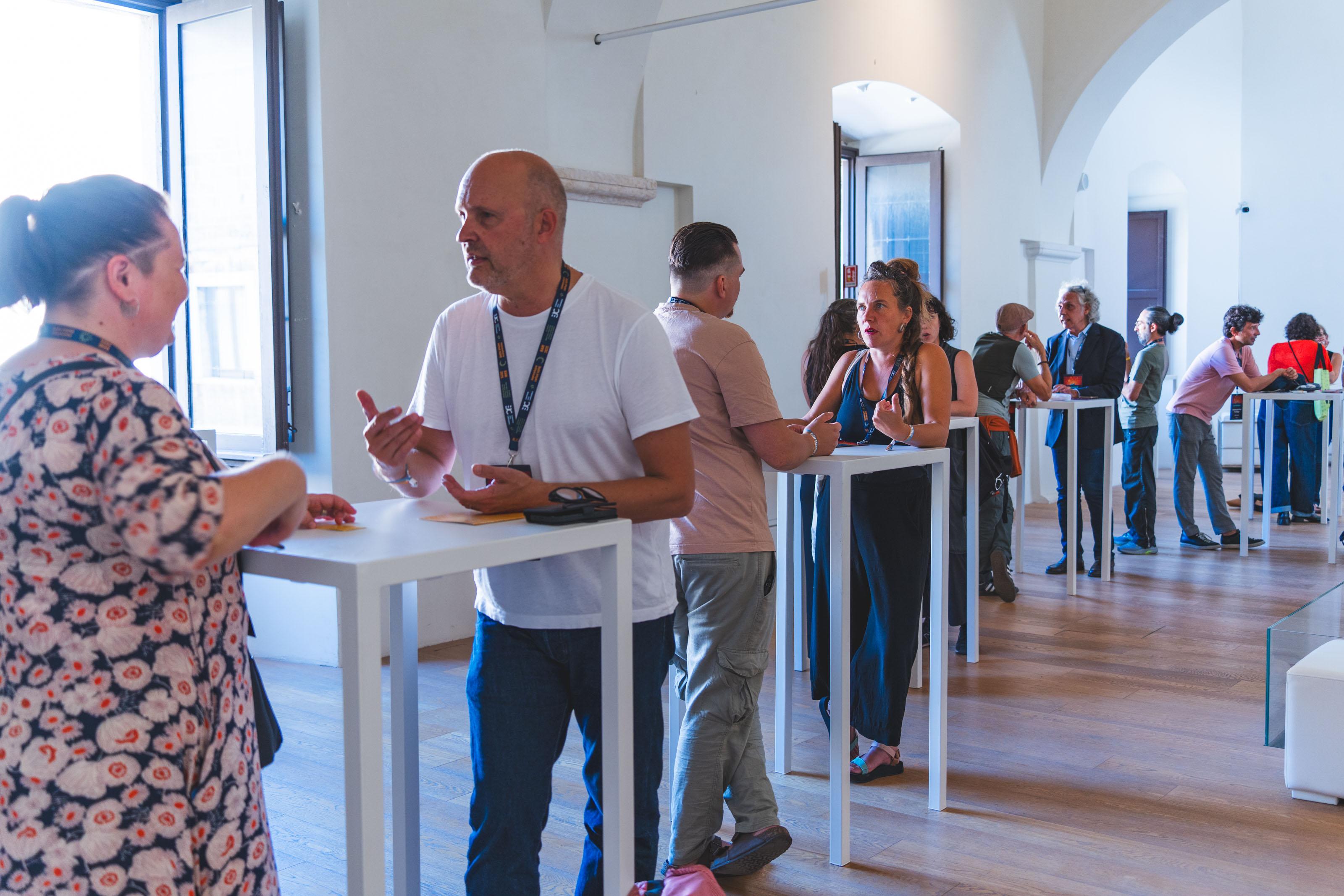
#2 - Good vibes only: How do we define and prevent unwanted behaviours and create welcoming spaces in our festivals and venues?
This session dealt with the issues relating to problematic behaviours such as harassment and sexual harassment and how to prevent or challenge it. The moderator was Eivind Breilid (NO) of Balansekunst (The Art of Balance, in English), an association with 250 member-organisations throughout the cultural sector in Norway. Balansekeunst is dedicated to safer and more diverse working environments through its training, guidance and advocacy programmes. This session on an important subject was the first of four scheduled by EJN.
Eivind set an inclusive tone from the start by saying that good work on this subject can be achieved even if we share differing opinions. “Art and culture need diverse perspectives,” he said. “That is the way to create better art and better culture for everyone—when we can choose from all the talents that exist in society.” To this end it is necessary to identify the barriers that prevent some people from accessing the arts. The first question to consider, Eivind proposed, is who feels at home in an arts and culture space, and who feels like they are visiting?
Sexual harassment has been an insidious culture within the culture industry for a long time. Prevention of sexual harassment and awareness of the issue has been a big part of Balansekunst’s work since the #MeToo movement. Figures from Norwegian surveys on sexual harassment in the workplace between 2016 and 2023 indicate that the percentage of women suffering sexual harassment has risen. This rise can in part be explained, Eivind said, by greater awareness of the different behaviours that constitute sexual harassment.
Europe-wide statistics for women who experience non-partner sexual violence reveal that the Nordic countries are the worst, though Eivind rejected this information on the grounds that the figures (showing almost a quarter of Nordic women in 2024) reflect greater awareness of the behaviours than many other European countries where the issue is perhaps less of a national topic of conversation. In the Nordic cultural sectors one third of women surveyed had suffered sexual harassment during their career.
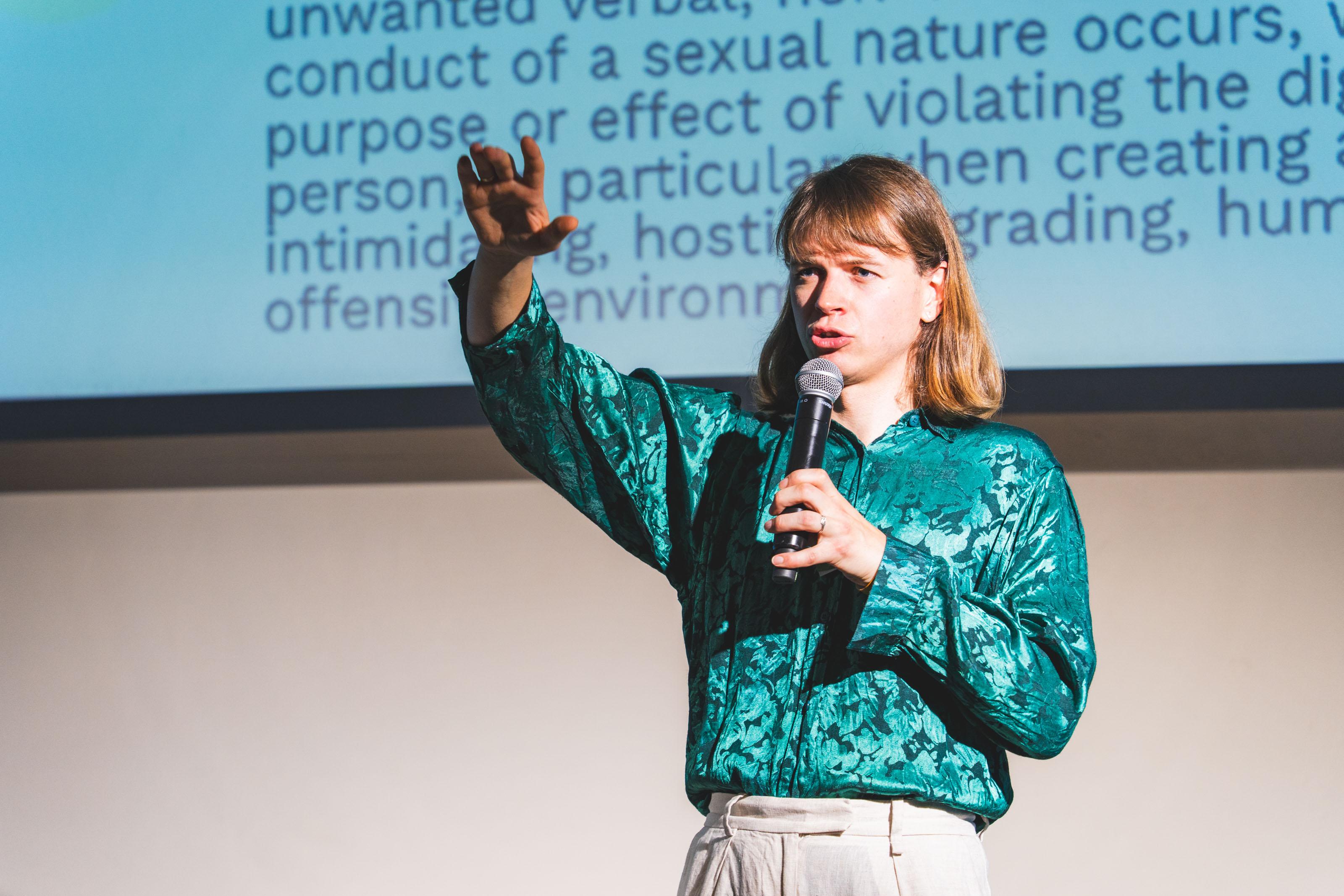
Eivind then presented three different cases and asked the attendees to discuss whether harassment had clearly taken place or not, or whether there was a grey area. These cases on queer identity, repeated unwanted physical contact with a colleague and the sexualising of a pop artist to sell more records, raised the question as to how to challenge unwanted or uncomfortable behaviours. Lack of knowledge about what constitutes sexual harassment can be a barrier to confronting unwanted behaviours.
There are some official barometers. The EU Gender Equality and Discrimination Act goes into some detail on definitions of harassment and sexual harassment and covers verbal and nonverbal acts that are coercive, intimidating, degrading, humiliating, offensive or threatening. The key word, Eivind said, is “unwanted”—any act that crosses that threshold can be harassment or sexual harassment, for example, an unwanted massage from another colleague. Other key aspects include “purpose” and “effect.” The purpose of an action or speech may be innocent, but the effect may be very upsetting or distressing. EU law, Eivind stated, is on the side of the targeted person.
If power relations figure in a case of harassment then this can be much more difficult for the person being harassed to deal with. Power, which roughly means “the ability to get what you want”, can be seniority within the organisation—economic, experience, education, job security, charisma, age etc.— and can be very positive in its application or just the opposite.
At this point, Marieke Meischke (NL) of Jazz Maastricht—who is training to be a confidential counsellor—addressed the point of “purpose.” She said that many people who harass others do not do so on purpose. They might see their actions as harmless, something that is cause for alarm. Perception is an important aspect of harassment cases. Counsellors can also find themselves representing a person accused of a charge that they do not understand because it was perhaps far from their purpose.
One of the aims of addressing harassment through presentations like this one, Eivind said, is to enable the harassed to diffuse and deter unwanted behaviours with a few simple educational words. This can engender better understanding and sensitivity going forward, which, in less serious cases, might be a far more productive alternative to disciplinary hearings or more serious investigation. Education, awareness, sensitivity and determent are key. “Very often it can be solved with a simple conversation,” Eivind said.
The main source of power, Eivind said, is being in the majority, or being in a privileged position. This means everything from being able to walk up a flight of stairs or being able to hear a conversation in a crowded room. Being in the majority can mean not having to explain your name, ethnicity, religion, nationality, sexual identity or gender. It can mean understanding a language,
being able to read a text or feeling a sense of belonging in a space (a city, a venue, a restaurant, an art gallery), a theme that had also arisen in the session on inclusivity the day before.
Being in a marginalised or minority group in itself makes harassment and sexual harassment more likely and might make experiences of harassment or sexual harassment feel graver, Eivind explained. Eivind then asked the group to discuss their reactions to these ideas.
Areas in the cultural industry that can lead to risk of harassment/sexual harassment include:
• Commissioned work
• Alcohol
• Blurring of boundaries between work and personal time
• Fluid roles
• Art that challenges norms
The point is not to forbid alcohol, for example, but to create guidelines and safety nets. How do we make workplace environments safer? A partial list includes:
• Awareness of the issues and the boundaries
• Formal frameworks for guidelines, feedback and complaints
• Mapping risks
• React in appropriate ways (interpersonal skills)
One suggestion for an addition to the second list is to appoint an external counsellor, a service which Balansekunst already offers via a helpline. This helpline provides access to lawyers who will advise anyone reporting harassment, anyone who feels wrongly accused of harassment, and any leaders who are handling a case within their organisation.
There will always be grey areas, Eivind admitted, but we can make the work environment a safer, more equal and more welcoming place by working towards equality, recognising the barriers that some people habitually face and trying to remove them. In addition, it is important to establish good working practices that inform staff about inappropriate behaviour and that train people how best to respond in such a situation.
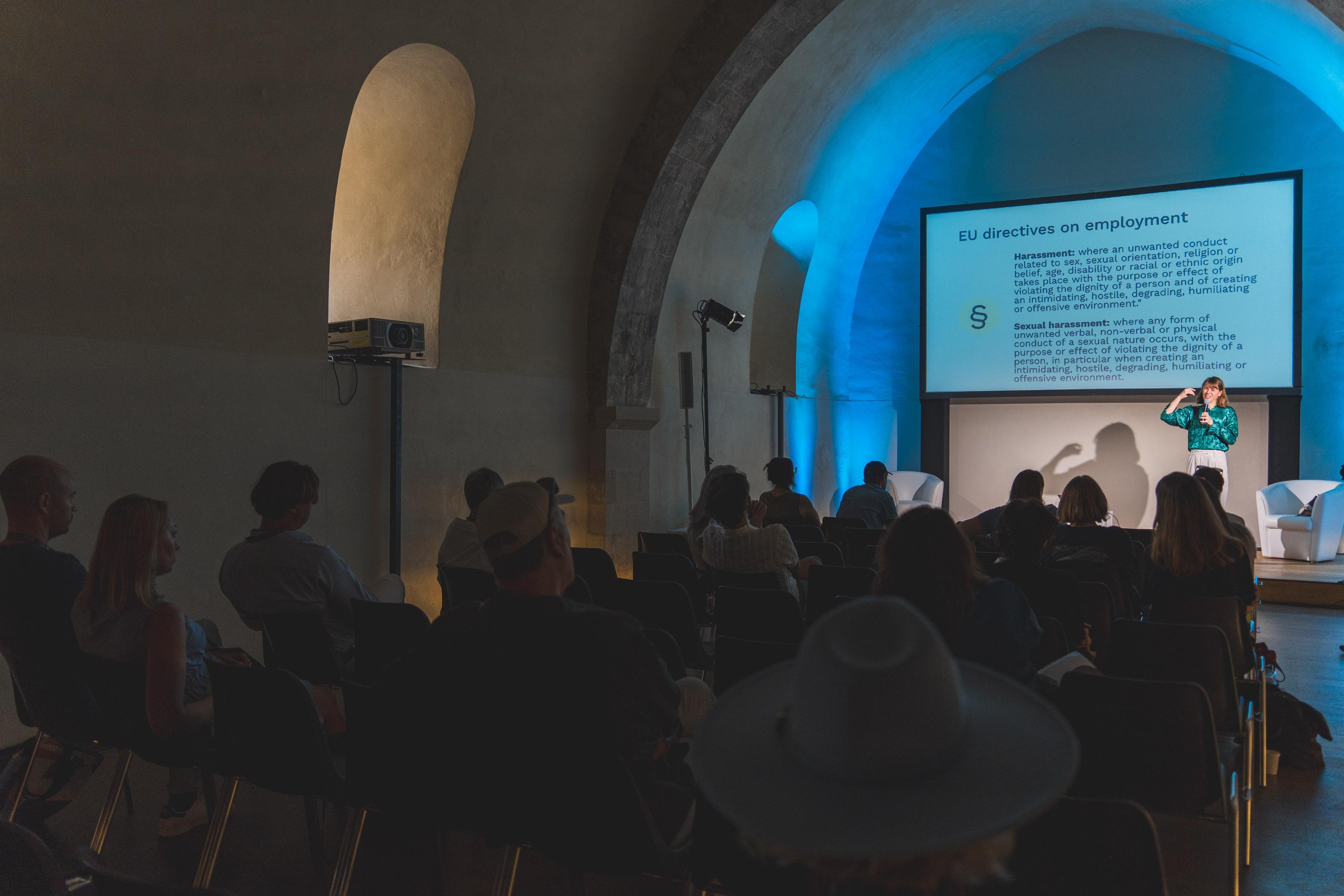
In the brief Q&A that followed, one attendee highlighted the sometimes significant cultural differences between countries, and the importance of being aware of this when working with foreign artists.
In conclusion, Eivind invited attendees to feel free to visit Balansekunst’s website (balansekunst.no/en) to make use of its checklists, templates, forms and tips. Online courses are also available for any organisations interested in improving their workplace culture.
Emmanuele Fontoni (IT) of Macerata University, Italy, presented this session on generative artificial intelligence. In other words, AI tools that can support—and not replace—the creative music sector. Giambattista introduced the session, explaining how the EJN has a multi-year project on AI with the support of Creative Europe. This project includes international webinars with festivals and organisations, as well as the creation of an AI prototype for potential use by EJN members. He then introduced Emanuele Frontoni to the room.
A decade ago, Emanuele began, only computer scientists were discussing AI. Today a great number of different disciplines are part of the conversation due to greater democratic access to the tool that is AI.
With the aid of AI-generated photos, Emanuele invited attendees to discuss the ethics around the generation and public domain use of such images. Copyright is the main issue. If an organisation publishes an AIgenerated image then it must flag it as such. It is a widespread practice to share eyecatching AI-generated images on social media platforms, Emanuele said, though there is still very little general awareness or concern about copyright infringement. Transparency and ethics, he said, are very important.
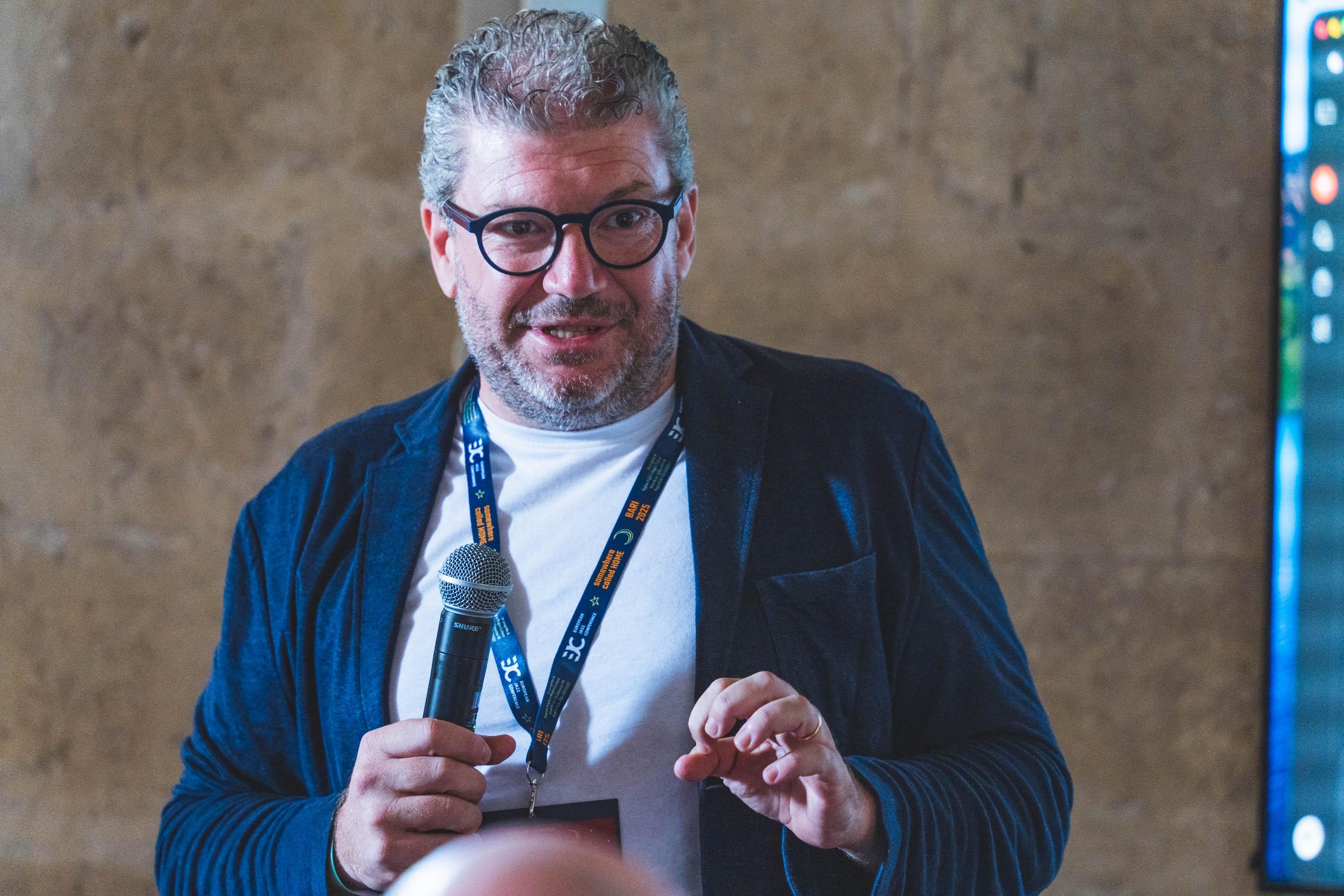
Emanuele then spoke of Photomath, an AI tool that solves complicated math problems. It is highly popular with students. The problem is that this Z-generation “is totally inside the idea that we can use automatic systems” instead of attempting to solve these problems with their own brainpower. The dilemma is not with the technology itself, but with how we use the technology.
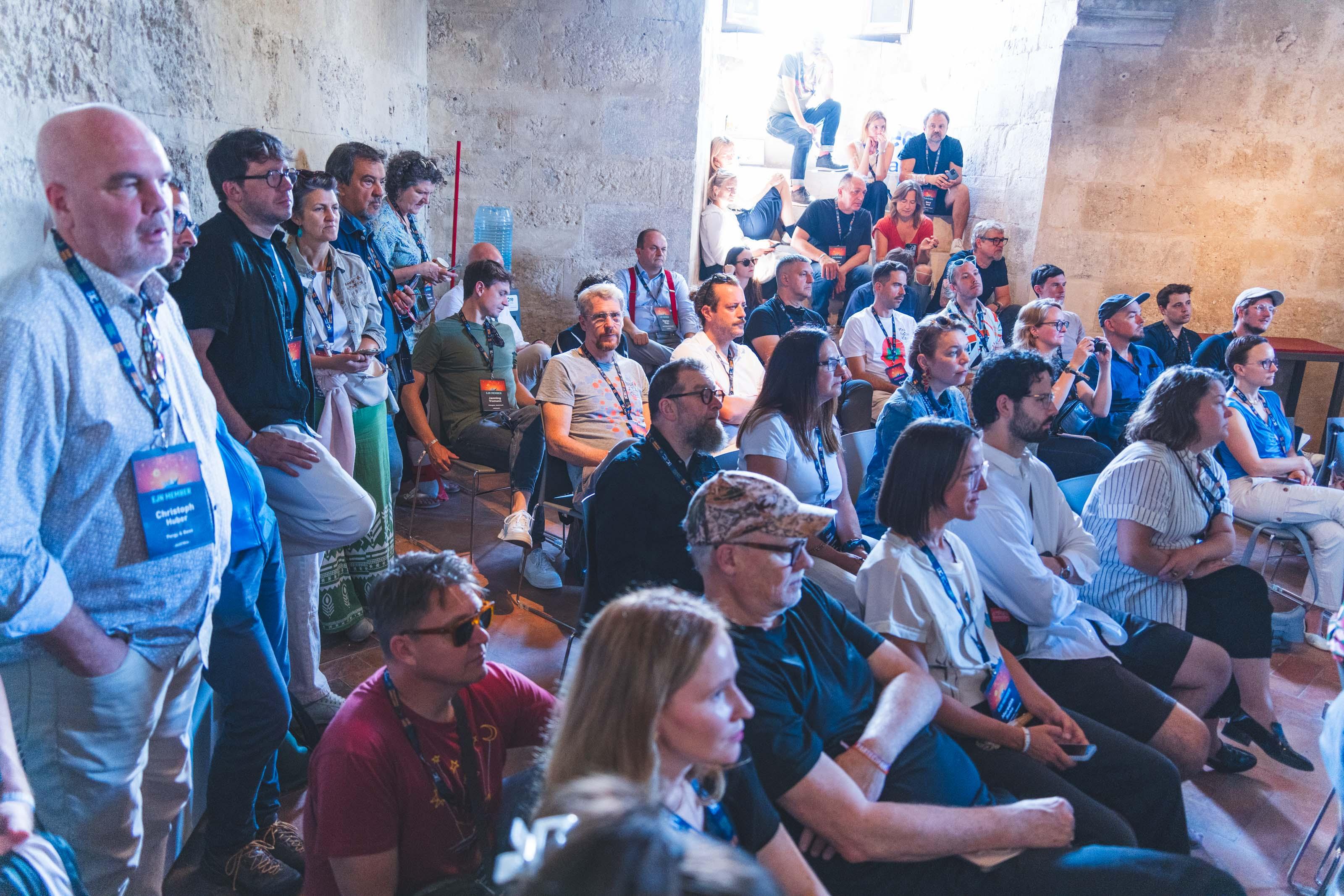
AI is not something entirely new. The first mention of the term ‘Artificial Intelligence’ dates to the Dartmouth Conference of 1956. It was predicted that a computer would beat the World Chess Champion by 1968. This did not happen until IBM’s Deep Blue computer defeated Kasparov in 1997. Today, Smartwatches have the same computational power as Deep Blue. Iphones have many more times that power. The point, Emanuele stressed, is that a lot of the more pessimistic predictions about AI taking over everyday jobs from humans is not based on any science. He urged people not to fall prey to social media scaremongering in this regard.
The talk turned to Large Language Models—or artificial intelligence algorithms such as Claude, ChatGPT, Nano Banana and Mistral. Emanuele then demonstrated a Large Language simultaneous translation tool. Speaking spontaneously in Italian, the AI tool in question transcribed his words, with only fractional delay, on the screen. Emanuele’s words were transferred via his computer to Dublin where they were translated. Reading in English, the
transcription then appeared in real time in Hindi. Humans are behind the technology, he underlined.
To Claude, Emanuel provided a simple prompt to write a newspaper article on the EJN in Bari. In seconds, Claude returned a vast amount of information, both on the EJN and the EJC. However, such LLM’s are not error-free; they can create ‘hallucinations’, or in other words, errors that a human would never make because the AI algorithm has no semantic knowledge. “It is a huge problem,” Emanuele said, “Because no one of our systems is free of errors.” He added, “This is one of the mistakes we make about IA—it is not creation, it is replication.”
With NotebookLM, having given it access to the EJN’s website, the tool produced a totally believable podcast with male and female protagonists debating the raison d’etre of the EJN. Nobody owns copyright on the AI-generated voices. The same is true for AI-generated music and images, unless you ask the LLM to recreate an image of a copyrighted brand like Superman, or Coca Cola.
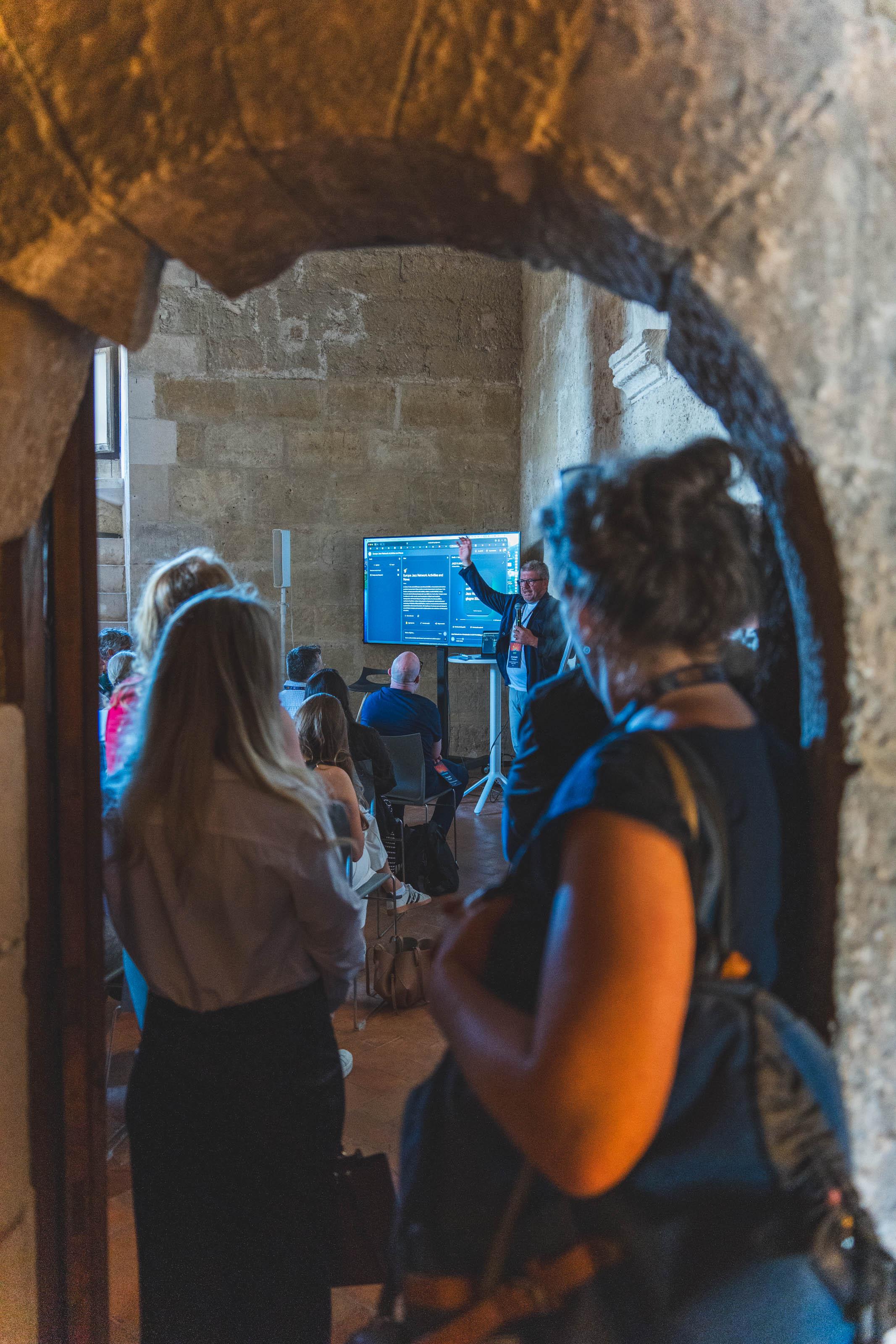
Emanuele demonstrated the capabilities of other LLM’s to superimpose a person onto an athlete in a basketball game, to create music in a particular style from simple information prompts, or to compose emotional soundtrack music. If you use AI-generated material, or even partly generated, it is ethical to post a note acknowledging the AI source, Emanuele said. This is called Content Credentials.
The AI Act, a European regulation asked all organisations to undertake AI literacy and training. By June 2026 every European organisation will be obliged to outline its guidelines in its use of AI. Therefore, AI literacy is essential, Emanuele stressed, otherwise “we can make a huge amount of disasters in our organisations.”
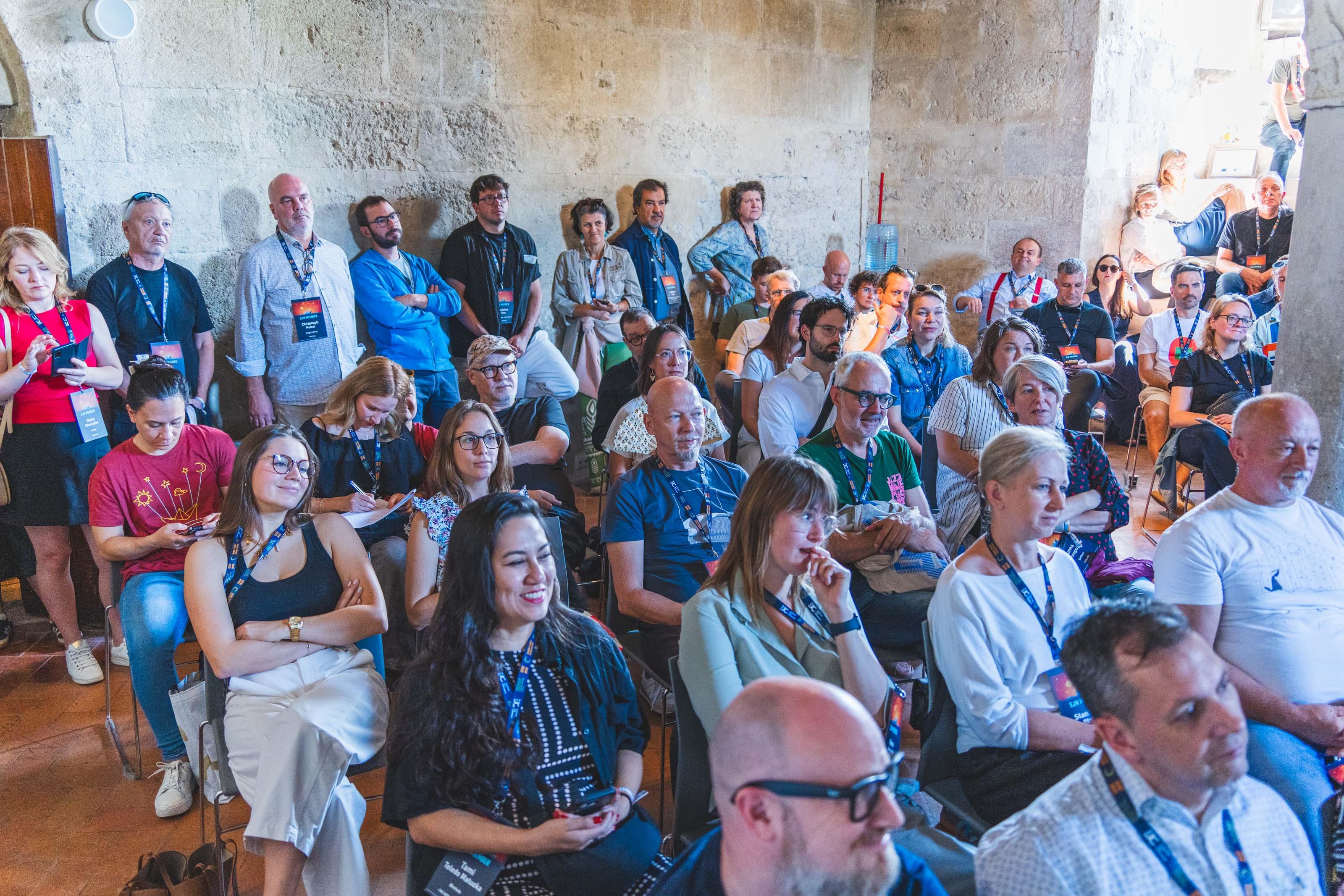
Battista then invited François Matarasso (FR) to talk about the Amplify project. François began by saying that AI is just one of the many digital tools transforming how we work, but the change is coming very fast. Amplify is a consortium of fourteen universities, technological institutions and cultural organisations (including EJN) to better manage this change. Its three-year project aims to develop tools to improve the existing technologies in on-line teaching and performing; this would be of particular benefit for students in remote regions.
Another tool aims to make more immersive live music experiences but using spatial audio and immersive video technologies to give people more of a ‘live’ concert experience when they are not there, for whatever reason. The project is currently working towards producing prototypes. European control over the project is important, as are the European ethical controls, François said. Essential too, he stressed, is for equal focus on training, development and support to the
humans using this technology. If not, we will always be at a disadvantage, he cautioned. Finishing on an optimistic note François said: “It is an uncertain world…but we are able to come up with new solutions all the time.”
Emanuele then played an uplifting video on Voice For Purpose (voiceforpurpose.com), a consortium to allow communicator manufacturers to replace speech synthesisers (used by people with Motor Neuron Disease, for example) with expressive voices. In conclusion Emanuele said: “The message is: we can adapt, we can change, but we need to have the mindset to use this kind of technology in the proper way, in a positive way.”
Best practices was the principal theme of discussion in this session that brought industry programmers and artists’ agents and managers together. The session was co-moderated: Sylvain Elie (FR) is the director of jazz club Le Petit Faucheux. Located in Tours, Le Petit Faucheux programmes around 60 concerts and a free festival between September and June; Malwina Witkowska (NO) is an agent and manager who runs the agency No Earplugs.
The session was divided into three distinct sections. The first addressed challenges and common misunderstandings. The second focused on building trust between agents and promoters. The third was about fair practices and how everyone can better collaborate.
Malwina opened the session to the floor with the question to programmers: what do you need to work better with agents? Sylvain mentioned the feeling of being overwhelmed by emails, adding that short, concrete information is best. Consistency in dealings is also important. “It is about building long-term relationships.” Sylvain added that not replying sometimes is not about being disrespectful, but about the ability to cope.
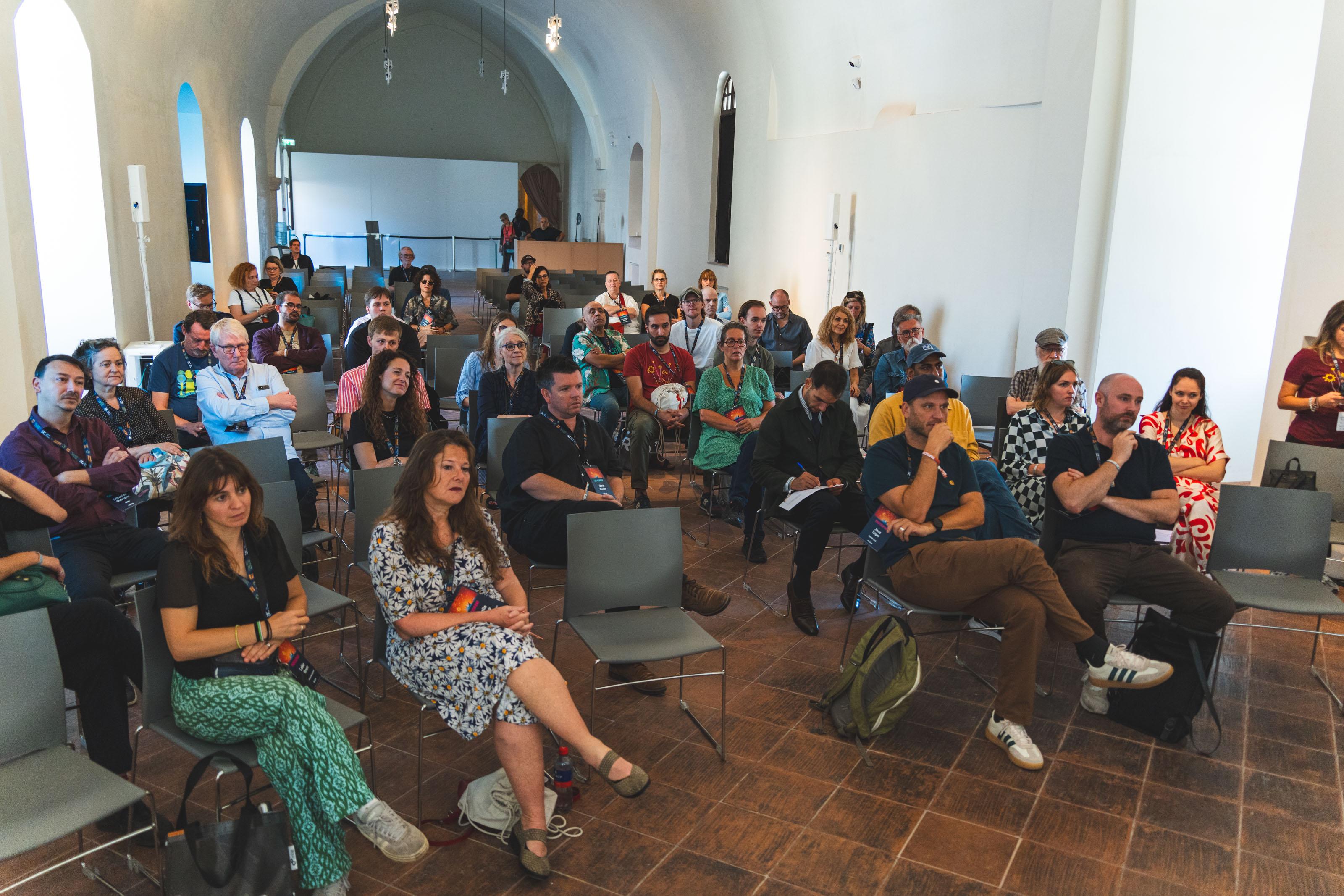
Speaking as an agent Malwina said that when setting up a tour she wants to make it as sustainable as possible. That means following the best possible route and using trains wherever possible. She appreciates the collaboration of programmers to help her secure extra gigs. It is very time-consuming to set up a tour, months, even years are necessary, Sylvain said, so the better the understanding the better the cooperation.
An agent from Estonia said that programmers can help to do a little extra PR for touring groups by recommending them to other venues or festivals. Sylvain replied that he does this with a network of half a dozen same-scale venues in France. She recommended that agents be fully prepared with “the full package” before contacting festivals, as less than fully concrete proposals are usually met with rejection.
Lee Patterson (UK) of music agency Gobetween identified a particular frustration when programmers ask agents—and musicians— to also do the marketing, even when the venue has a marketing department. Musicians and agents are at the bottom of the ecosystem, Lee said, not being paid until the concert happens. She described her job as delivering the best deal possible
for the musicians and working efficiently with the programmer to secure this. Too often, Lee observed, “the agents job ends up being everything.”
One suggestion from the floor was for venues to include tick boxes on their ticket-sales page where purchasers have the option to share their contact details with the artist/group whose tickets they have just bought to alert them to future gigs or festival appearances by the same group, or to receive the group’s monthly newsletter. The tick-box option would circumnavigate laws prohibiting the sharing of a person’s contact details.
Ourida Yaker (FR), who runs an agency in France, described the frustrations of working in a “vertical system and not a horizontal one.” Usually, agents are the first professionals in contact with artist’s projects. She related the agents’ sense of responsibility to find gigs, communicate, produce and invest financially in the artist. “We have a big investment doing this,” she noted. It takes a long time, sometimes years, she said, to get the interest of promoters and programmers.
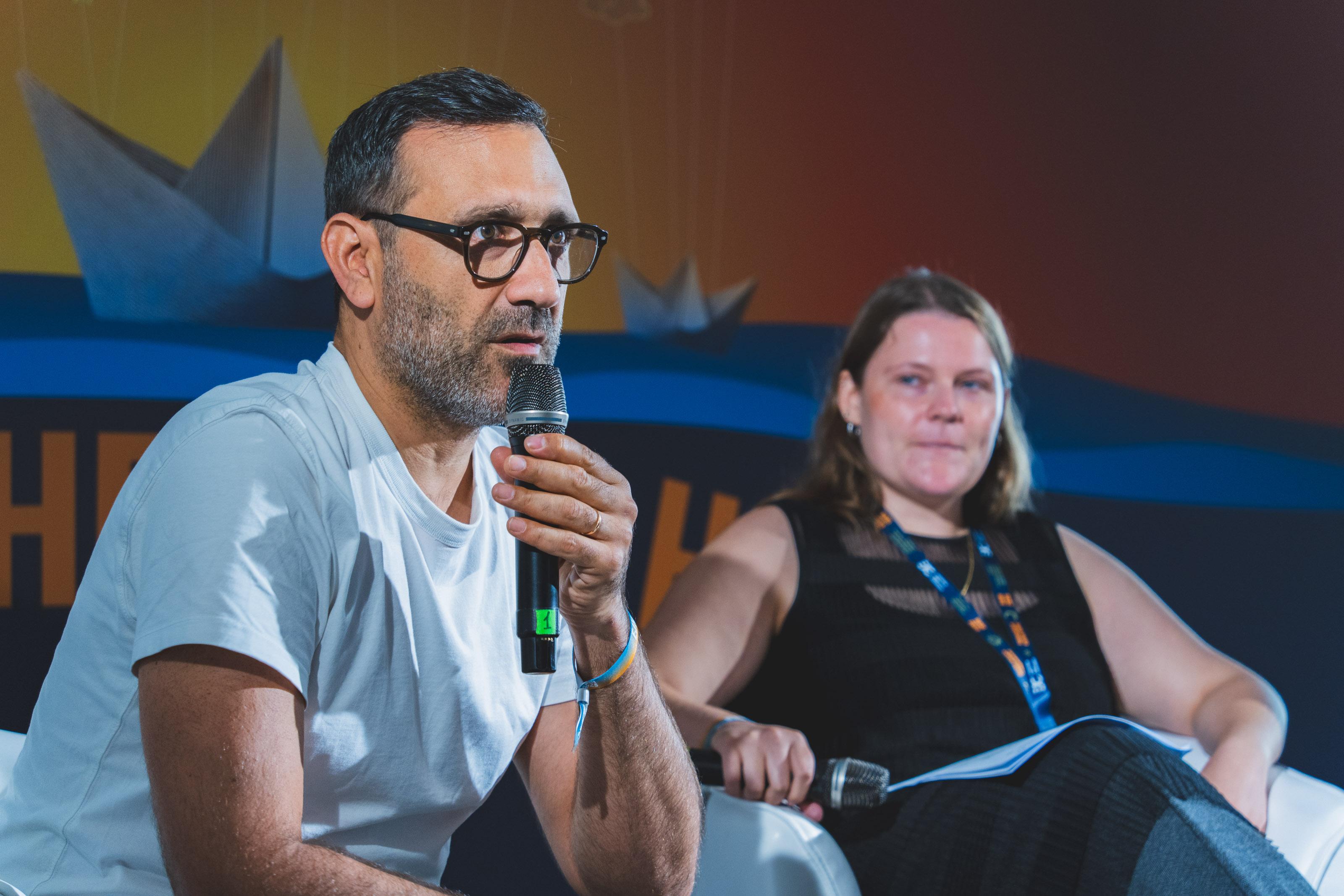
She acknowledged the opportunities afforded by industry events like WOMEX, jazzahead! and the EJC to potentially meet promoters and programmers but cited one case where it took 12 years to nail down an appointment with one such person. Ourida urged promoters and programmers to be more curious and to engage with more agents instead of repeatedly using the same agencies.
Elom Lotsi (SN) of Dakar Music Expo asked if—beyond issues of visas and travel—there is any interest in the new wave of musicians from Africa who are “doing amazing things in jazz and other genres, but especially jazz.” He lamented the fact that many European agencies always seem to have the same artists on their rosters. Sylvain expressed his own interest but noted that he has no connections with those scenes—no connections with agents. Geographical factors mean that European promoters and programmers are much more closely connected to European agents than agents from other continents.
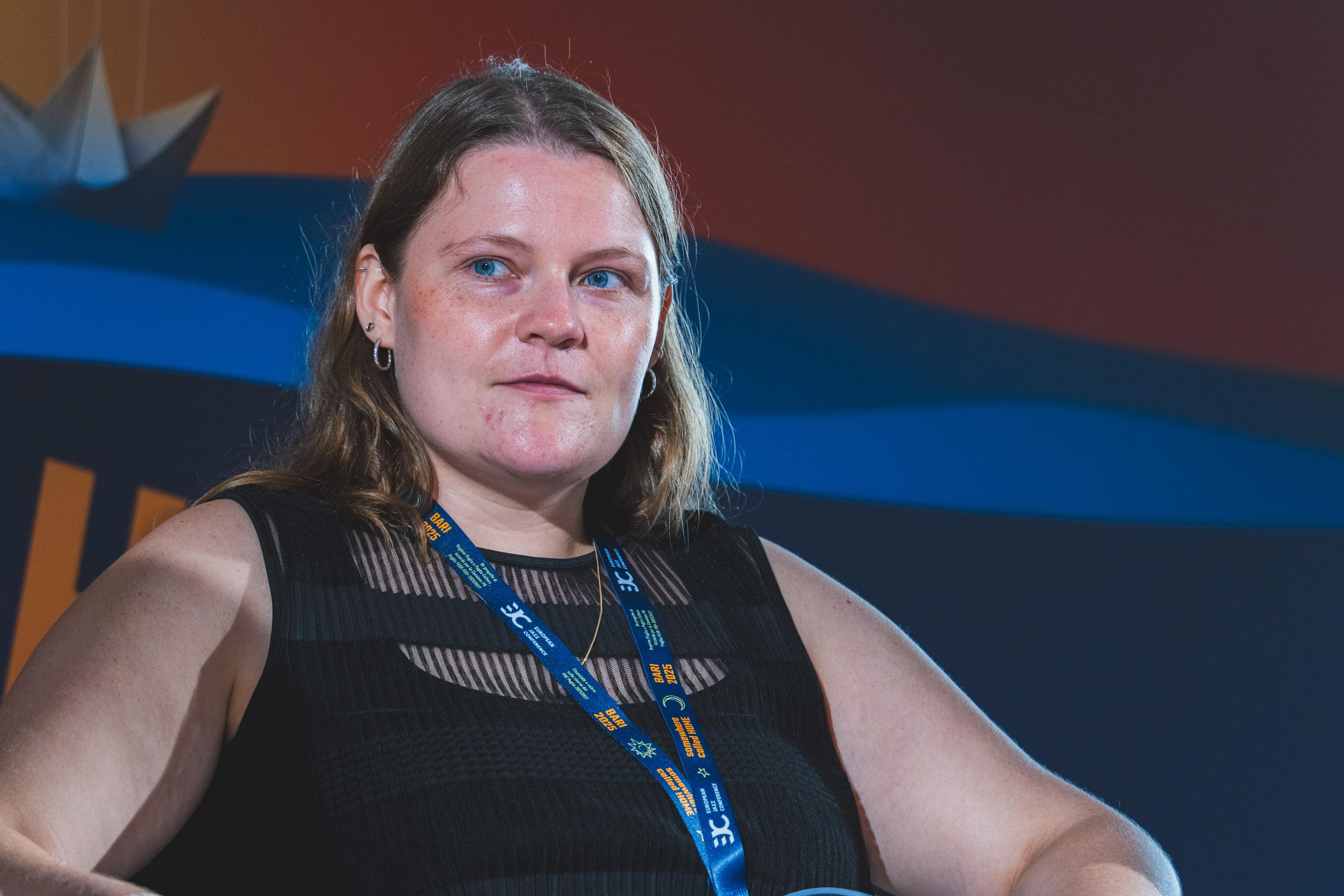
Steve Meade (UK), artistic director of the Manchester Jazz Festival reminded everyone of the third side of the triangle—the audience. The audience is 95% of our economic driver, he said. “It is not just how many people can I get through the door for our show, but who are the people?” Audience development is important for the Manchester Jazz Festival, but it will not work, Steve cautioned, if “we go at it like a transaction … we have to make a collaborative effort to define who we are trying to reach and not just 350 people through the door.” Steve said that direct messaging from the artist to the potential audience has much more potency than if the marketing just comes from the venue.
One programmer claimed that the promoter bears the heaviest financial burden so taking a chance on an unknown artist supposes a financial risk. Losing money on one small gig might not be catastrophic, the cumulative effect of losing money on a dozen such programming risks throughout the year can be crippling. “We are subsidising the growth of emerging artists, and I think we are getting to the point where it is not going to be bearable economically for most independent promoters.”
Malwina responded by saying that touring artists are also struggling financially. With lower budgets it is challenging for agents and artists to tour without making losses. “That’s why collaborating and trying to understand both sides is really important—how we can survive together.”
One venue owner said that risk should be shared by agent, venue and musicians, and if likely to a loss-making gig it should instead be viewed as an investment. Another attendee noted that due to high costs it is increasingly viable to work only with artists who have travel costs covered, but that travel funding is on the decline. With the pinch also felt in a reduction of corporate sponsorship someone suggested that donations from audiences might be the only way to alleviate the financial pressures.
Gavin Maycroft (UK) asked agents to be more trusting of venue owners’ knowledge of their audiences and how adventurous, or not, they may be.
Takeaways from this session included:
• Efficiency in communication — restrict number of emails to the essential
• Transparency and consistency in dealings
• Trust in each other’s processes and respect for everyone Set time expectations for programming cycles and building tours
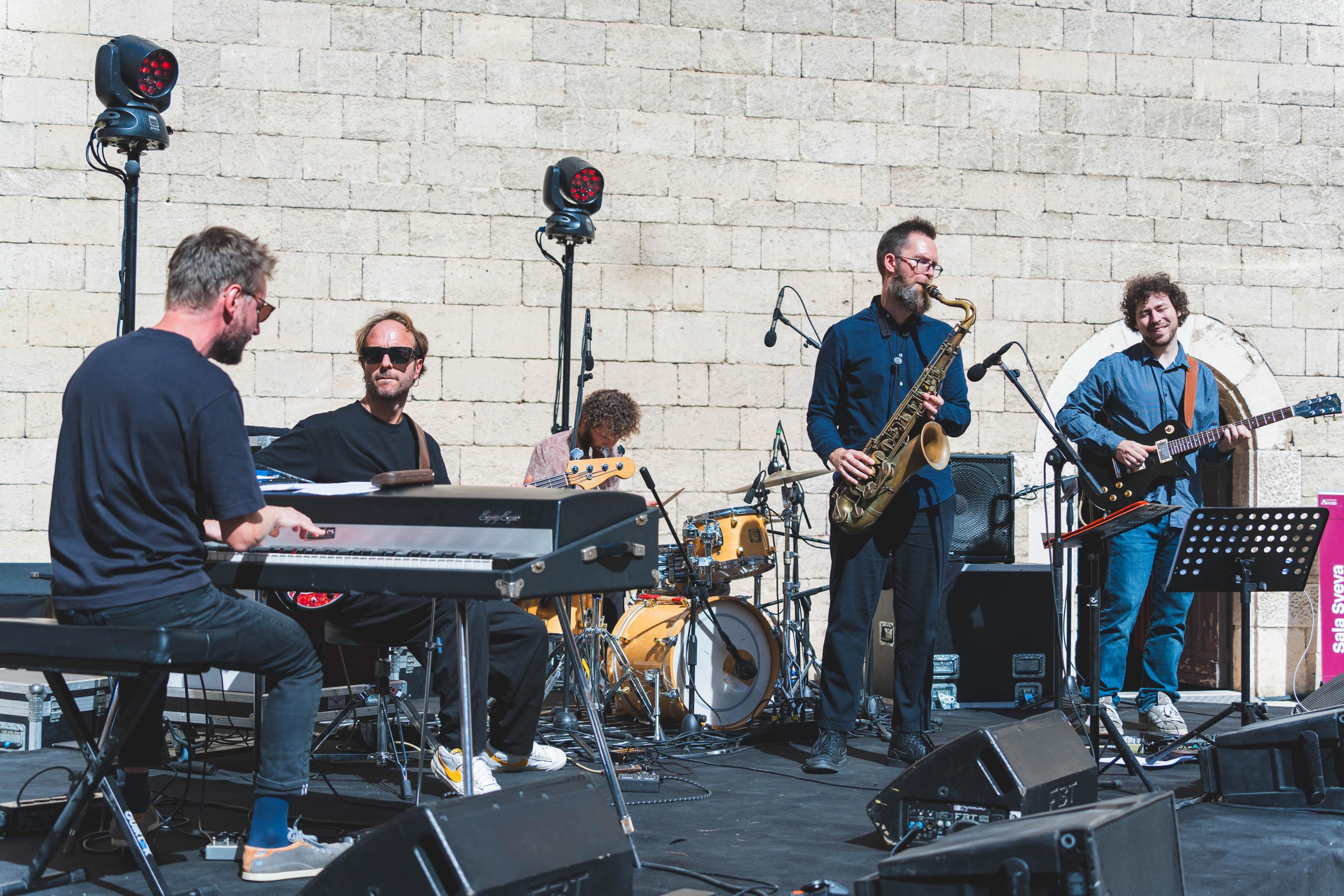
Giambattista and Karolina then got the award presentations underway. Each year the EJN recognises outstanding achievement in three separate categories: the EJN Award for Adventurous Programming; the EJN Award for Music & Community; and the EJN Award for Emerging Artists, in collaboration with 12 Points.
The jury for the EJN Award 2025 for Adventurous Programming was Tania Giannouli (artist, Greece), Ragnhild Menes (Kongsberg Jazz Festival, Norway), Pedro Costa (Clean Feed label & promoter, Portugal), Wim Wabbes (EJN honorary member, Belgium), Hernádi Zsolti (previous Award winner, Budapest Music Centre, Hungary). The winner for 2025 was Saalfelden Jazz festival (Austria).
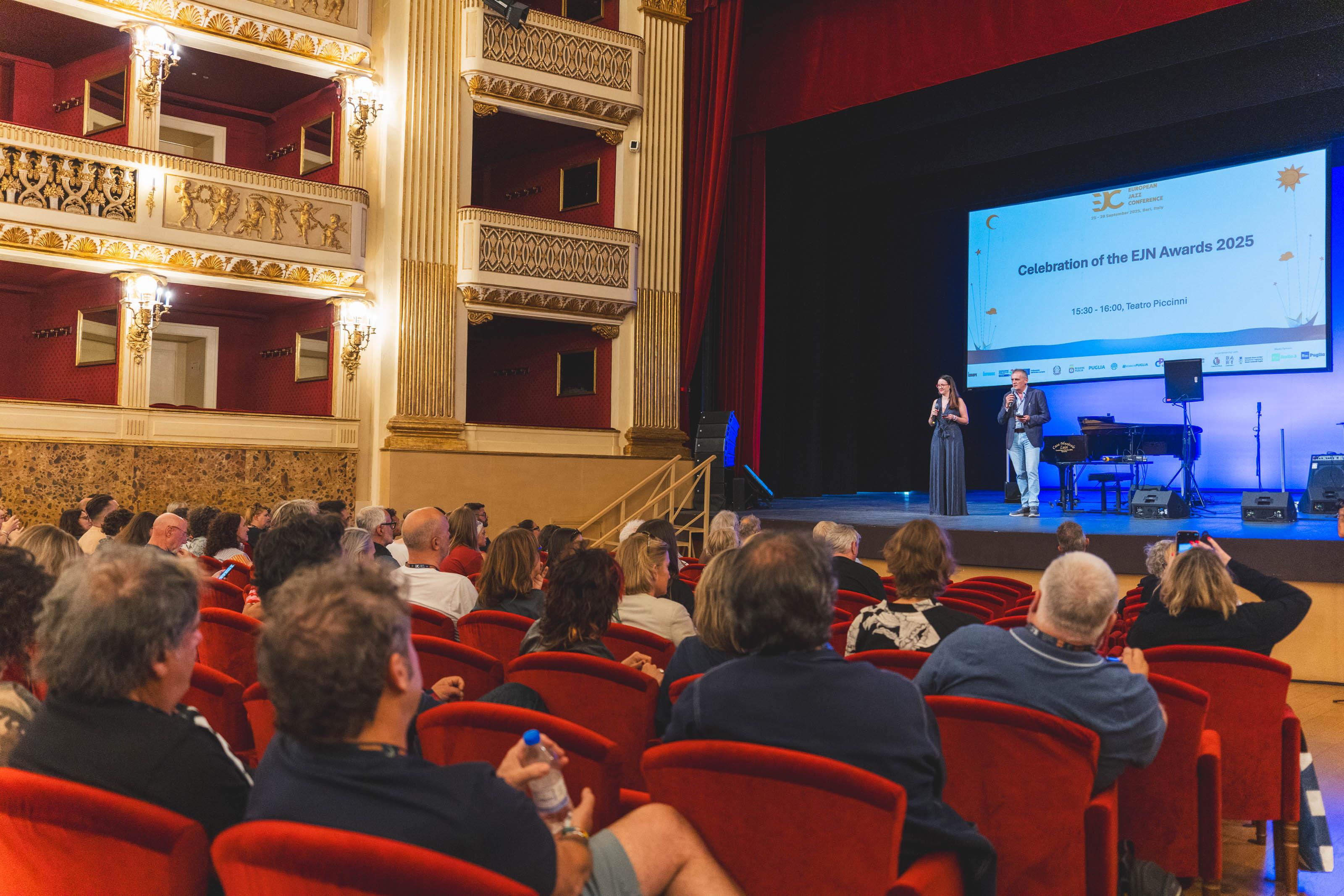
Accepting the award, Mario Steidl expressed his gratitude and said that the award was not just Saalfelden’s but the EJN’s as well, because, thanks to the encouragement of his wife Tina, he began traveling to other festivals, which gave him a new perspective on his own festival. He admitted to himself that Saalfelden Jazz Festival was far from being a leading jazz festival, that it had stopped evolving.
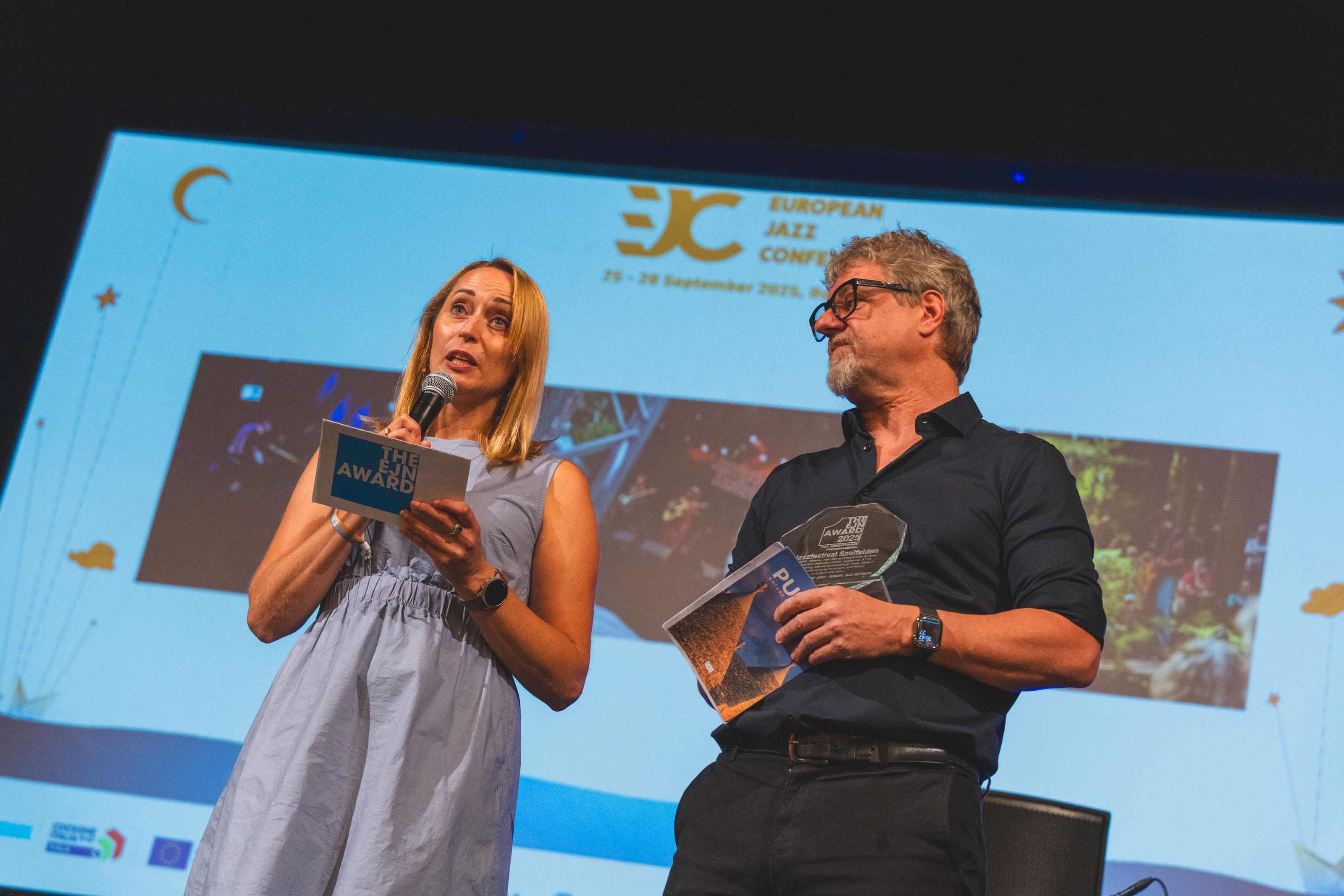
Mario acknowledged drawing inspiration from many of the festivals of EJN members, which helped inject new life into Saalfelden Jazz Festival and to attract new audiences. Mario said that the reward was for everyone present because he had learned so much from them. Mario thanked Daniella for being such a wonderful producer, a great team leader and a giver of courage. He paid moving tribute to his wife Tina and again thanked the EJN family. A short video highlighting the Saalfelden Jazz Festival followed.
The process to decide the second award, dedicated to outstanding work in Music and Community anywhere in the world, began as a public nomination phase open to EJN and nonEJN members. A shortlist of 18 projects went before the jury, comprised of Alex Carr (EJN Board member, Cheltenham Festivals, UK), Maria Rylander (EJN Board member, Göteborg Artist Center, Sweden), Mark van Schaick (EJN Board member, Buma Cultuur / inJazz, Netherlands), Candela Carrera (previous award winner, Taller de Músics, Spain), and François Matarasso (community arts researcher and EJN consultant for social inclusion, UK/France).
The winner, Karolina announced, is Sounds of Change, a Netherlands-based organisation that that trains a broad range of people, from community workers to psychologists, and from musicians to therapists to use musical processes as a means of psycho-social support in conflict
areas and in situations of displacement and trauma. In this way, Karolina said, “music becomes a tool not only for art, but for life.
Sounds of Change has worked in The Netherlands, Ukraine, in Syria, Turkey, Iraq, Jordan, Lebanon and in the Occupied West Bank, and Gaza, Palestine. In these countries, and others, Sounds of Change works in refugee camps, prisons and with marginalised communities.
Accepting the award, Sounds of Change founder, musician and trainer Lucas Dols thanked the EJN for the recognition. He said that it was an affirmation of his belief that “music is not only art, it is a force for change, for healing and for belonging.”
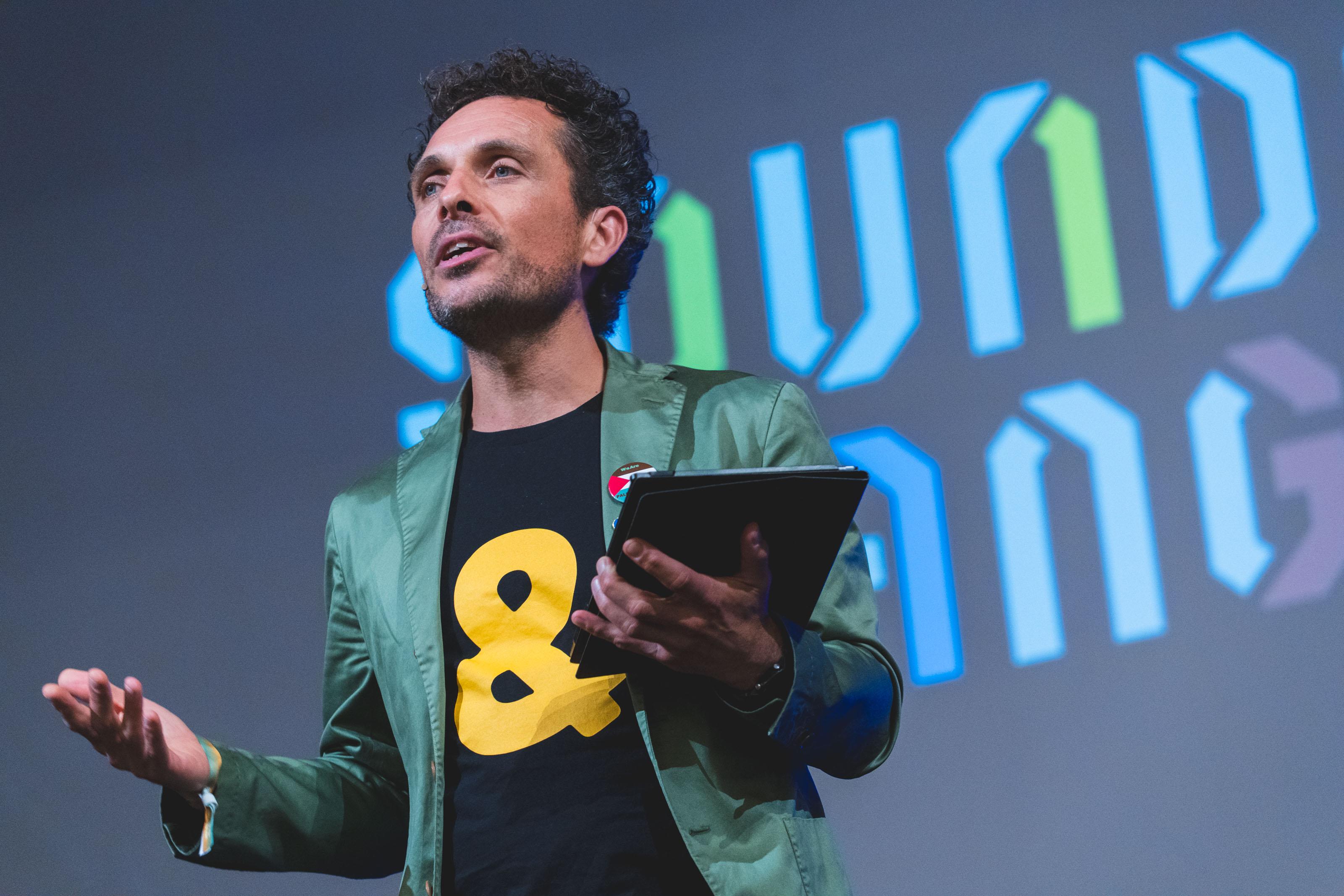
A bassist immersed in the jazz scene for many years, Lucas’ professional life changed in 2012 when he visited the Zaatari refugee camp in Jordan—home to 140,000 Syrians living in tents. Sitting with children there, clapping, humming and singing, Lacas observed that “even the simplest rhythm sparked joy, expression and connection.” It was he said, a life-changing moment, to recognize the power of music to create autonomy and to help healing.
Training local professionals is central to Sounds of Change, as they know the language and culture, the music “and most important, the context.” This approach creates trust, familiarity and long-term impact. “We bring music where it is needed most,” Lucas said.
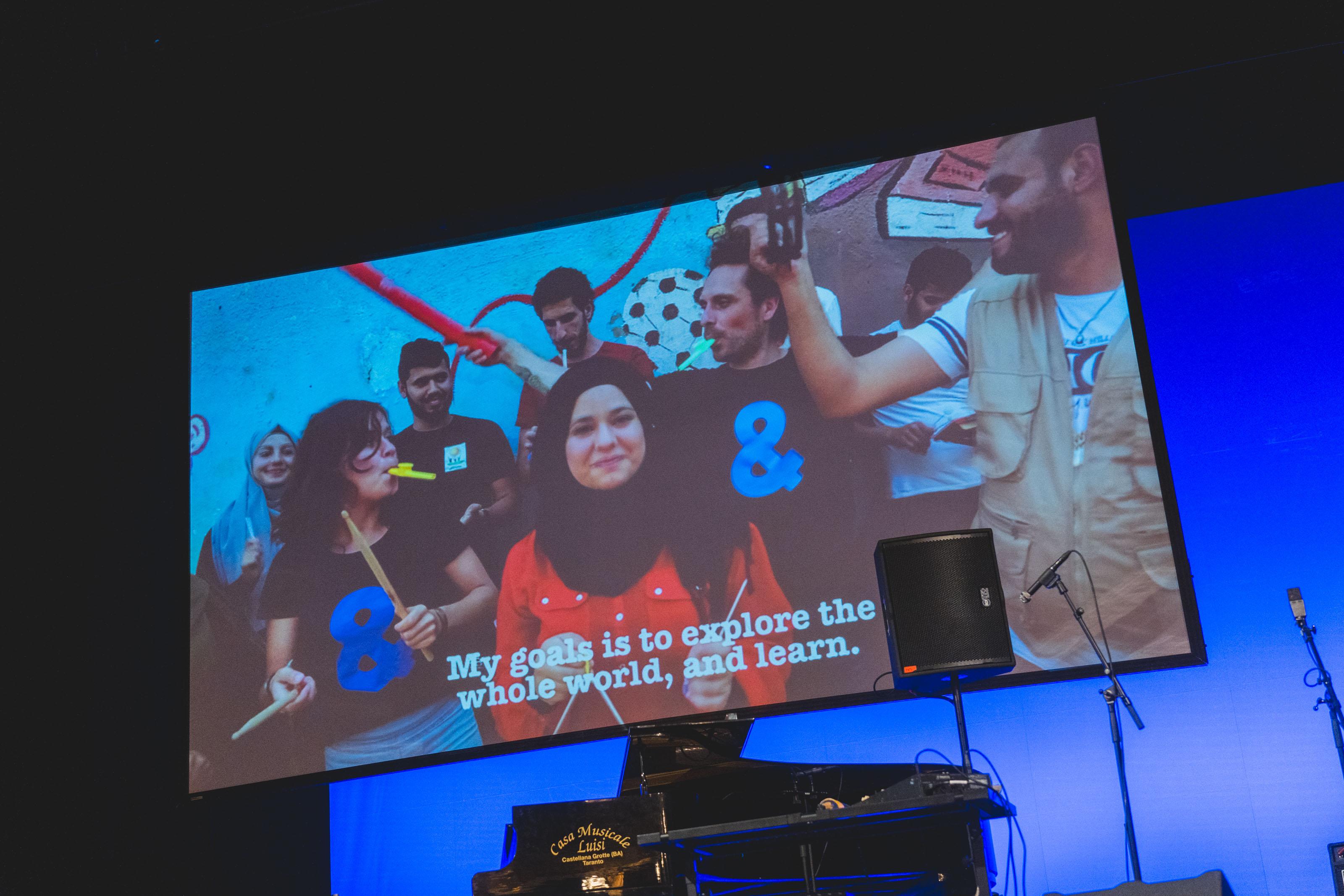
Lucas then showed a short film of Sounds of Change work, featuring the inspiring figure of Nadine Ahmed Ali. Nadine, who lives in Nahr el Bared refugee camp in Lebanon, is one of the ‘Changemakers’ trained by Sounds of Change to carry out its work. Nadine narrated the challenges of introducing new ideas and experiences in strongly traditional communities where “people are trapped in their traditional beliefs.” Nadine has broken traditional boundaries, becoming a youth leader and coach of two girls’ football teams.
Nadine decided to study philosophy at university, believing in the power of thought to effect positive change. She also volunteers with the NGO Azahir, which uses sport, music and psychological support to empower the camp’s children. An inspiring example of Sounds of Change’s work, Nadine signed off by saying: “… I’m not done yet breaking boundaries.”
Jazz improvisation, Lucas said, is not just about music, it is about listening, trust and co-creation in real time. For people who have experienced trauma, improvising music gives them back some sense of autonomy and ownership. It is a powerful tool of expression. “Jazz is not separate from what we do, it is at the heart of it,” Lucas explained. “Jazz is inclusion.”
In conclusion, Lucas said the award was for everyone in the EJN who believes in the power of music to effect change. He thanked the jury, the EJN members. He invited anyone who might be
interested in getting involved with Sounds of Change to contact him.
Karolina then turned to the Zenith Award. An initiative of the EJN in collaboration with Irish organisation Improvised Music Company’s 12 Points Festival, the Zenith Award recognises an outstanding European group or solo artist working in jazz/ improvised music.
The jury was comprised of Christoph Huber (Porgy & Bess, Austria), Martyna van Nieuwland (Music Meeting, the Netherlands), Ragnhild Menes (Kongsberg Jazzfestival, Norway), Tina Lešničar (Ljubljana Jazz festival/Cankarjev dom, Slovenia), Max von Pretz (Südtirol Jazzfestival Alto Adige, Italy), Kenneth Killeen (12 Points/Improvised Music Company, Ireland).
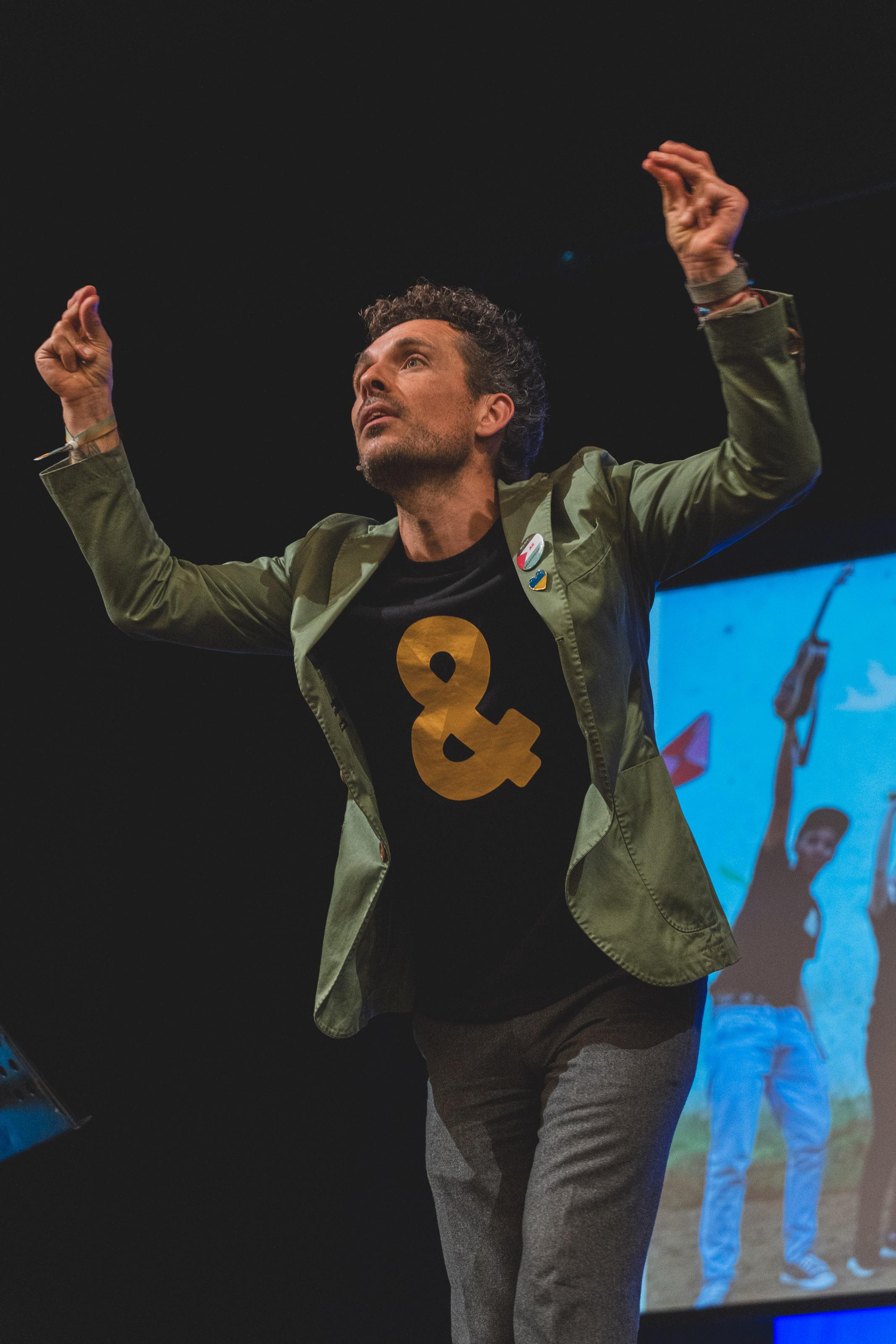
Karolina announced that the winners of the 2025 Zenith Award were SC’ÖÖF, an experimental band from Switzerland with a radical, uncompromising sound. Karolina hailed the band’s ability to connect with young audiences. “Their music is fresh, fearless and full of character,” she said.
Band members Elio Amberg (saxophone) Noah Arnold (saxophone)) Amadeus Fries (drums/ laptop), took to the stage, with sound engineer Jonas Häni operating from the back of the hall. Christian Zemp (guitar) was absent due to the birth of his first child. SC’ÖÖF gave an in-your-face performance of improvised music that left nobody in Teatro Piccinni indifferent.
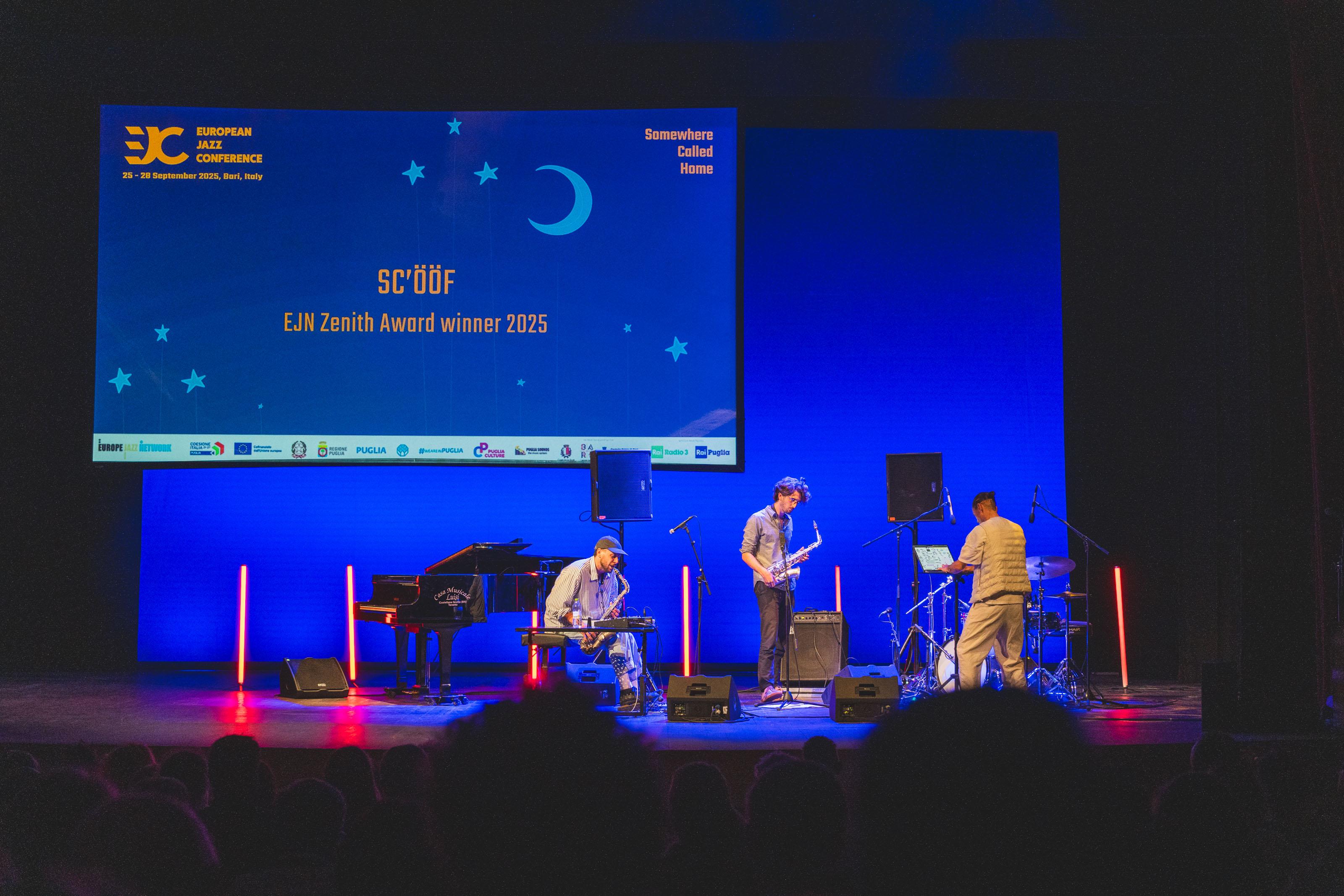
As is customary the closing session of the EJC sees the baton handed from the current host city to the following year’s hosts. To applause it was announced that the host city for the EJC 2026 will be Cologne. It will be a co-organisational collaborative effort between Cologne Jazzweek, Stadtgarten Köln, and Monheim Triennale. From the respective organisations, Janning Trumann (Cologne Jazzweek) and Kornelia Vossebein (Stadtgarten Köln) were invited to the stage to give attendees a taste of what to expect in Cologne.
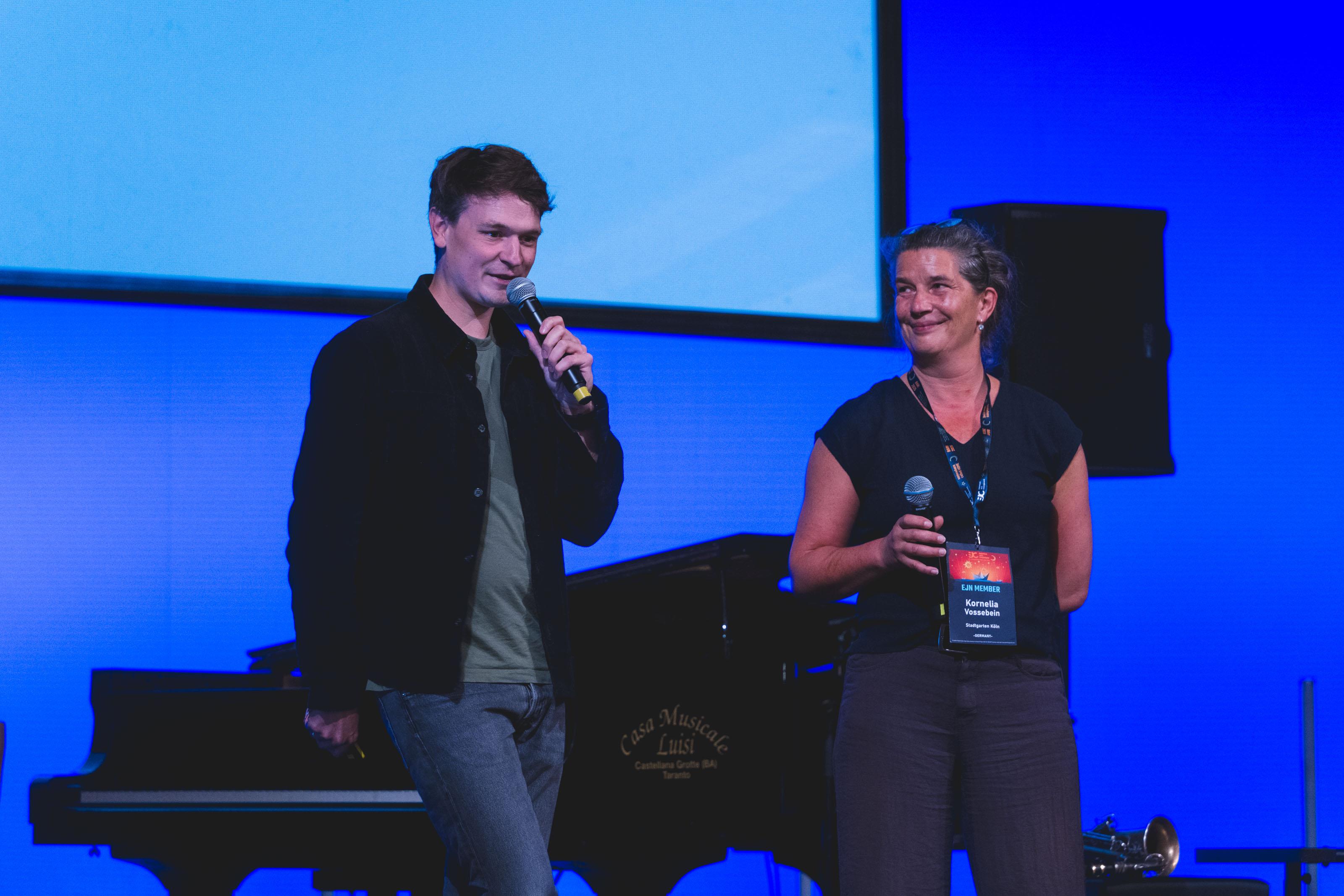
Kornelia spoke brie fl y about the three organisations and their joint bid for the EJC 2026. Janning then spoke a little about Cologne, its location and the character of the city. Cologne has over 400 professional jazz musicians and holds over 1,000 jazz concerts every year. With publicly funded venues, plus festivals and clubs there is a jazz ecosystem in place. Cologne is home to the WDR broadcasting service, the second largest in Europe after the BBC. It also has one of the biggest music conservatories in Europe producing a steady stream of talented young musicians.
Janning explained how the conference building, music venues and the single conference hotel are all centrally located and within easy walking distance of each other.
As for the German jazz showcase programme, Kornelia explained that a broad range of promoters would be asked to recommend artists. From this list a jury will choose the dozen or so emerging acts from across the German jazz scene to perform at the EJC.
Cologne is well connected by train to many European cities, but the city is easy to reach by air. Kornelia added that public transportation in Cologne is very good. Cycling is one option for moving around the city. Janning and Kornelia thanked the EJN members and extended their warm welcome to Cologne to one and all. A short video gave a taster of what to expect from the EJC 2026 in Cologne.
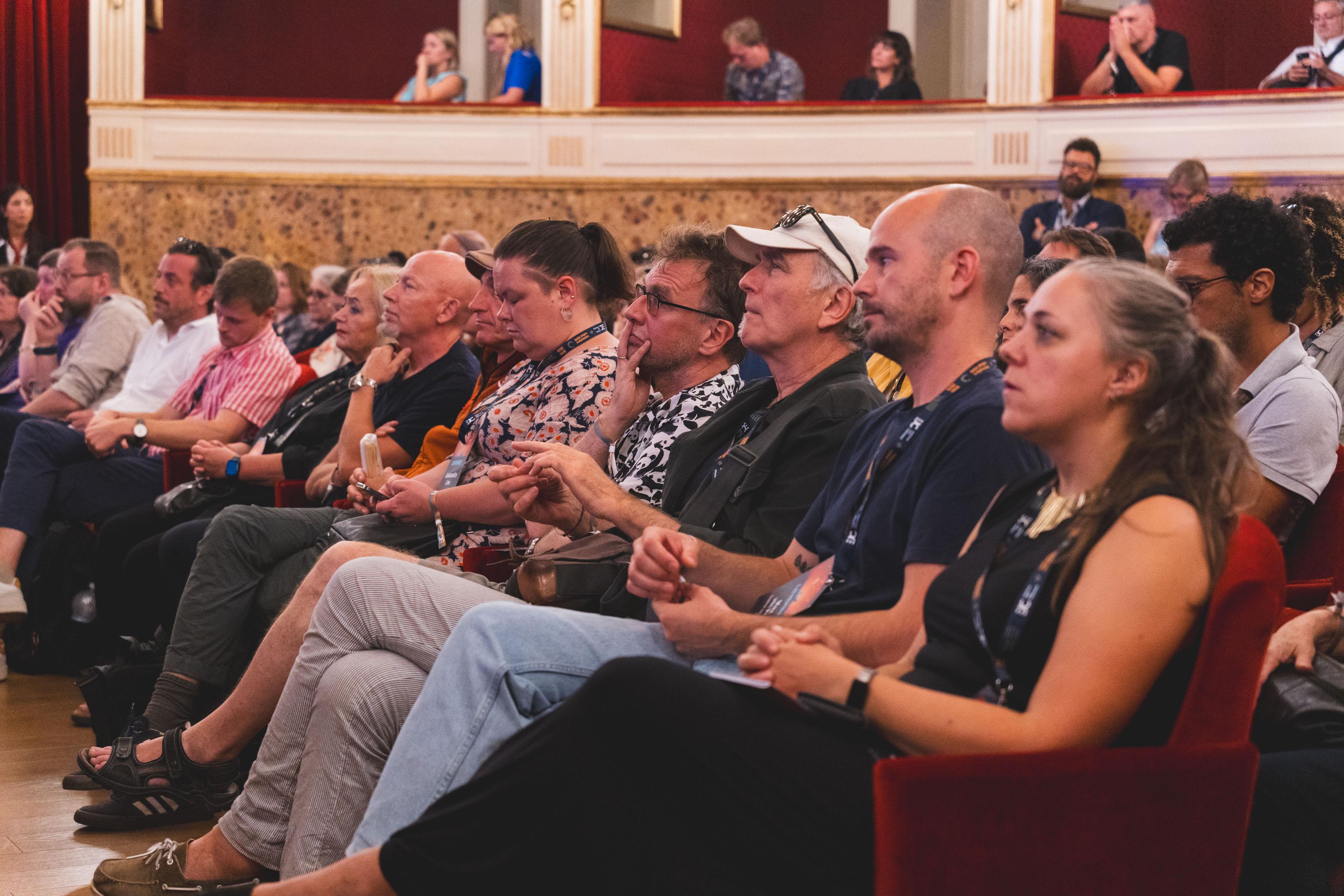
In wrapping up, Karolina thanked everyone for their participation. She asked everyone to look inside themselves to examine their core values and carry them forward. She reminded all of the
powerful tool they share in music. “Let us use it to promote the values we believe in, and to bring hope to a world that urgently needs it.”
She extended special thanks to the team of Puglia Sounds and the staff of the EJN. From EJN, Stefano and Francesca joined Giambattista on the stage to receive the applause from the conference attendees. Giambattista then called the team of Puglia Culture to the stage where they received a warm ovation in recognition of their hard work.
In place of the usual conference wrap-up by an invited guest, this year’s EJC was summarised in a video that captured a flavour of the sights and sounds of the weekend.
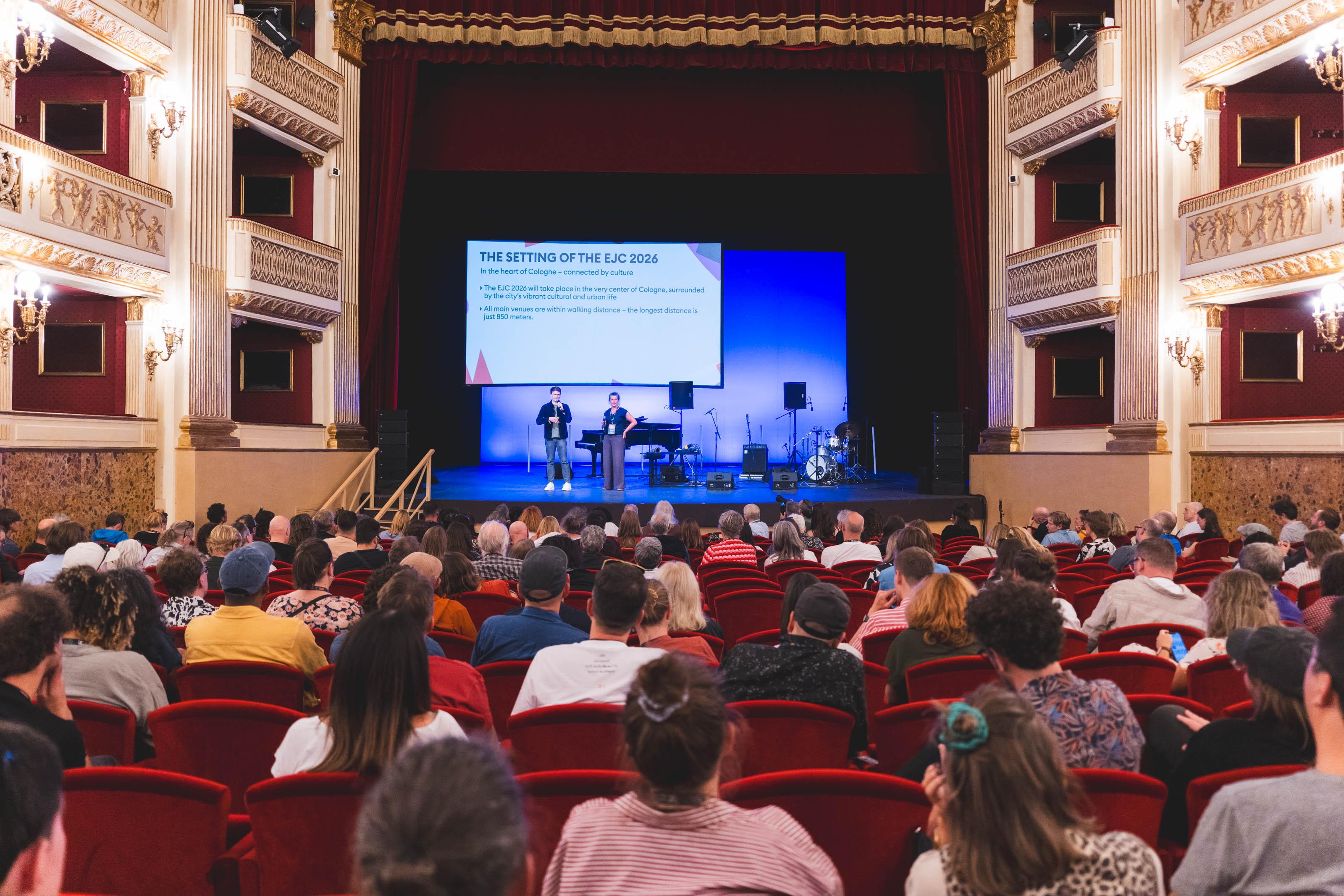
Thursday, 25 September 2025
- FOR EJN MEMBERS ONLY -
13:00 - 20:30 Registrations for EJN members - Kursaal Foyer
15:00 - 15:50 Welcome session for new members and ‘30 under 30’ - Kursaal Galleria
16:00 - 17:15 Presentation of the EJN activities and general discussion - Kursaal Sala Teatro
17:15 - 17:45 Coffee break - Bar La Biglietteria
18:00 - 20:30 FORMAL EJN GENERAL ASSEMBLY - Kursaal Sala Teatro
- OPEN TO ALL -
21:00 - 00:00 FRINGE festival: street concerts by students of the conservatory & music schools - City Centre
Friday, 26 September 2026
09:30 - 13:00 Registrations for everybody - Teatro Piccinni Foyer
10:30 - 11:00 Official opening and welcome speeches - Teatro Piccinni
11:00 - 11:20 KEYNOTE SPEECH: Nabil Bey Salameh “Home in the In-Between” - Teatro Piccinni (speech in Italian with on-screen translation in English)
11:30 - 12:30 PANEL DEBATE: Sounds of Home - Can music help overcome fear and division in our societies? - Teatro Piccinni
• Soweto Kinch (artist and broadcaster, UK)
• Titia Bouwmeester (Orchestre Partout / 5eKwartier, Netherlands)
• Pino Pecorelli (BabelNova Orchestra, Italy)
• Moderator: Anna Umbima (writer and broadcaster, UK)
12:40 - 13:10 SHOWCASE: Camilla Battaglia ‘ELEkTRA’ - Teatro Piccinni
13:30 - 14:30 Lunch - Mövenpick hotel
14:30 - 19:00 Late registrations - Castello Svevo Entrance
15:00 - 16:30 Five parallel DISCUSSION GROUPS - Castello Svevo
#1 - Embracing cultural entrepreneurship to future-proof our organisations - Sala Conferenze
• Speaker: Gökçe Dervişoğlu Okandan (academic & cultural policy expert, Türkiye)
• Moderator: Murat Sezgi (Bozcaada Jazz Festival, Türkiye /Germany)
#2 - Sharing the load: involving audiences in environmentally responsible live music - Torre dei Minorenni
• Speaker: Armelle Llop (Le Périscope / Better Live, France)
• Moderator: Mathilde Sallez (Le Périscope / Better Live, France)
#3 - The social and political role of curators and programmers - Sala Federico II
• Moderator: Marzio Scholten (Jazz International Rotterdam / RAUW, Netherlands)
#4 - The elephant in the room: addressing burnout in the music industry workforce - Sala Aragonese
• Chair: Rosana Corbacho (M.I. Therapy, Spain)
#5 - Unseen faces / unheard voices: how to ensure migrant communities have a meaningful place in our programmes and organisations - Cappella Palatina
• Moderator: Háshem Kabreet (Orchestre Partout, Syria / Netherlands)
• Moderator: Titia Bouwmeester (Orchestre Partout / 5eKwartier, Netherlands)
16:30 - 17:00 Coffee break - Castello Svevo Atrio Federiciano
17:00 - 17:30 SHOWCASE: VMV Trio - Castello Svevo Cortile
17:45 - 18:15 SHOWCASE: Anaïs Drago ‘Relevé’- Castello Svevo Cortile
18:30 - 19:00 SHOWCASE: Bring Your Horn - Castello Svevo Cortile
19:00 - 20:00 Free time / networking
20:00 - 21:30 Dinner - Mövenpick hotel
FRINGE festival in parallel in two venues in the city centre: Auditorium Diocesano Vallisa
• 21:00 - 21:30 CONCERT: Zoe Pia & le Sculture Sonanti
• 21:40 - 22:10 CONCERT: Federica Michisanti Trio
• 22:20 - 22:50 CONCERT: Sliders (Filippo Vignato, Federico Pierantoni, Lorenzo Manfredini)
• 23:00 - 23:30 CONCERT: Alberto Parmegiani ‘Millennium’ feat. Angela Esmeralda Kursaal Santalucia
• 21:00 - 21:40 CONCERT: Pierluigi Balducci Ensemble feat. Badrya Razem ‘Kosmos & Chaos’
• 21:50 - 22:30 CONCERT: Mike Rubini ‘Extensive Quartet’ feat. Andrea Andreoli
• 22:40 - 23:20 CONCERT: Lisa Manosperti ‘Uncaged Bird’
• 23:30 - 00:10 CONCERT: Giuseppe Bassi Quartet
Saturday, 27 September 2025
10:00 - 13:30 Registrations for everybody - Castello Svevo Entrance
10:30 - 11:00 Coffee & Networking - Castello Svevo Atrio Federiciano
11:00 - 11:30 SHOWCASE: Matteo Bortone ‘No Land's’ - Castello Svevo Cortile
11:40 - 13:00 Four parallel WORKING GROUPS - Castello Svevo
#1 - Meet your fellow members: Speed Dates (for EJN members only) - Sala Normanna
• Facilitator: Mark van Schaick (Buma Cultuur / inJazz, Netherlands)
#2 - Good vibes only: How do we define and prevent unwanted behaviours and create welcoming spaces in our festivals and venues? - Sala Conferenze
• Chair: Eivind Breilid (Balansekunst, Norway)
#3 - Smart sounds and smarter systems: AI tools for creative music organisers - Torre dei Minorenni
• Chair: Emanuele Frontoni (Macerata University, Italy)
#4 - For a better music ecosystem: joint session for agents and programmers - Sala Federico II
• Moderator: Sylvain Elie (Le Petit Faceaux, France)
• Moderator: Malwina Witkowska (No Earplug, Norway)
13:00 - 13:15 Group photo - Castello Svevo Scalinata
13:30 - 14:30 Lunch - Mövenpick hotel
15:30 - 16:00 Celebration of the EJN Awards 2025 - Teatro Piccinni
16:00 - 16:30 SHOWCASE: SC’ÖÖF (CH), EJN Zenith Award winner 2025 - Teatro Piccinni
16:30 - 17:00 Closing remarks & presentation of the European Jazz Conference 2026Teatro Piccinni
17:00 - 17:30 SHOWCASE: Esmeralda Sella - Teatro Piccinni
17:45 - 18:15 SHOWCASE: Matteo Paggi ‘GIRAFFE’ - Teatro Piccinni
18:15 - 20:00 Free time / Networking
20:00 - 21:30 Dinner - Mövenpick hotel
FRINGE festival in an outdoor stage: Piazza del Ferrarese
• 21:00 - 21:40 CONCERT: Gaetano Partipilo ‘Boom Collective’ feat. Hermon Mehari
• 21:50 - 22:30 CONCERT: Raffaele Casarano ‘Anì Live’
• 22:40 - 23:20 CONCERT: Nicola Conte ‘Umoja’
• 23:40 - 00:20 CONCERT: Artchipel Orchestra & Guests (Roberto Ottaviano, Gianluca Petrella, Luisiana Lorusso)
Sunday, 28 September 2025
Cultural tours & activities (by reservation ONLY)
Meeting point: Largo Eroi del Mare, Bari
• 10:30 - 12:30 Option #1: Walking tour of the old town and Bari city centre
• 10:00 - 17:00 Option #2: Tour of Alberobello town - transfer from/to Bari by coach
First name Family Name Organisation
Country
Alexandra Kolac Australian Music Centre Australia
Martel Ollerenshaw Australian Music Centre Australia
Sarah Grosser Bezau Beatz Austria
Helge Hinteregger MICA Music Information Center Austria
Christoph Huber Porgy & Bess Austria
Gabriele Mazic Porgy & Bess Austria
Daniela Neumayer Jazzfestival Saalfelden Austria
Mario Steidl Jazzfestival Saalfelden Austria
Benny Claeysier Kunstencentrum KAAP Belgium
Velma De Heel Rataplan Belgium
Helene Deom Gaume Jazz Belgium
Liliana Graziani Wallonie - Bruxelles Musiques Belgium
Marie Otjacques Gaume Jazz Belgium
Danny Theuwis Leuven Jazz Belgium
Mik Torfs nona Belgium
Kristof Van den Broeck VI.BE Belgium
Maarten Van Rousselt Flagey Belgium
Roel Vanhoeck Bozar - Centre for Fine Arts Brussels Belgium
Femke Vanpoucke Rataplan Belgium
Wim Wabbes Wim Wabbes (Honorary Member) Belgium
Yordanka Bekirska A to JazZ Festival Bulgaria
Peter Dimitrov A to JazZ Festival Bulgaria
Petr Maceček Jazzfest Brno Czech Republic
Eliska Pirkova Mladí Ladí Jazz Czech Republic
Vilém Spilka Jazzfest Brno Czech Republic
Barbora Subrtova Mladí Ladí Jazz Czech Republic
Eva Frost JazzDanmark
Anne
Sophie Parsons DSI Swinging Europe
Agnete Seerup JazzDanmark
Anne Erm Jazzkaar Festivals
Birgit Krullo Jazzkaar Festivals
Denmark
Denmark
Denmark
Estonia
Estonia
Elo-Liis Parmas Jazz Estonia ( Eesti Jazzliit ) Estonia
Jaak Sooäär Jazz Estonia ( Eesti Jazzliit ) Estonia
Jussi Fredriksson Jazz City Turku Finland
Juhamatti Kauppinen Tampere Jazz Happening Finland
Minnakaisa Kuivalainen Tampere Jazz Happening Finland
Matti Lappalainen April Jazz Espoo Finland
Sakari Puhakka Helsinki Jazz ry Finland
Annamaija Saarela G Livelab Tampere Finland
Maria Silvennoinen Jazz Finland / Finnish Jazz Federation Finland
Janne Tuomi G Livelab Tampere Finland
Sarah Andin Grands Formats France
Anaïs Atamian Association Paris Jazz Club France
Maryline Bailly Jazz à Juan France
Vincent Bessieres Jazzdor France
Antoine Bos Association Jazzé Croisé France
Pierre Dugelay Le Périscope France
Sylvain Elie Le Petit faucheux France
Brigita Gračner Le Périscope France
Régis Guerbois Marseille Jazz des cinq continents France
Alexandre Herer Grands Formats France
Lizon Lavaud Centre national de la Musique France
Xavier Lemettre Banlieues Bleues/La Dynamo France
Armelle Llop Le Périscope France
Tiphanie Moreau Jazz sous les pommiers France
Philippe Ochem Jazzdor France
Frédéric Roy Pannonica France
Mathilde Sallez Le Périscope France
Erwan Vernay Grands Formats France
Katharina Ahrendt Jazzclub Unterfahrt Germany
Thomas Baerens Stadtgarten Köln Germany
Dennis Borlein Enjoy Jazz Germany
Malgorzata Cnota Pierre Boulez Saal Germany
Réka Csorba Jazzbüro Hamburg Germany
Nadin Deventer JazzFest Berlin, Berliner Festspiele Germany
Jakob Fraisse jazzahead! Germany
Christin Knäblein ELBJAZZ Germany
Sybille Kornitschky jazzahead! Germany
Sabrina Lahoud Monheim Triennale Germany
Ina Lieckfeldt ELBJAZZ Germany
Rebekka Marx Enjoy Jazz Germany
Reiner Michalke Monheim Triennale Germany
Ella O'Brien-Coker Stadtgarten Köln Germany
Michael Stückl Jazzclub Unterfahrt Germany
Janning Trumann Cologne Jazzweek Germany
Kornelia Vossebein Stadtgarten Köln Germany
Tove Waldemarsson Womex/Piranha Arts Germany
Esther Weickel Stadtgarten Köln Germany
Frank Wuppinger NUEJAZZ Festival Germany
Aggelos Kleitsikas Athens Technopolis Jazz Festival Greece
Antonis Zouganelis Athens Technopolis Jazz Festival Greece
Tamás Bognár BMC – Budapest Music Center Hungary
Edit Jancsó BMC – Budapest Music Center Hungary
Sunna Gunnlaugs Solfinna Iceland
Michael Bonner Moving on Music Ireland
Kenneth Killeen Improvised Music Company Ireland
Silvia Alunni Visioninmusica Italy
Koblan Amissah Abusuan / Bari in Jazz festival Italy
Aida Bakic Circolo Controtempo Italy
Corrado Beldì NovaraJazz Italy
Susanna Bellavigna ATER Fondazione Italy
Pompeo Benincasa Associazione Catania Jazz Italy
Enrico Bettinello Circolo Controtempo Italy
Filippo Bianchi Filippo Bianchi (Honorary President) Italy
Paolo Caiani Ponderosa/JazzMI/MonfortInJazz Italy
Aniello Caruso Empoli Jazz Festival Italy
Roberto Catucci
Daniele Ciuffreda
Fondazione Musica per Roma/Casa del Jazz Italy
Torino Jazz Festival - Fondazione per la cultura Torino Italy
Claudia Costanzi Visioninmusica Italy
Filippo d'Urzo Empoli Jazz Festival Italy Giangiaco
mo Doglio Ponderosa/JazzMI/MonfortInJazz Italy
Enzo Favata
Musica sulle Bocche International Jazz Festival Italy
Alessandro Fedrigo nusica.org Italy
Alberto Ferretti ParmaFrontiere Italy
Cristina Fina Puglia sounds Italy
Giulia Focardi I-Jazz Italy
Matteo Gabutti Associazione Culturale 4’33” Italy
Monica Gamberale Associazione Culturale 4’33” Italy
Gianluca Giusti ATER Fondazione Italy
Luciano Linzi
Fondazione Musica per Roma/Casa del Jazz Italy
Elena Migliorati Jazz Network Italy
Michele Mozzicato EGEA live Italy
Giovanni Oreno
Musica sulle Bocche International Jazz Festival Italy
Sofia Pennisi Associazione Catania Jazz Italy
Livia Pennisi Associazione Catania Jazz Italy
Christian Russano NovaraJazz Italy
Fausto Savatteri EGEA live Italy
Claudia Sergio Puglia sounds Italy
Roberto Tubaro Südtirol Jazzfestival Alto Adige Italy
Angelo Valori Pescara Jazz Festival Italy
Max von Pretz Südtirol Jazzfestival Alto Adige Italy
Stefano Zenni
Torino Jazz Festival - Fondazione per la cultura Torino Italy
Maris Briezkalns Rigas Ritmi Festival Latvia
Aleksandra Line Latvian Music Information Centre Latvia
Dorotėja Būdatė Lithuanian Jazz Federation Lithuania
Antanas Gustys Vilnius Jazz Festival Lithuania
Greta Gustyte Vilnius Jazz Festival Lithuania
Tadas Pasaravičius Lithuanian Jazz Federation Lithuania
Clémence Creff Kultur | LX Luxembourg
Per Hasse Andersen Maijazz - Stavanger International Jazzfestival Norway
Peter
Wallem Anundsen Sørnorsk Jazzsenter Norway
Frøydis Århus Vossa Jazz Norway
Stian Eismann Midtnorsk Jazzsenter (MNJ) Norway
Miloud Guiderk Cosmopolite Scene Norway
Kai Gustavsen Bærum Kulturhus Norway
Aleksander Haugen Norsk Jazzforum Norway
Kari Grete Jacobsen Østnorsk Jazzsenter Norway
Bendik Kjørholt Norsk Jazzforum Norway
Eirik Kristensen Cosmopolite Scene Norway
Helleik Kvinnesland Stavanger Jazzforum Norway
Øyvind Larsen Nasjonal jazzscene Norway
Magnus Lunay Moldejazz Norway
Roger Lygre Solvang Bergen Jazzforum Norway
Tone
Germaine Martinsen Jan Ole Otnæs (honorary Member) Norway
Ragnhild Menes Kongsberg Jazzfestival Norway
Jan Ole Otnæs Punkt Festival Norway
Sigrun Tara Øverland Sørnorsk Jazzsenter Norway
Unni Brit Partapuoli Norsk Jazzforum Norway
Ernst
Wiggo Sandbakk Trondheim Jazzfestival Norway
Arild Schei Dokkhuset Scene Norway
Jon Skjerdal Nattjazz Festival Norway
Camilla Slaattun Norsk Jazzforum Norway
Joakim Weibull Trondheim Jazzfestival Norway
Ulla-Stina Wiland Nordnorsk jazzsenter/Centre of Jazz in Northern Norway Norway
Malwina Witkowska Midtnorsk Jazzsenter (MNJ) Norway
Samer Jaradat
Meredith Bates Jazztopad Festival/National Forum of Music Poland
Karolina Juzwa Wytwórnia Foundation Poland
Agnieszka Kiepuszewska Wytwórnia Foundation Poland
Magdalena Pawlik Fundacja Jazz nad Odrą Poland
Dorota Piotrowska Fundacja Jazz nad Odrą Poland
Adam Szczepanek Lublin Jazz Festival Poland
Anna Szcześniak Lublin Jazz Festival Poland
Piotr Turkiewicz
NEST - Music Incubator by Jafra Productions Palestine
Jazztopad Festival/National Forum of Music Poland
Martyna van Nieuwland Katowice Miasto Ogrodów Poland
Katarzyna Werner Wytwórnia Foundation Poland
Magdalena Fijalkowska Festa Do Jazz Portugal
Carlos Martins Festa Do Jazz Portugal
José Pereira Jazz ao Centro Clube Portugal
Fernando Sousa Fundacao Casa da Musica Portugal
Oliver Belopeta Skopje Jazz Festival North Macedonia
Manuela Clapon UCIMR Romania
Diana Gheorghiu UCIMR Romania
Sebastian Gheorghiu UCIMR Romania
Iulius
Eduard Keller Asociatia One Sound Romania
Simona Maxim Sibiu Jazz Festival Romania First name Family Name Organisation Country
Ciprian Moga Jazz Festivals & Events Romania
Dragan Ambrozic Belgrade Jazz Festival Serbia
Zorica Kojić Belgrade Jazz Festival Serbia
Igor Vida Na´conxypan Civic Organisation Slovakia
Eva Vida Na´conxypan Civic Organisation Slovakia
Bogdan Benigar Druga Godba Slovenia
Stanislava Blatnik Jazz Ravne Slovenia
Robert Jamnik Jazz Ravne Slovenia
Tina Lesnicar Cankarjev dom Slovenia
Anca Stančič Druga Godba Slovenia
Gerard Argemí Ultramar Club Spain
Maria Duch Taller de Músics / JAZZ I AM Spain
Javier Estrella Ruiz PJE Plataforma Jazz España Spain
Marina Fernandez Garcia Agullo PJE Plataforma Jazz España Spain
Rosa Galbany Taller de Músics / JAZZ I AM Spain
Iró Graonidou Clasijazz Spain
Beatriz Ortega Perez PJE Plataforma Jazz España Spain
Miguel Ramírez Festival Internacional Canarias Jazz & Más Heineken Spain
Axel Almström Fasching Sweden
Eric Birath Fasching Sweden
Erik Ekström Örebro Jazz & Beyond Sweden
Loredana Franza Semente Cultural Productions Sweden
Daniel Karlsson Semente Cultural Productions Sweden
Helena Karlsson Umeå Jazz Festival Sweden
Hans Jonas Knutsson Umeå Jazz Festival Sweden
Gavin Maycroft Fasching Sweden
Louise Nordgren Svensk Jazz Sweden
Chinaski Nymark Kulturförvaltningen Sweden
Maria Rylander Göteborg Artist Center (GAC) Sweden
Märta Strokirk Fasching Sweden
Fred Warnby Örebro Jazz & Beyond Sweden
Thomas Wingren Fasching Sweden
Jean-Yves Cavin Cully Jazz Festival
Switzerland
Marion Duc Cully Jazz Festival Switzerland
Elise Pasquier Cully Jazz Festival Switzerland
Urs Röllin Schaffhauser Jazz Festival Switzerland
Carine Zuber Suisse Diagonales Jazz Switzerland
Raluca Baicu North Sea Round Town The Netherlands
Sophie Blussé Music Meeting Festival
The Netherlands
Frank Bolder LantarenVenster The Netherlands
Miriam Brenner Music Meeting Festival The Netherlands
Shane Burmania Bimhuis
Tibor Elferink Common Ground Festival
Kobe Gregoir TivoliVredenburg
Patrick Heeregrave inJazz
Anne-Fleur Huiskamp Bimhuis
The Netherlands
The Netherlands
The Netherlands
The Netherlands
The Netherlands
Nora Hulsink Common Ground Festival The Netherlands
Michelle Kuypers North Sea Jazz Festival The Netherlands
Marieke Meischke Jazz Maastricht The Netherlands
Marzio Scholten Jazz International Rotterdam / RAUW The Netherlands
Pieter Schoonderwoe rd VNJJ - Vereniging Nederlandse Jazzpodia en Jazzfestivals The Netherlands
Tami Toledo Matuoka Bimhuis
Frank van Berkel Bimhuis
Guy van Hulst TivoliVredenburg
The Netherlands
The Netherlands
The Netherlands
Huub van Riel Huub van Riel (Honorary Member) The Netherlands
Mark van Schaick inJazz The Netherlands
Cagil Ozdemir Bozcaada Jazz Festival Turkey
Murat Sezgi Bozcaada Jazz Festival Turkey
Günsu Yesilyaprak İstanbul Jazz Festival Turkey
Mariana Bondarenko Ukrainian Institute
Ukraine
Serhii Gemberg Ukrainian Institute Ukraine
Fiona Alexander Edinburgh Jazz & Blues Festival
United Kingdom
Alexandria Carr Cheltenham Jazz Festival
Barry Holloway Jazz Promotion Network
Jeni Illingworth Manchester Jazz Festival
Rohit Jepegnanam Tomorrow’s Warriors
Nod Knowles Nod Knowles (Honorary Member)
Graham McKenzie hcmf - Huddersfield contemporary music festival
Steve Mead Manchester Jazz Festival
Martel Ollerenshaw Arts & Parts
Pelin Opcin
Serious Events / EFG London Jazz Festival
Paul Pace Ronnie Scotts' Jazz Club
Patricia Pascal Tomorrow’s Warriors
Andrew Procter Jazz North
Chris Proctor B:Music
Ros Rigby Jazz Promotion Network
Ros Rigby Ros Rigby (Honorary Member)
Jill Rodger Glasgow International Jazz Festival
Lucy Scott The Glasshouse International Centre for Music
Nigel Slee Jazz North
Heather Spencer Jazz North
United Kingdom
United Kingdom
United Kingdom
United Kingdom
United Kingdom
United Kingdom
United Kingdom
United Kingdom
United Kingdom
United Kingdom
United Kingdom
United Kingdom
United Kingdom
United Kingdom
United Kingdom
United Kingdom
United Kingdom
United Kingdom
United Kingdom
First name Family Name Organisation
Country
Peter Knight Hand to Earth Australia
Brigitte
Rosemarie Fessmann Jazzbfango Austria
Jakob Flarer SAUDADES TOURNEEN GMBH Austria
Stefan Profelt Jazzfestival Saalfelden Austria
Sabina Schebrak CultureWorks Austria
Lobke Aelbrecht NEST talent development Belgium
Lize Colson Self Employed Belgium
Filippo Deorsola Filippo Deorsola - Anaphora [Loumi Records] Belgium
Zoe Dufour
FAZZ - Federation des jazz et musiques improvisées Belgium
Kostia Pace Jazz Station Belgium
Mingo Rajandi Mingomango Belgium
Virgo Sillamaa EMEE Belgium
Jens Tytgat INSIDE JAZZ Belgium
Alain Bédard Effendi Canada
Judith Humenick Judith Humenick Productions Canada
Rainbow Robert Jazz Festivals Canada Canada
Haiying Song Yari Productions Canada
Angela Verbrugge Dexterity Jazz Canada
Mihkel Mäekalle Breakdealer Agency Estonia
Merylin Poks MYM.EE Estonia
Minna Huuskonen Minnamurra Music Management & Agency Finland
François Boncompain Accords Croisés France
Nathalie Bonneveau OROTONE / WAMBLI PROD / ONJ France
Laurent Carrier OROTONE/COLORE France
Francesca Cerretani EJN Europe Jazz Network France
Julie Cottier OZMA / La Compagnie Tangram / PROPULSION France
Maite Dhelin LMD Productions France
Reno Di matteo Anteprima Productions France
Sylvie Durand SD Communication France
Sabine Girbeau Media Nocte / Jazz in Aiacciu France
François Matarasso Francois Matarasso France
Stéphane Scharlé
OZMA / La Compagnie Tangram / PROPULSION France
Alex Todorovic Anteprima France Giambattist
a Tofoni Europe Jazz Network France
Ourida Yaker Tour'n'sol prod France
Anne Yven Citizen Jazz France
Stefano Zucchiatti Europe Jazz Network France
Ruben Bauer SOUNDSGOOD Music Agency Germany
Marita Goga Marita Goga music arts conception Germany
Tina Heine Atelier für Zeitgenossen Germany
Conny Herbold Bremme & Hohensee Germany
David Maier Worms: Jazz and Joy Germany
Catherine Mayer Just Jazz International Germany
Cem Bora Okandan 3dots Germany
Waldo Riedl domicil Germany
Constanze Schliebs AsiaNetwork Germany
Annegret Schwiening Cologne Jazzweek Germany
Christine Sörries Münsterland Festival Germany
Fabio Accardi Mordente Music & Arts Italy
Bianca Amaducci Tourbilion Italy
Gabriele Antonucci Billboard Italia Italy
Camilla Battaglia ELEkTRA Italy
Nabil Bey Nabil Bey Italy
Maurizio Bizzochetti Dodicilune Italy
Matteo Bortone Matteo Bortone Italy
Claudio Carboni SIAE Italy
Maddalena Ciocca Puglia Sounds Italy
Ferdinando Cocco Puglia Culture Italy
Domenico Coduto Ipe Ipe music Italy
Valerio Corzani Radio3 Rai Italy
Augusto Dalle Aste Bacàn Italy
Giuseppe de Trizio Italy
Anais Drago Relevé - WeStart Italy
Kekko Fornarelli Eskape Music Italy
Emanuele Frontoni
Università di Macerata , Co-director VRAI Italy
Ella Gaeta Puglia Sounds Italy
Rossella Giancaspero Mordente Music & Arts Italy
Enrico Iubatti The European Music Agency - Tema Italy
Victoria Kirilova Bacàn Italy
Fabio Lepore Levante Jazz Festival Italy
Sante Levante Puglia Culture Italy
Marika Marangella Puglia Sounds Italy
Federico Milone Bacàn Italy
Vera Morais Bacàn Italy
Roberto Ottaviano Italy
Matteo Paggi Matteo Paggi Music Italy
Giuseppe Pecorelli Pino Pecorellil Italy
Caterina Petronella Caterina Petronella Italy
Paolo Ponzio Puglia Culture Italy
Antonio Princigalli Italy
Nicola Quacquarelli Puglia Sounds Italy
Luciano Rutigliano Puglia Sounds Italy
Irene Scardia Sun Village Records Italy
Francesca Scarinci Italy
Nico Scotti Jam & Sounds Italy
Susanna Stivali Midj - Musicisti Italiani di Jazz Italy
Silvia Tarassi Italy
Paola Troia Puglia Culture/Puglia Sounds Italy
Marco Valente Jazz Engine Italy
Luigi Venturi
Danilo Rea Music / Teatro Dell'Ascolto Italy
Cesare Veronico Puglia Sounds Italy
Luca Vitali Giornale della Musica Italy
Giacomo Zanus Bacàn Italy
Rona Nishliu
Rona Nishliu Foundation / Mitrovica International Jazz Days Kosovo
Dāvis Jurka Latvian Radio Bigband Latvia
Eivind Breilid Balansekunst Norway
Aslak Oppebøen Blue IN Green Norway Per-
Kristian Rekdal Musikkprofil Norway
Camila Carnicelli Nero a Metà Productions Portugal
Gabriela Vlahopol "George Enescu" National University of Arts, Iasi Romania
Elom Lotsi Dakar Music Expo DMX Senegal
Dudu Sarr Dakar Music Expo // DMX Senegal
Toti Camprubi Root Music Agency Spain
Rosana Corbacho M.I. Therapy Spain
Christian Georgiadis Bacana Spain
Vincent Thomas OUED Music Spain
Elio Amberg Sc'ööf Switzerland
Noah Arnold Sc‘ööf Switzerland
Julie Campiche Julie Campiche Switzerland
Vincent Glanzmann Sc‘ööf Switzerland
Jonas Häni Sc‘ööf Switzerland
Titia Bouwmeester Orchestre Partout The Netherlands
Lucas Dols Lucas Dols The Netherlands
Háshem Kabreet Orchestre Partout The Netherlands
Tobias Klein Spinifex The Netherlands
Jurjen Mooiweer Good Music Company The Netherlands
Danielle Oosterop Danielle Oosterop Music Management The Netherlands
Susanna von Canon Eric Vloeimans / ICP Orchestra The Netherlands
Gokce Okandan 3dots Turkey
Tetyana Fiks
Bouquet Kyiv Stage Festival Ukraine
Olesia Levytska Dzyga jazz club Ukraine
Agnese Daverio Avalanche Music Agency International
United Kingdom
Pascal Dorban Jazz Journal United Kingdom
Petra Haller Petra United Kingdom
Mike Hicks Key Production (London) Ltd United Kingdom
Soweto Kinch Soweto Kinch Productions United Kingdom
Lee Paterson GO gobetween United Kingdom
Ian Patterson All About Jazz United Kingdom
Anna Umbima United Kingdom
Eric Addeo AMI USA
Sabina CzajkowskaSimpson Mo' Connections USA
Ray Gallon Ray Gallon USA
Joseph Paice Music Works International USA
Luigi Sidero Music Works International USA
AFTER-MOVIE of the European Jazz Conference 2025:
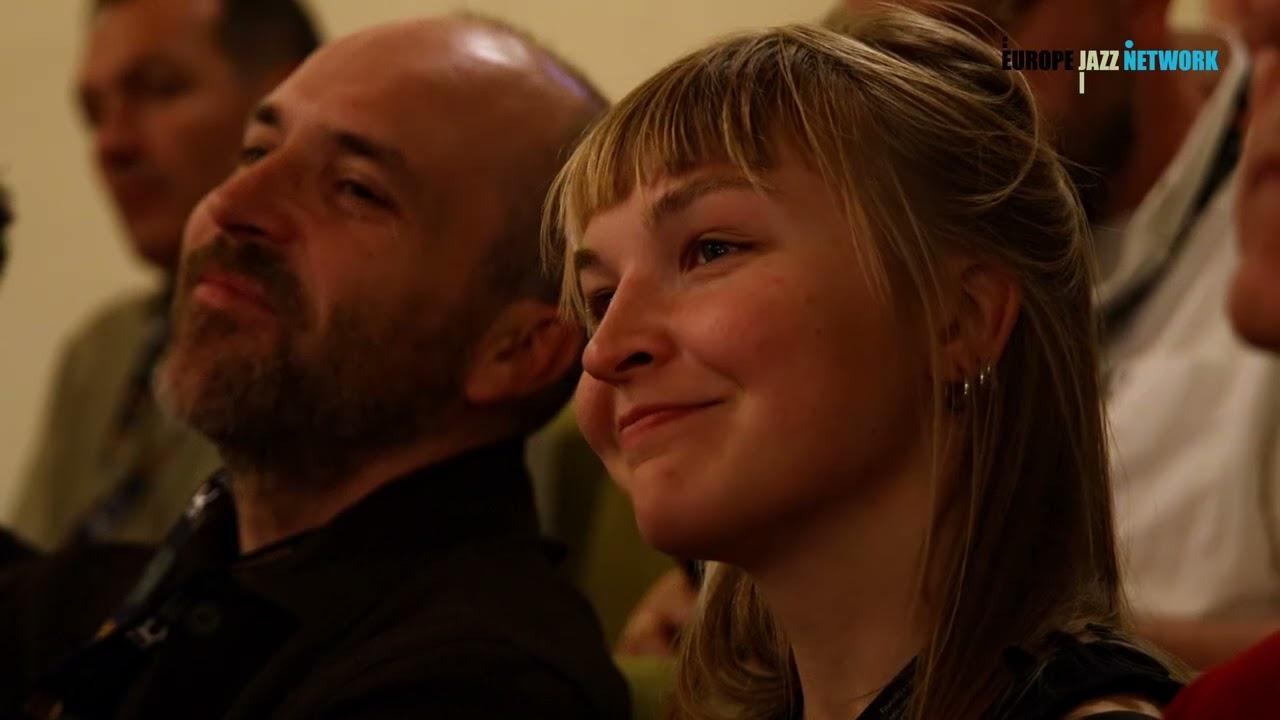
SELECTED
All About Jazz-Intl, by Ian Patterson “European Jazz Conference 2025 - Italian Showcases” LINK
Jazz Journal-UK, by Pascal Dobran: “European Jazz Conference; Bari, Italy” - LINK
Giornale della Musica-IT, by Luca Vitali: “European Jazz Conference, a casa in Puglia” - LINK
Citizen Jazz-FR, by Anne Yven: “European Jazz Conference - L’auberge italienne” - LINK
Jazz Forum-PL 10/11 2025, by Martyna van Nieuwland: “European Jazz Conference, Bari 2025”
RAI Radio 3-IT, by Valerio Corzani & others: Live nation-wide broadcast of the whole Saturday evening / Fringe programme from Piazza del Ferrarese - LINK (teaser)
Blogfolk-IT, by Valerio Corzani “Corzani Airlines: Esmeralda Sella - LINK
POLITIKA-SR, 4/10/2025 (Sunday cultural insert), by Zorica Kojić: “In Bari without Borders”
Jazzitalia-IT: “European Jazz Conference 2025: Bari capitale del jazz internazionale con tre giorni di concerti gratuiti” - LINK
LSD Magazine-IT: "European Jazz Conference 2025: stasera la serata conclusiva con i Boom Collective, Nicola Conte e Artchipel Orchestra & Guests" - LINK
MEI-IT: A Bari L’European Jazz Conference - LINK
Antenna Sud- IT “26 Settembre 2025 - Bari, Jazz Europeo tra novità ed occasioni” - LINK
BCB radio-UK: “The Big Beat Show” of 12 October 2025 - LINK - ARCHIVE
Radio Luoghi Comuni-IT: “European Jazz Conference 2025 @ Bari - Podcast” - LINK
Programme committee 2025:
Karolina Juzwa (Wytwórnia Foundation, PL), Steve Mead (Manchester Jazz Festival, UK), Mark van Schaick (Buma Cultuur, NL), Alex Carr (Cheltenham Festivals, UK), Max von Pretz (Südtirol Jazzfestival Alto Adige, IT), Claudia Sergio & Maddalena Ciocca (Puglia Culture, IT)
The topics of the 2025 discussion groups were suggested by the EJN members through an open call, many thanks again to all those who replied with their suggestions!
Showcase selection committee 2025:
Ugo Sbisa' (journalist, IT), Sandra Costantini (Jazz Network/Crossroads, IT), Valerio Corzani (artist and journalist, IT)
Europe Jazz Network
Giambattista Tofoni, General Manager
Francesca Cerretani, Event & Office Manager
Stefano Zucchiatti, Communication & Content Manager
Puglia Culture
Paolo Ponzio, President
Marco Giannotta, Vice president
Board members
Viviana Peloso, Salvatore Maria Sangiorgi, Maddalena Tulanti
Audit Committee
Michele Antonucci (President)
Rita Attanasio, Emanuele Cozzoli
Sante Levante, Director
Claudia Sergio, Manager responsible for regional projects
Cesare Veronico, Puglia Sounds Artistic Coordinator
Artistic Direction Fringe festival
Roberto Ottaviano, Alessandra Costantino, Cesare Veronico
Ella Gaeta, Organisation and general Production Manager
Rino Binetti, Organization and production
Maddalena Ciocca, Regional Projects Technical Assistance Office – International Development
Cristina Fina, International relations and partnership
Paola Troia, Regional Project Communication Manager
Luciano Rutigliano, Press office
Marika Marangella, Social Media Manager
Tommaso Armenise, Graphics
Nicola Quacquarelli, Support for communication activities and web
Ferdinando Cocco, Registrations, Logistics & Accommodation
Antonio Tuzza, Cultural Tours, Travels & Dining
Administration and accounting
Francesco Fiore, Maria Fornarelli, Marta Francioso, Marilena Laera, Sante Livrano, Elvira Nardone, Ciro Rutigliano, Pino Santoro
Secretariat
Fabrizio Visconti, Rosangela Coroneo
Gabriella Morisco, Project secretary

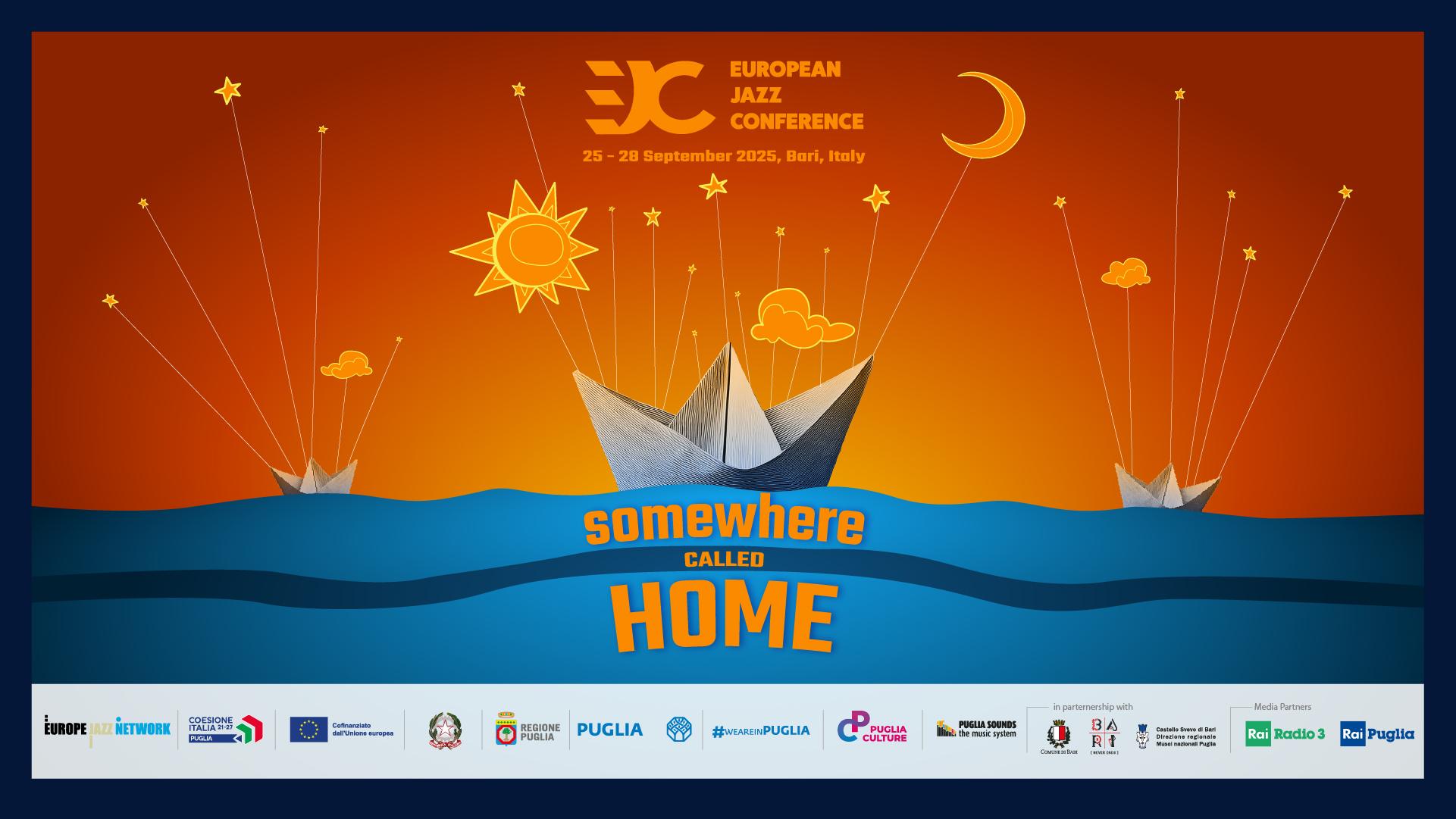
This publication reflects the views only of the authors, and the European Commission cannot be held responsible for any use which may be made of the information contained therein